Journal of Art & Literature
A
EVERY READER EXISTS TO ENSURE FOR A CERTAIN BOOK A MODEST IMMORTALITY.
READING IS, IN THIS SENSE, A RITUAL OF REBIRTH.
Alberto Manguel
This year marks the 20th publication of The Colton Review. It is impossible to make it to a major anniversary without reflecting on everything that has brought us here. Each year, our staff builds on the foundation laid by our predecessors, and our hope is to continue growing and evolving alongside the Meredith College community. Just as we received this publication from those who came before us, so too will we pass it on to those who come after.
Within these pages, you will find creative treatments of a vast array of topics, from identity and selfreflection to friendship and human connections. Yet, among the many kinds of stories that have been shared with us this year, almost all our contributors have explored the ways in which our lives fall apart—whether it be through the end of a relationship or through literal physical decay—and the ways we piece them back together. This collection embraces decay as a natural progression of life that allows us to grow and reinvent who we are as human beings. These pieces explore grief and loss, but they also explore where we have been and where we are going.
We would like to thank everyone who has shared their work with us, not only this year but every year since our publication’s inception. We would like to thank our literary staff, our art team, our faculty advisors, and our judges. We’d also like to thank the members of staff who were here before us, and all the incredible people who will keep The Colton Review going after we’re gone. Your dedication has made our journal something truly special. But most of all, we would like to thank you, our readers. We could not have made it this far without your support, and we can’t wait to spend another twenty years curating the creative endeavors of the Meredith community.
We hope you enjoy reading this year’s edition as much as we have enjoyed making it.
Thank you.
Sincerely, The Colton Review Staff
A Journal of Art & Literature
The Colton Review is Meredith College’s art and literary journal. It is an annual publication that features literature and art from students, faculty, staff, and alumnae. It is produced for and by the students of Meredith College. The contents are copyrighted by The Colton Review 2024. All rights reserved to the individual writers and artists upon publication. Contents may not be reproduced without the written permission of the writer or the artist. A special thank you to Jane Williamson Teague for her generous donation and support of The Colton Review.

LOVELY PASTICHE SNIPPET
Debra Lee Laube Hand Embroidery
First Place
Lovely Pastiche Snippet Debra Lee Laube, First Place
Vessels Mae VanFleet, Honorable Mention
Natural Connection Kathryn Francis
Landscape Debra Lee Laube
Man–Made Natural Patterns Series Emily Hodges
Go Smell the Roses Kelsey Smith
Renaissance Man Ainsley Rounds face.png N'shiyua Tatum
The Tea Party Valentina Carbotti
Orbit Noelle Pearce
Untitled Avery Williams
Toad on Stone Charlotte Thomas
Still Life Ellen Schwartz
Denying Access Perla Gerez Hernandez
The Truth About Dinosaurs Claire Miller
Imperilment Sara-Rose Spann
Self-Love/Self-Acceptance Madison Russell
Surrender to Perseverance Arianne Gonzalez
Industrial Foliage Naomi Adkins
The Balcony Kara Browning Into the Woods Josefina Puello
Haunted
Visual Diary Series V Karlie Mullis 02 07 08 17 19 29 30 39 45 48 50 58 59 62 65 73 75 81 83 85 92 94 99 105 107
Nostalgia Emma Relota Flowers Leen Abazid, Best in Show The
House Maya Ryba
A Curator’s Fingertips Solveig Lee Yes, I’m a Vampire Working at Walmart, Will that be Cash or Credit? Rowan Elwood, Honorable Mention
Memories Competing on
Laura Wood Lost and Found Box
Rehbein
Warm Margaret Devitt Watermelon Slice Duah Abdrahman, First Place in Poetry Song of Summer Lauren Shaw, Honorable Mention The Dead Horse Sierra Clark
a Family Farm
Michaela
The Yellow Note Lilly Koonce Living Proof Constance Wesley Figueroa Homecoming Tamara Bomparte, Second Place in Prose
Paradox of Immortality Leslie Kramer 06 09 10 12 18 20 22 31 32 40 42 44 46 49 51 60
The Outlier Alaire Donofrio Moss Rowan Elwood Labyrinth of Fear for a Dreamer Selena Weaver The Very Pulse of the Machine Lauren Bartos
The Lonely Frog Kara Browning Pancakes Karlie Mullis The Ghost Camille Duncan Mirror Kailey Wurr Reading for Claudius Constance Wesley Figueroa Places, Everyone Katie Avants the shoulders of women Kat Whetstone, Second Place in Poetry "Respect was Murdered" After Victoria Chang Anonymous Gluttonous Jordan Johnson My Mireille Rowan Elwood Darling, You Fooled Me. Cady Stanley My Mother’s Lover Speaks to me from Hell Anonymous Downpour Clary Taylor S34.109A* Clary Taylor, First Place in Prose Rot (and Rebirth) Lucia Celetti Arcadia Jordan Johnson peace Kat Whetstone 63 64 66 72 74 76 80 82 84 86 95 96 98 100 102 104 106
WARM
Margaret
Devitt
TO BE WARM IS TO SUFFOCATE ALONE. TO BE WARM SI OT ETACOFFUS .ENOLA OT EB MRAW SI OT FFUS OCATE ALONE. TO BE WARM IS TO SUFFOCATE ALONE . TO B E MRAW OTSI ETACOFFUS .ENOLA OT EB MRAW SI OT COFFUS BE WARM IS TO SUFFOCATE ALONE. TO BE WARM IS TO S ETACOFFU
On darkened roads, warm summer nights where the wind kisses our skin with gentle loving, exists a world we own and carve ourselves from broken glass and the scent of wood pine.
Fingers entwined, future between our palms, our hearts sit as one. Two parts, one at home for her whole life and one who has found it buried in pages and charcoal sketches.
To know another is to feel love’s dull pressure in each sleepless night. Charred coffee wrapped by winter-chilled fingers, as both our minds ask the sky why stars are not alone.
For the first time, it seems neither are we.
But in the mind begins the sabotage. The fall from grace damns us both. Heaven’s rain, as angel’s tears, tries to cleanse this house of sin. There are things even God forgives not.
Fate’s cruel plan to rip and tear, to without warning shatter our rose-glass bubble world, slices through the heat. Frozen memories like ghosts dead set on haunting this small town.
Remnants of the past sting as reminders. Cabin walls rotten with time, moth-eaten sweaters, coffee soured, bedding icy as the white-blind blanket smothers the woods.
To be warm is to suffocate alone.
B COLTON REVIEW 6
.ENOLA OT

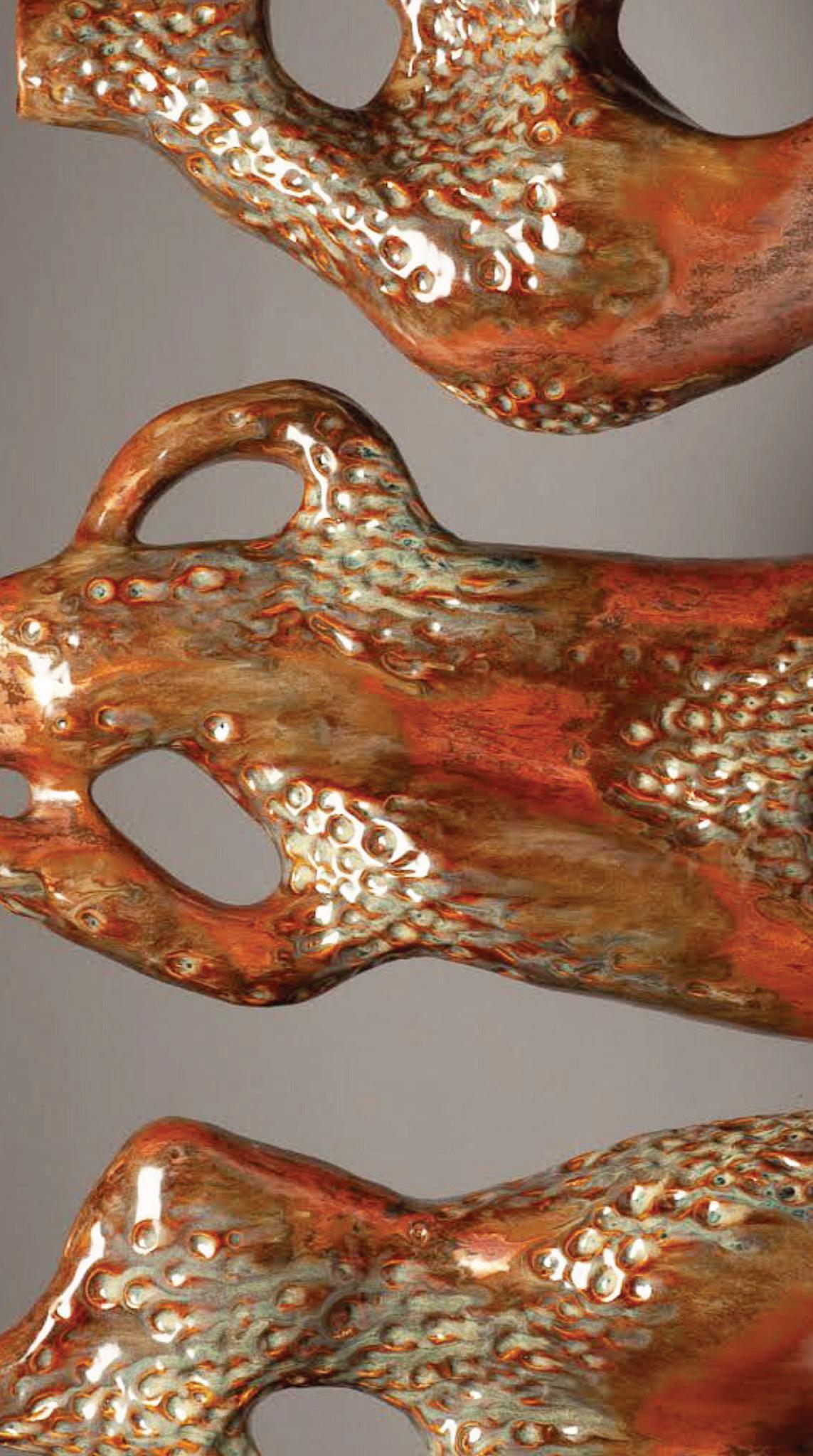
COLTON REVIEW 7
Honorable Mention VESSELS Mae VanFleet Ceramic
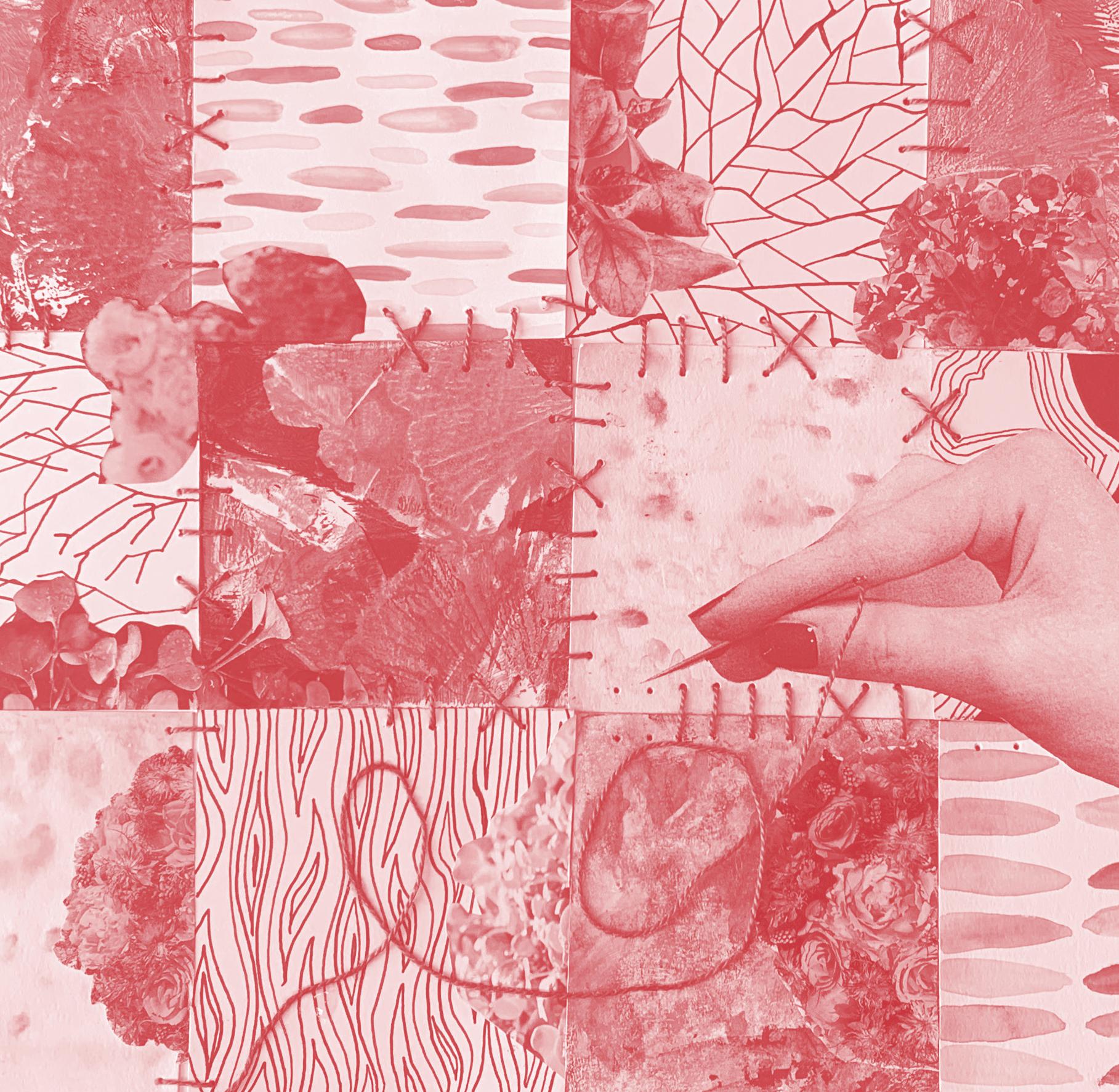
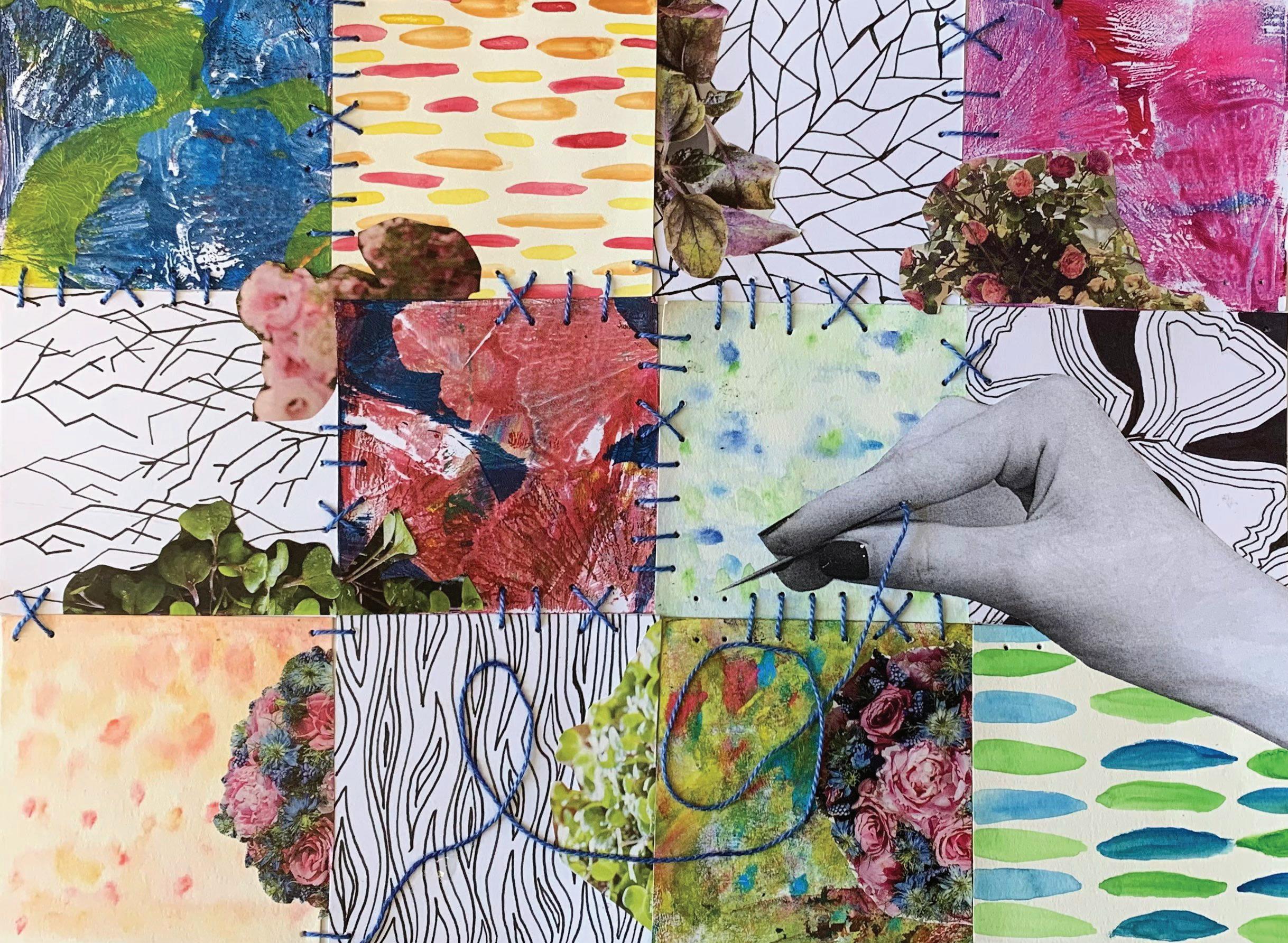 NATURAL CONNECTION
NATURAL CONNECTION
COLTON REVIEW 8
Kathryn Francis Collage & Mixed Media
First Place in Poetry
WATERMELON SLICE
Duah Abdrahman
You never know what kind of watermelon you’re going to get.
Sometimes the bitterness shocks your tongue as your mouth still waters for it.
Sometimes, the sweetness is just what you expected on a hot summer day…or night. You can knock to see what’s inside but you will never know until you cut it open, until you cut through every sugar mark.
Sugar marks identical to my stretch marks.
How patient are you for my watermelon slice?
Will you cradle me before knowing what’s inside?
Before knowing what you’re going to get?
Will you love me with my seeds?
The black ones that fill the creases of my void?
Will you love me enough to break through my hard shell?
Will you stay with me patiently to watch my vibrancy triple from one color to three?
Will your mouth still water for me before I’m ripe?
Will you at least knock?
COLTON REVIEW 9
Honorable Mention
SONG OF SUMMER
Lauren Shaw
The room is hot.
Skin suffocating against cotton stripped down to the bottom sheet. A sheen of sweat coats my neck, circles the crown of my head, a head that is not home but instead out reliving our day.
Remembering how we scrambled to get up, as soon as the sun kissed the clouds, hair still a mess, dancing around each other in the kitchen, and raced down the wooden stairs to jump on bikes, their chains rusted from salt air, creaking under us. We sped through dirt streets and muddy ditches and neighbors’ greetings to reach the dunes.
Tangles of green brush, tangles of hair, the ground dotted with a blaze of red flowers. Firewheel, we call them.
Gaillardia pulchella, say those with less imagination. Bikes shriek to a halt, grinding gears to a standstill, and we run the
Through dunes.
Chasing after each other we fall, laughing in the sand— sand in hair, sand on skin, sand in mouth. Giving each other grainy smiles, we don’t care, we will meet waves and wet our teeth with salt.
Feet racing over burning ground to reach cool relief, a baptism of summer in the holy font of foam. The sea is a clear coke-bottle green, like the old-fashioned kind from before we could run through the sand and had to be carried. Sometimes I miss that feeling, of being carried, as the waves carry me now.
Floating up one and down another, bobbing in the warm current.
COLTON REVIEW 10
The sand clings to wet skin as we climb out of the water, collapse together, and watch the sky turn from blue to gold to indigo. The wind withers from warm to cool.
I lean into your heartbeat, my own pulse jumping, crackling like the bonfire before us.
Sparks fly up, dancing against the dark rolling night, floating higher and higher, drifting home to meet the stars. We drift home too.
Your eyes are heavy, and I wish I could carry you in my bicycle basket, a gentle ride home under the shining, pin-pricked sky.
Now I feel your breath on my neck, soft and warm, my peace against the cotton.
Inhale, exhale.
How can respiration sound like a symphony?
Lovely as breeze brushing sand off crested dunes, as fingertips brushing against skin.
Your breathing out is my breathing in.
A steady rhythm.
It joins the chorus of cicadas humming outside the window, chattering away, ch-ch-ch-ch-chattering in their way, wings rubbing together fervently, like flint to spark a campfire flame.
Creating, in the quiet dark, the song of summer.
Creating, in the quiet dark, the song of summer . ,gnitaerC ehtni teiuq ,krad eht gnos fo .remmus
Creating, in the quiet dark, the song of summer . Cre at i ,gn ni eht teiuq ,krad eht gnos fo .remmus ,gnitaerC ni eiuqeht t d ark , the song of summer.
Creating, in the quiet dark, the s o gn fo .remmus ,gnitaerC ni eht teiuq ,krad
COLTON REVIEW 11
THE DEAD HORSE
Sierra Clark
Randy approached the three-sided shelter in the pasture. He could see the kind creature all laid out on its side. It was once a beautiful, muscular animal, with a healthy chestnut coat and a dark black mane and tail. Its coat had still been lovingly brushed despite there being chunks of hair missing. Its mane had still been lovingly braided, despite there not being much left to braid. Where there had once been fat and muscle, there was now just skin and bones. Unfortunately, it still looked heavy to move.
It had always been a quiet horse, but it was especially quiet now. It no longer shifted its weight between its hooves or breathed gently and quietly. Randy had always liked this horse and was sad to see it lying lifeless on the ground.
Ya ready to do this thing?”
The unexpected question violently pulled Randy from his thoughts. Edith had quietly come up behind him without making a noise, which was impressive considering her size. Edith was not a small woman but was all muscle. She had rough, callused hands and a deep tan from working outside all her life.
The two began circling the large horse, trying to determine the best way to move it. Randy liked Edith, and he liked talking to her. He didn’t like to talk to many people and usually preferred to keep to himself. People were confusing, and they often tried
to trick you so they could get what they wanted. But Edith wasn’t like that. She was honest but loving. Like a second mama that everyone needed. She even came to all his baseball games where her roars of approval filled the entire field. Edith had been the person everyone in town called when they needed help for as long as he could remember.
“That eye’s creepy as hell, ain’t it?”
Randy looked to the horse’s pale blue eye he knew Edith was referring to. “I find it pretty. It’s unique.”
“Nah, it’s creepy. It’s unnatural. And a blind eye makes a horse useless.”
“Callie McGee seemed to like him, even with the blind eye.”
Edith paused to think. “Yous may be right on that one. This horse did a lotta good for that little girl, what after losing her mama and all. No siree, I don’t envy being in Mr. McGee’s position at all, having to tell his little girl that her favorite horse ain’t living no mo’.”
Randy nodded in agreement. “So what’re we thinking here, Edith? Have any ideas on how we’re gonna move this beast? I brought my fourwheeler and trailer to move him. We just gotta get him into the trailer.” He paused, thinking, and then agreed with himself. “Yeah, that’s gonna be the hard part.”
” COLTON REVIEW 12
“Well, I brought some rope and a sling we can use. Maybe string it up on over the side of the shelter?"
Randy shrugged. “Okay, let’s give it a shot.”
Edith bent down to pick up the rope and sling she’d unceremoniously dropped on the ground. “Let’s start by working this here sling on under him.”
Edith took one corner of the sling and bent down at the rear of the horse. Randy grabbed the opposite side of the sling and bent down opposite of Edith, near the horse’s belly. The two managed to wedge the sling’s fabric under the horse and then began wiggling it, trying to move it further under the lifeless creature. It may have been skin and bones, but that horse was still damn heavy.
“Ok, ok, hold on, son.” Edith paused and looked to Randy over the horse’s body. “I’ll pull it to me and then let it go slack, and then you pull it. Like a two-man saw.”
Randy nodded and the two ducked their heads back down to continue wedging the sling under the horse. They quickly got into a rhythm where one would pull and then the other, but it was slow going.
They’d managed to get the sling under the horse’s flank when Edith looked over the horse again at Randy.
“I saw your mama at the store the other day, and she says yous is thinking about applying for colleges?”
Randy kept his gaze focused on the sling. He was starting to breathe hard and work up a sweat. “Yep.”
“You ain’t gonna stay and work here?”
“Nope.”
“Why not?”
Randy could hear Edith breathing hard now, too. He shrugged and then realized she couldn’t see it. “I wanna go do something else. It’s a big world, and I’ve only seen from Wayne County to Buckland County. That’s not much.”
Edith didn’t respond. Instead, she suggested they take a break. They’d reached the horse’s chest at this point, so the hardest part was behind them.
Randy could feel his heart racing. He hadn’t expected it to be so hard to get this horse on the sling.
Edith sat back on her heels, panting. “What’s the ‘something else’ you is gonna do in the big wide world?”
Randy twisted his mouth and stared out across the pasture. “I don’t know yet. But you know it’s a changing world, Edith. And I want to do something more with my life than just shoveling hay and horse crap.”
“You ain’t gonna take over your daddy’s farm?”
Randy turned to look at Edith. Her eyes crinkled at the corners as she squinted to see across the pasture through the glare of the setting sun.
“You know as well as I do that the farm isn’t gonna make it,” Randy said quietly. “I’ve seen the bills. I’ve heard my parents’ hushed arguments about beef prices. They think I don’t know, but I do.”
COLTON REVIEW 13
“You may be right. Times are a-changing. We used to not have to worry if we got hit by bad prices one year ‘cause we knew we’d make it up the next year. But you can’t count on that no more. You can’t count on nothing no more.”
The two sat in silence for a few minutes, gazing at the string of trees sheltering a small creek that wove around the pastures. Randy remembered playing in that creek when he was little. But now no one was allowed in it because of the contamination. Chemical run-off, they called it. Not even the animals were allowed near it. It had to be fenced off. It hadn’t been a problem until the oil refinery had opened down the road. Randy turned to the dead horse behind him. Even with a blind eye, this horse should have lived longer than he did. But he’d been eating poisoned grass. More chemicals, more contamination, more death.
“Whelp.” Edith slapped the tops of her knees. “We’d better be getting back to it.”
Both turned back to the dead horse and continued to work to slide the sling underneath its body.
“Ya know, Randy,” Edith grunted as she pulled the sling, “I think you could do a lotta good in this world. And—urg—if it takes a college to let you do that, then go to college.”
The end of the sling finally appeared on the other side of the horse.
“Oh, my lord Jesus! We finally got him on the sling.” Edith pushed herself back onto her heels and wiped her brow.
Randy pulled up the collar of his T-shirt to wipe the sweat from his face. “Thanks, Edith.”
“Yeah, yeah, whatever. Stop your yapping and throw this here rope up on over that beam of the shelter there while I catch my breath.” But Edith smiled as she tossed the rope to Randy.
Randy looked around for something he could tie to the end of the rope to give it some more weight and make it easier to toss over the beam. He found a stone just outside the fence and tied an end of the rope around it. It wasn’t a difficult task for him to toss the stone over the beam. Edith untied the rope from the stone and began to loop it through the eyelets on each of the four corners of the sling. “Yous think you could getta scholarship with that pitching arm of yours?”
Randy shrugged. “Maybe. I hadn’t really thought about it.”
“Well I betcha all kinds of schools’ll want you if they seen you play.”
“Maybe.”
Edith snorted. “‘Maybe.’ Humph! Don’t be so modest, boy. You got talent, smarts, and skill. Put yaself out there, and colleges will come a running to ya. Now grab hold onto the rope.”
Randy wrapped the rope around his right hand to get a better grip and got in a stance to pull. Edith got behind him.
“Boy! Unwrap your hand! You know it’ll burn you if it slips!”
COLTON REVIEW 14
Randy noticed Edith had also wrapped the rope around one of her hands, but he pretended not to notice and did as he was told.
“Ready?”
Randy nodded and drove his back foot into the ground.
“Heave!”
The horse didn’t budge.
“Heave!”
It may have moved slightly that time, if you squinted your eyes.
“Hold on, boy. Switch places with me so when we get this thing in the air you can tie the rope to the post.”
“What if I tied the rope to the back of my four-wheeler and then pulled it, and you could tie the rope?”
“See? That’s why you need to go to college! You’re smart! Me?” She rapped on her head with her knuckles. “All I got in here is cigarette smoke and jokes that’ll send me to hell.”
“Jokes that’ll send you to hell?”
“Nah, now don’t be trying that, boy. I’m not taking you down there with me. That’s why I keep ‘em to myself. Now go get your four-wheela’ so we can finish this.”
Randy grinned and did as he was told.
He unhooked the trailer, tied the rope to the back of the four-wheeler, and lined up with the horse and the sling. He wasn’t sure how much power it’d take to get the horse in the air. He wasn’t even sure he’d be able to get it up.
He gave it a little bit of gas and looked behind to see if anything had happened. Nothing. He edged it up a bit. Still nothing.
Edith shouted over the noise of the four-wheeler, “Oh for heaven’s sake boy! Just floor it!”
As he always did, Randy followed Edith’s directions without hesitation. He felt the four-wheeler lurch forward and looked back to see the sling and horse finally rising.
“That’ll do it, Randy! Keep it there!”
Randy turned to see the sling hanging about a foot above where the bed of his trailer would be. Edith was tying the rope to a post of the shelter. Somehow this woman had managed to pull on the rope enough to create slack and tie a knot.
“Okay, boy! Let’s get the trailer under here, let him down, and go home.” She bent forward and put her hands on her knees. “Whew! I’m getting too old for this!”
“Too old?! Why Edith, you can’t be over 30!”
Edith grinned. “Now we both know that there’s a lie. But you a flirt! Those college girls better watch out!”
Randy laughed as he finished hooking the trailer back up to the fourwheeler. He expertly backed the trailer to under where the dead horse was hanging in its sling.
“Ok, Edith. You can go ahead and untie it now.”
Edith put one foot up against the wall of the shelter to brace herself, grabbed the loose end of the rope, and yanked.
COLTON REVIEW 15
I st
I ts
m a n e h a d s t i l l b e ne l ivo n lg y bdediar , erehtetipsed ton gnieb hcum l e f t to braid. Its mane hadstill been lovingly b r a i dde , etipsed ereht ton gnieb hcum tfel
m a n e h a d s t i l l b e en l ovi n gl y braided , despitethere not being much l e f t ot .diarb stI enam llitsdah neeb gnivolyl b r a i ded , despite there not being much left t I t s m a n e h a d s t i l l b e e n l o v i n g l y b r a i d e d , d e s pi t e t h e r e n o t b e i n g m u c h l e f t t o b r a i d . I t s m a n e h a d s t i l l b e e n l o v i n g l y b r a i d e d , d e s p i t e
The horse fell into the trailer with a sickening thud.
Randy made a face, remembering that the weight that had just been dropped into his trailer was the body of Callie McGee’s beloved horse. The horse had always been one of the sweetest creatures, and now he was dead and had been unceremoniously dumped into a trailer.
“Whatcha making that face for? He can’t feel nothing! He’s dead!”
“Yeah, I know. It’s just—” He paused. “Callie’s gonna miss him.”
“Well that’s life. Things end. But then new things begin. You can’t have the new stuff without getting rid of the old.”
“I guess you’re right.”
“Whaddya mean ‘you guess’ I’m right? Honey, I’m always right!” Edith’s booming laugh filled the pasture. “Now get that thing on over to the incinerator and then get home and call them people from the colleges.”
Randy grinned. “Night, Edith.”
“Night, Randy.”
Randy drove out of the pasture with the horse in tow. As he turned onto the road towards the incinerator, he could feel the weight of the dead horse being pulled behind him. Not so much weight that it made it difficult to drive.
And it wasn’t so close to him that it smothered him. But the dead horse was there all the same.
e r e
COLTON REVIEW 16
t h
n

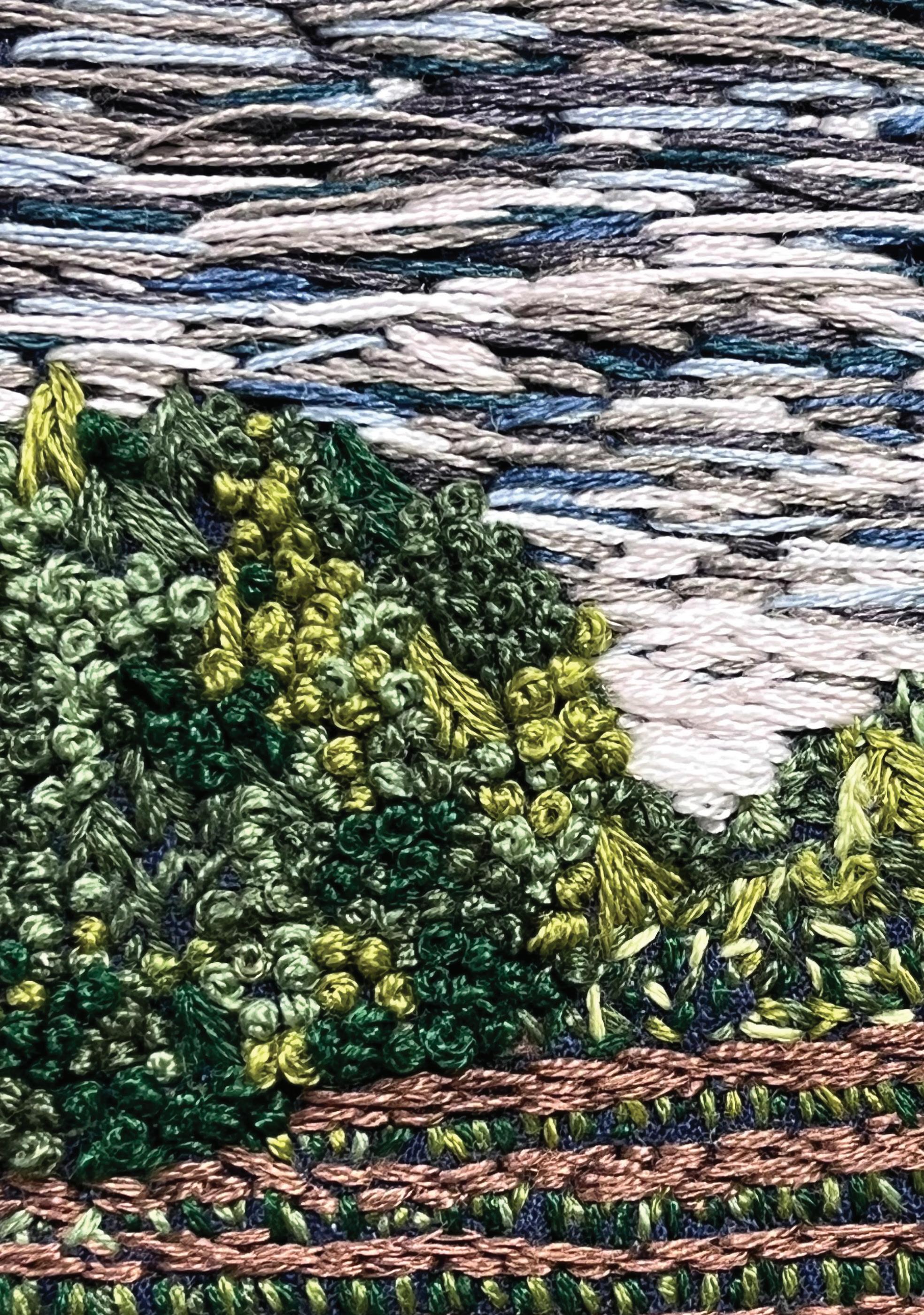
COLTON REVIEW 17
LANDSCAPE Debra Lee Laube Hand Embroidery
MEMORIES COMPETING ON A FAMILY FARM
Laura Wood
The marble board outside the washhouse where fish are laid to dress, the slender knife blushes rosy with use, black snakes curl through the high grass behind the wash house, stone angels turn their backs in its sanded windows, wind rattles the grate on the barrel where trash is burned and fire breathes on the twilight sky, frost turns peaches to stones, drought turns green rows to anthills, muscadines perfume the air and die like drops of heavy rain, the quail pen was loud, now the quail pen is empty the netting was unbreakable, now snakes break through the pen shots break out over the old pond, yet the dam is empty on one path, my father walks through the woods a child, with a fur hat, wielding a bb gun on the other, I walk beside him and the senile French Brittany limps laps around the house again and again and again
COLTON REVIEW 18


MAN–MADE View the rest of the series on www.coltonreview.com
COLTON REVIEW 19
NATURAL PATTERNS Emily Hodges
Photography
LOST AND FOUND BOX
Michaela Rehbein
Grief is a lost and found box
A child loses their toy they find sadness
A child finds their toy they lose sadness
That’s the hope that’s the expectation
But what happens when the box is empty?
It’s true that I’ve lost you
But it’s also true that somehow somehow
I still end up finding you
At the source of everything everything
My eyes the way they tilt to one side
My nose the way it holds two overly-rounded caves
My chin the way it points right out to the north
My voice the way I don’t recognize it
My thoughts the way they knock down doors
My anger the way it boils over quickly, unexpectedly
How is it that you’re gone physically
But you’re not really gone mentally
Sometimes I feel like I’m gone mentally
But I’m not really gone physically
It’s funny how that works, isn’t it
At least it’s funny to me not to my therapist though
They said I would find happiness again yet sadness is my bedroom door
COLTON REVIEW 20
I would find hope again yet doubt is a permanent marker
I would find healing again yet brokenness is a childhood toy
I would find my whole heart again well then where the fuck do I find even half of these things I haven’t found what I’ve lost yet everything
You’re the source of it all
You’re the center of it all somehow
I told myself that I would stop thinking about you
I would stop holding onto your finger
I would stop giving power to your voice
I would stop making art about your impact you, you, you, why is it always fucking you
But what I’ve lost is still what I’ve found somehow
Psychology says that we need hardship in our lives
We need to know troubles before we know blessings
We need to feel pain in order to feel joy sounds like a bullshit theory to me
You’re the source of it all
You’re the center of it all everything
I can’t feel on top of the world all the time but i never asked to feel like i was under it
It’s true that I didn’t find myself by losing you you
But it’s also true that instead instead
I seem to be finding you while I’m losing myself myself, all of myself
Lost and found boxes are disappointing sometimes aren’t they?
I guess so… …anyways
COLTON REVIEW 21
THE YELLOW NOTE
Lilly Koonce
TW: Suggestions of abuse, arson, and murder
For years, my mother warned me not to go near the yellow house at the end of the road. All the other parents in my neighborhood told their kids the same thing. When I asked her why, she told me just to do as she said. And, so, I did stay away for a while.
It wasn’t like the house was pleasant to look at. It stuck out jarringly in contrast to the neighboring houses’ neatly trimmed yards and polished gray exteriors. My daddy always complained about the poor state of their yard whenever we drove past it on our way to church. The grass was dead and patchy, and water damage had crept up the walls. He said it made our neighborhood look raggedy.
Daddy took pride in the upkeep of our yard. Most days, he’d wake up before the sun to water our lawn and the lush flower beds filled with daisies and lilacs. He always kept the grass neatly trimmed, and during the colder seasons he’d blow away the maple trees’ dead leaves and let me jump in the piles. My mother ran a tight ship and instilled in me the importance of caring for our home. I knew they loved me even though she could be too harsh sometimes and he would get drunk too often. Even though we didn’t have much, I never lacked anything, which was why it was my job to keep myself out of trouble—because I was a reflection of them.
One summer, while I biked past the house on my way to Kelso’s Corner Store with Claudia, she said her mother told her that the man who lived there was a murderer who’d
killed two little girls in the early 60s. The police couldn’t find conclusive evidence linking him to the crime, so he walked away free. That should have stopped me from ever going near the house again, but I was a kid, and what kid ever listens?
In the summer of 1972, when I had just turned twelve, I met the boy who lived there. Nixon had recently declared the U.S.’s plan to reduce the number of troops in South Vietnam. Daddy was too old to be drafted, and I was too young, so the war didn’t matter much to me in Little Ridge, North Carolina, where the old outnumbered the young. Most kids who attended Franklin Middle School knew each other, so the boy’s sudden appearance was odd.
I was riding home from school, and he was walking alongside the curb, kicking an empty bottle across the pavement. His shoulders tensed as I approached from behind, and he met my gawking with a glare. It was quite an impressive glare from a kid barely older than me. I cringed so hard that I almost fell off my bike. I managed to brake, but he’d vanished by the time I looked over my shoulder.
I glanced around dumbly before I spotted his willowy silhouette running down the street toward the yellow house at the end of the road.
That night, while my mother cooked dinner in our tiny kitchen that smelled of homemade biscuits, I sat at the counter and asked whether the
***
COLTON REVIEW 22
man who lived in the yellow house had any children.
Something important to know about my mother is that she’s been serious her whole life. When my grandma was still alive, she would tell me that my mother didn’t cry when she was born. Instead, she scrunched her face in a deep frown that never went away, and that’s why the lines in her soft brown skin are now deeper than the cracks in the pavement. My father always said that her severe black eyes ‘could melt the meat off your bones if you crossed her.’ And I’d definitely crossed her right then with that question.
“I thought I told you to stay away from that house.” She pointed the cleaver at me with narrowed eyes, a silent warning not to lie.
“I didn’t go near it, but I saw a boy go inside.” I objected to the accusation before she could begin her angry tirade, but my daddy came home at the worst possible moment. We both flinched at the sound of the screen door slamming shut. She pointed at him with the cleaver next when he entered our kitchen.
“Your son is going near that raggedyass house again after I already told him to keep away from there,” she huffed, placing a hand on her hip. Daddy’s tired eyes locked onto me as he pulled off his construction vest and put it on the hook by the door. I hugged my knees and lowered my eyes to the floorboards. The thing about parents who were as old as mine was that they didn’t care much about what you had to say.
“Do what your mama tells you to do,” he said, leaning down to kiss her cheek before he went to the sink to wash his hands.
My mother scoffed at his puny rebuke before she turned her gaze back on me.
“I better not hear about you going near that house again,” she said, returning to cutting the string beans into small pieces.
“Yes, ma’am,” I muttered. It wasn’t like I wanted to go looking for trouble or anything, but something stirred inside me at the idea of seeing him again. Every warning that my mother gave me about that house and the man who lived there twisted and knotted inside my mind. I worked through each one until I figured I didn’t need to go near the yellow house. I just needed to see the boy again. The image of his lone silhouette filled my mind, and I held him there for a moment. She never needs to know.
And so, my parents didn’t learn the truth until it was too late.
The next time I saw him wasn’t until the beginning of summer, as I biked to the community pool with Claudia.
“That’s that kid who always smells,” she said, pushing her cheap glasses with heart-shaped rims to the top of her strawberry-blonde head. I recognized the lithe silhouette immediately as he walked alongside the curb with two plastic bags of empty bottles. His sandy bangs had grown shaggy, and they fell in sweaty strands over his eyes. The summer sun practically radiated off him, and I wanted to tell Claudia that nobody would smell nice after walking around in 100-degree heat, but I didn’t want her to break up with me again.
***
COLTON REVIEW 23
“You know him?” I asked.
“He’s going into 8th grade with my sister, and she says that his shoes have holes in the soles.” She scrunched her nose as we sped past him. I glanced over my shoulder, but he’d turned into a black speck in the distance again. He was an enigma, and I was drawn to his mystery like a moth to a flame.
***
The few times we’d crossed paths, he was always collecting bottles, so I spent the next morning collecting discarded bottles from the train tracks, wrapping them in newspaper, and storing them inside the wire basket on my bike. Later that afternoon, I arrived at the same spot and found him walking alongside the curbside again. As I approached from behind, the bottles shuddered noisily, and the boy’s shoulder blades tensed. His shirt collar was dark with sweat, and his threadbare shorts were unraveled at the hems.
“Hi.” My voice came out scratchy, and he kept walking without acknowledging my presence. I maneuvered in front of him and put down my kickstand to block his path.
“I said hi,” I repeated, that time louder and more powerful, and the boy lifted his chin to peer at me through his bangs.
“Is this a joke?” he asked in a surprisingly normal-sounding voice. I half expected him to growl at me. I blinked at him dumbly, and he sucked his teeth and began to step around me.
“Wait—No.” I stepped in front of him again, blocking him with my body.
The boy pushed his bangs aside and gave me that chilling glare again. I inhaled sharply and squeezed my bike’s handlebars.
“Come to Kelso’s with me…Please.” I don’t know what made me ask him such a thing, but he froze, and some of the hostility in his expression softened a fraction. His eyes lowered to the bottles in my basket, and his hand tightened around the bag straps digging into his wrists.
“I can help you carry some of those. There’s room in my basket,” I offered, and the boy sucked his teeth again before switching the bag he held in his right hand to his left. It was apparent that doing so hurt his left arm, but he masked his pain and stuck his hand toward me. I noticed chewed fingernails that would have made my mother faint before I firmly grasped his hand and met his gaze.
“My uncle says a man should shake your hand and look you in your eye when introducing himself. My name is Joseph Carrigon,” he said. I didn’t allow my eyes to wander to his shoes, which I didn’t discover until much later, had holes. Instead, I grinned at him, which began my summer with Joseph Carrigon.
“Why do you always want to collect bottles?” I asked as we walked along the train tracks that split Little Ridge into the east and west sides. Joseph squatted down and assessed a busted bottle on the other side of the tracks. It was our third week of walking around Little Ridge collecting empty bottles and selling them at Kelso’s corner store.
“I’m saving,” he said.
***
COLTON REVIEW 24
“For what?” I asked as I stretched out the knot in my lower back. Joseph tossed the cracked bottle he held, and it shattered loudly against the iron rail.
“Something big,” he replied vaguely, walking further down the tracks. I dug in my pocket, extracted some of the penny candy we had bought earlier that day, and tossed a Mary Jane in my mouth. The sweet tang of chocolate and peanut butter mingled and melted on my tongue.
Joseph never bought any candy with the money. He saved it in a foot tub, he said. He wouldn’t let me see where he hid his stash, and he said he couldn’t keep it at home or his uncle would use it to get drunk. Daddy did that sometimes, and when he came home bumbling drunk, my mother would yell at him, but what did drunks care about yelling? I wondered how Daddy would have felt if he knew that he and the man who lived in the raggedy yellow house had something in common.
The blaring sound of an approaching train caught our attention, and Joseph crossed over the roadbed, bumping my shoulder with his.
“Let’s race the train,” he challenged.
“Why? It’s not like we can win.”
“So?” He wore a half smile as he glanced over his shoulder at the speck in the distance that would soon be upon us. The railcars’ energy sizzled in the air, and their wheels’ vibrations rumbled through the ground and up my shins. I set my bike on its side so the bottles wouldn’t fall out and sprinted ahead without warning.
“Hey!” Joseph shouted from behind me.
The train sounded like it was ripping a path across the earth. I moved my legs as fast as they would go when a familiar silhouette sped past me. I hadn’t noticed how fast Joseph was when we first met, but I saw it then. With every stride, he lengthened the gap between us. The train’s draft enveloped me as the railroad cars passed, and Joseph’s legs moved faster.
“Keep running!” I shouted, but I doubted he could hear me over the train’s horn. Joseph spread his arms with balled fists like he’d just scored the winning goal. The first railroad car sped past him and flashed out of sight. Joseph stumbled to a halt but kept his hands stretched to the sky as if basking in victory. He ran back to me and let out a bellow that I felt deep in my chest, and I stared at him like he was crazy.
“What are you doing?” I asked in a hushed shout. He examined me, his pupils dilated wide, and we glanced back at the train that was once again a speck in the distance.
“We have to scream to be heard,” he declared as he leaned back and screamed at the orange sherbet sky. I glanced around, completely bewildered, before I tipped my head back and joined in. We screamed like mad men until our throats were raw, and my head throbbed.
Joseph smelled like the burning heat of the sun, and he looked like freedom as I knew it. His dark eyes filled with a vitality they typically lacked as he smiled at me. I stared at him dumbstruck. Joseph Carrigon had a smile that could light the night sky.
*** COLTON REVIEW 25
I pushed my bike alongside me as Joseph and I walked up the street that led to our neighborhood. My mother made it clear I had to be home before the streetlights came on, and the sun had already begun to set before we left Kelso’s. I used my tongue to switch the strawberry-flavored candy from one side of my mouth to the other. Joseph had eaten some of my Mary Janes, which made his breath smell like peanut butter. We’d collected twenty bottles and split them, so I got five, and Joseph got fifteen. Each bottle was about 5 cents, so in the end, I got 25 cents, and he got 75 cents. Joseph had wanted to split it even, but he was saving for something big. I was twelve and didn’t care much about saving money. I just knew when my mother talked about saving money, it was for something important. When Daddy’s car broke down, he had to walk six miles to work. We had to put every penny into savings so we could fix it. Joseph didn’t have a car, and he didn’t even have a bike. I was determined to help him.
“Will you tell me when you’re done saving?” I asked and rolled the strawberry candy around my mouth. Joseph froze.
His shoulders tensed like they did when I snuck up on him. I followed his dark eyes to the yellow house at the end of the road. I hadn’t realized we’d walked so far. The streetlights blinked in and out, and a knot of anxiety twisted in my stomach over what my mother would say.
“Josey boy? Is that you?!” A gruff voice came from the end of the driveway.
Joseph stuffed his hand into the pocket carrying his coins and stared at the burly silhouette that had to be his uncle.
“Who’s that with you? You two come on over here.” He ushered us close. Joseph walked stiffly by my side and glanced at me with a silent warning. I was scared. I was so scared that my entire body vibrated.
“Now, would you look at that? Why haven’t you introduced me to your friend, Josey boy?” Joseph’s uncle cooed in a way that wasn’t very inviting, just like his raggedy house. A stiff breeze could have knocked me over then, but Joseph placed a firm hand on my shoulder that steadied me.
“Uncle Jeb, meet my friend. He lives right down the street. His parents are the O’Reillys,”
“Oh…the O’Reillys. Your daddy is the one who won’t even bother with an introduction after all these years?”
He tilted his head like a curious dog. “What? Y’all hear that nonsense they say about me. You scared?” He egged on. I’d been taught all my life to speak when spoken to, but I was frozen stiff. Nothing he said fully registered in my brain.
“Like father, like son, I see.” Uncle Jeb’s thin lips pulled into a sneer as he extracted a cigarette from the breast pocket of his ratty button-up. His beady eyes burrowed into mine and the hairs on the back of my neck rose. My heartbeat thundered, and bile climbed up my throat as I lowered my gaze to the pavement.
“I’m sorry,” I muttered to Joseph before I took off on my bike down the street and pedaled faster than I ever had in my life.
COLTON REVIEW 26
I didn’t see Joseph for two weeks after that. I’d ride my bike past his house and wait for hours at our spot near the train tracks. Claudia had broken up with me because I hung out with him more than her, even though I’d invited her along to join us. I spent those weeks alone, worrying myself sick with images of what his Uncle Jeb could have done to him.
I was about ready to confess to my mother so she could go to the police when I biked up the street after a day of swimming at the community pool, and Joseph was sitting on the curb, his head dipped low on his shoulders and his elbows resting on his knees.
“Hey.” I tried not to sound excited, but I couldn’t help the smile that spread across my face at the sight of him. Joseph wasn’t injured or hurt from what I could see, but he seemed heavier somehow. Maybe it was because I’d never seen him sitting down before, but I knew something was wrong, and he would never tell me what. So, I rubbed the back of my neck where my skin was burned from the sun.
“Hey,” he said and pushed his bangs from his eyes to get a better look at me.
“You need a haircut,” I said. Joseph’s eyes widened, and he turned away. He almost looked embarrassed.
“I don’t own scissors,” he muttered.
“Don’t worry, my mom is better than most barbers,” I told him. And that’s how we ended up in my kitchen while my mother cut his bangs. I swept the hair off the floorboards and tied it together to make a rat tail while I waited for them to finish.
“There, now I can see your handsome face,” my mother said with a gentle smile, and Joseph’s entire body turned beet red. I stifled a laugh while he hid his face in his hands, and my mother laughed at us.
“Thank you, ma’am,” he muttered.
“No need to thank me. Just make sure you take care of yourself. I’m drawing you a bath too. I won’t have any child leaving my house looking unkempt.” She grabbed his hands and assessed the dirt underneath his fingernails. Joseph shot me a pleading look, but I shrugged helplessly. I couldn’t even save myself from my mother.
Joseph took more than an hour to clean himself. I was worried he’d drowned when he finally pulled open the door and emerged wearing some of my old clothes. He was narrow and wiry, so the shirt practically swallowed him. I realized that some of the brownness of his skin wasn’t a tan but a layer of dirt. He looked like a proper kid with his new haircut instead of a vagabond.
“Your bathtub is huge,” he said and grinned at me.
I grinned back. “Stay for dinner?”
He nodded.
We sat in my bedroom while my mother prepared dinner, and Joseph sat on the very end of my bed. His back was straight as a ruler, and his knees bounced. His eyes darted to the rows of books and superhero figurines on my bookshelves and the posters of the Temptations, Elvis Presley, and Marvin Gaye on the walls. The only sound was the slow thrum of my ceiling fan.
COLTON REVIEW 27
“Your bedroom is huge too,” he observed. The strain in his voice made me chuckle until I realized something was off. Joseph was usually closed off and defensive about most things, but he’d never been skittish with me. I was certain he was about to sprint out of my room.
“What is it?” I asked from my desk, covered with the disheveled sheets of my untouched summer homework. Joseph wet his lips and rubbed his hands on his knobby knees before he muttered something I couldn’t hear.
“What?”
“Some kids don’t get haircuts,” he said louder, and I frowned.
“Joseph?”
He looked at me. His expression had darkened, and my heart pounded as my question sat on the tip of my tongue.
“Is it true what they say about your uncle? Did he do those things?”
His dark eyebrows knitted together, and he kept his eyes glued to my shoes.
“Joseph?” I repeated.
“Don’t ask me that again,” he snapped. I flinched at the harshness of his tone, which was so out of character that I simply nodded. He lifted his eyes to meet mine, and his expression softened slightly.
“My family isn’t like yours,” was all he said. I didn’t understand what he meant then. If I had, maybe things wouldn’t have ended like they did.
Read the rest of "The Yellow Note" by Lilly Koonce at www.coltonreview.com
COLTON REVIEW 28
GO SMELL THE ROSES
Embroidery on Silk
Kelsey Smith
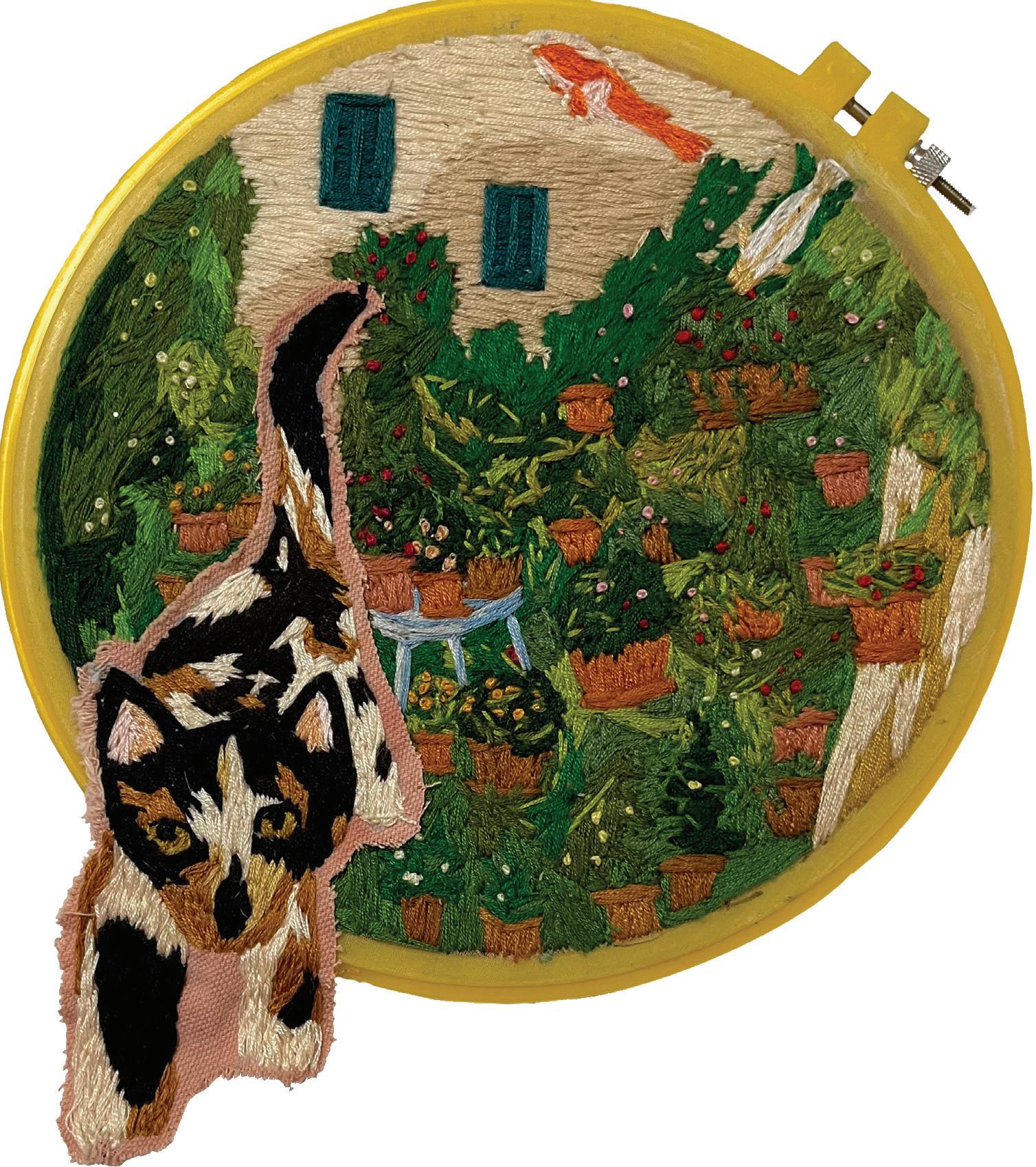

COLTON REVIEW 29
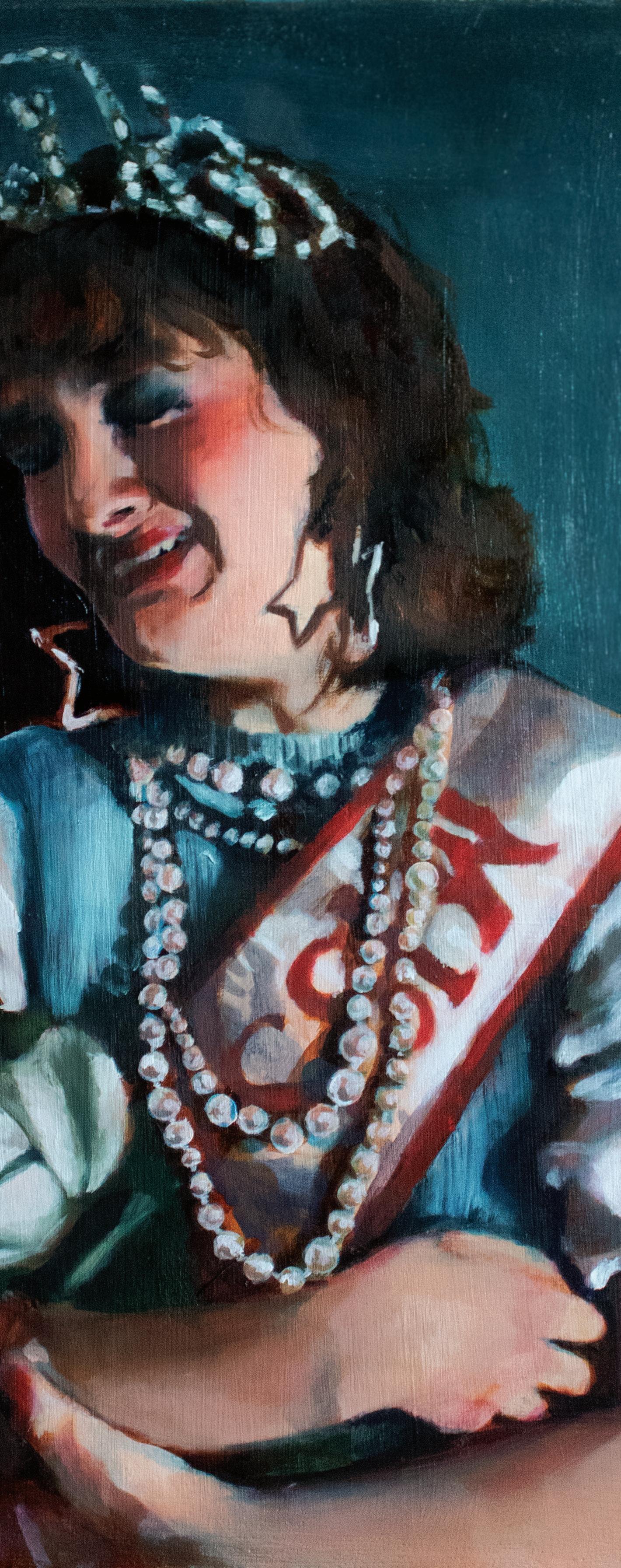
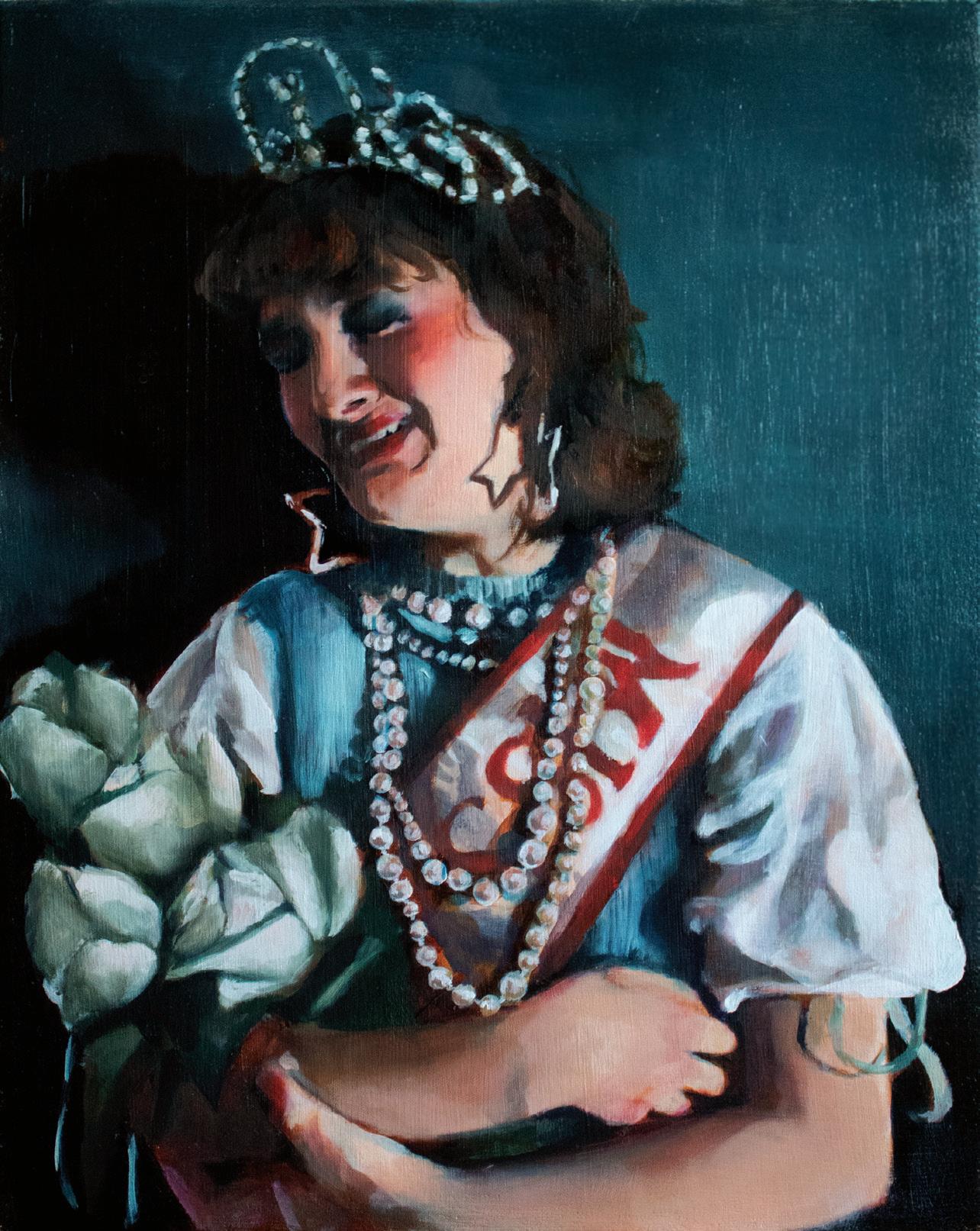
COLTON REVIEW 30
RENAISSANCE MAN Ainsley Rounds Oil
LIVING PROOF
Constance Wesley Figueroa
She says I don’t exist.
I am, for a moment, confused
Because I’m pretty sure I do—
Pretty sure—
I was existing last time I checked.
Sorry, I’m not quite sure I heard you correctly,
I say as she looks at me.
(Looking at me would be difficult if I didn’t exist)
As it happens, I did.
It’s her belief, she insists,
She’s certain that I don’t exist.
My heart protests loudly against my ribs
To remind me that I am, In fact, Existing.
Even though she says I’m not.
There are words I should probably say To defend my state of being But they have all fled.
Maybe they’re worried that if they linger too long They too will cease to exist.
In their absence
I have become a figment of my own imagination.
(Am I a figment of her imagination too?)
Then they find me again,
Those fickle words, Emerging from the thick silence, Scrambling for purchase on my tongue, Ready to scream to the world that I am as real as they are, That she has no right to declare me otherwise, But I need no defense.
I am real.
So, I offer her a smile that is not, And, in bidding her good day, Carry on, existing.
COLTON REVIEW 31
HOMECOMING
Tamara Bomparte
The house looks the same at first, but as I pull farther up the driveway, I realize how much has truly changed. The cream siding is still discolored near the base, where the rain splashes up mud and debris. The blue hydrangeas bloom in full force, just like they always do at this time of year. But the trio of trees that I used to sit under for hours, making up stories in my head, has been cut down. The shutters that used to be a comforting shade of sage green have been painted black, and the trampoline that hasn’t been jumped on since we were in grade school must have been carted away sometime in the two years since I’ve been back. Instead of my dad’s silver Acura sitting in the driveway, a white Honda Civic is parked next to the front door. My older sister leans against it, arms crossed and brows furrowed as she peers into my windshield. I’m late.
“Really, Meg? You couldn’t be on time just once? I’ve been waiting almost an hour.” Liza throws her hands up in frustration, but I can’t bring myself to feel bad about the extra twenty minutes I spent in bed this morning. Or the ten minutes I sat in my car before turning the keys in the ignition. Or the fifteen-minute gas station run that easily could have been five.
“Sorry,” I say, but she can clearly tell that I’m not. “You didn’t have to wait for me, though. You could’ve gone in.” I’d been hoping that she would. My big sister, the overachiever, the go-getter. I guess it was too much to expect her to start organizing the house on her own.
“No way. This is too much work to do by myself. And besides, Dad would have wanted us to do this together.”
I’m silent at that. Honestly, I don’t think Dad would’ve cared, but I guess she always knew him better than I did. I try to tell myself to move, to just walk up the brick steps and through the front door. It’s no big deal, just my childhood home and all its lingering memories waiting for me to comb through and rediscover them. But that lie didn’t work when I was trying to persuade myself to come this morning, and it’s even less effective with the house looming in front of me. The windows peer down with judging eyes and the welcome mat mocks my instinct to shy away.
“Well, are you ready now?” The keys glint from where they hang between her fingers. Liza looks at me expectantly, but her eyes soften when she notes my hesitation. She’ll never truly understand why this is so hard for me. I’m sure her stomach isn’t rolling, and she can probably breathe just fine, but still, she surprises me with her effort to help me through it.
“Come on,” she says with a tentative smile, holding out her hand for me. “Let’s go in together.”
I grasp her hand in mine. I’m not expecting it to bring me much comfort, but it really does. My feet unfreeze from the cement beside my car, and my legs move, one in front of the other, until I’m standing inches from the front door with Liza turning the key beside me.
in Prose COLTON REVIEW 32
Second Place
It sticks a little, just like it always did, and then, there we are, inside the very place I’ve been avoiding since I graduated college.
I barely notice how Liza immediately forges ahead, going room to room, turning on the lights. I’m too caught up observing this house that should be so familiar but feels so foreign. The blinds are open, and the light that filters through catches on dust motes in the air. The navy upholstery on the couch is faded with use, and there aren’t nearly as many pictures of Liza hanging on the walls as there used to be. But most of all, I’m shocked to see the piano is missing.
The empty space draws my gaze like a moth to a flame. The wooden floorboards are slightly discolored in the space beyond where the piano used to sit, where sun damage and Liza’s constant tread have faded the stain and worn down the varnish. I always imagined a colony of dust bunnies breeding behind the instrument, but someone must have cleaned the area. Nowhere else though. Dust and grime still cling to the baseboards just outside of that five-foot range.
“Liza!” I call out, unsure why this change feels so jarring. She hurries back to where she left me in the doorway, clearly expecting some major revelation on my part. “Your piano. What happened to it?”
“Oh, that,” Liza says, waving a hand in the air, brushing off my concern. “We got rid of that ages ago. I have a better one at my new place, and Dad always wanted to hear the recordings instead.”
“Huh,” I say, staring at the spot where the piano used to sit. So many hours of Chopin and Tchaikovsky while I was trying to do homework,
watch a movie, or talk on the phone with a friend. So many times when my dad told me to go back upstairs, to not bother Liza while she was practicing. So many canceled plans to attend recitals I had come to hate. And now the offending instrument is gone, just like that.
“You okay?”
“Yeah, fine,” I say, nodding my head to rid myself of the memories. But I’m itching to get back to my one-bedroom apartment that isn’t riddled with insecurity and haunted by neglect. My cozy home where I’m free to create on my own terms, where my fingers float over computer keys like a feather and grip onto pens like they’re bringing me to life. Shaking out my hands and pushing my shoulders back, I decide that the sooner we get this over with, the sooner I can leave. “Now, walk me through what we need to do.”
“Okay,” Liza says, eyebrows raised at my new determination. “Well, we mostly have to go through and collect anything we might want to keep for ourselves. I’ve been talking with Aunt Kris, and she’s agreed to take care of everything to sell the house. We can leave most of the furniture and appliances in case any buyers want them. I’m content with what I have at my new place—especially since Daniel moved in after our wedding—and I remember you being pretty settled in your apartment, so I figured you wouldn’t want much from here. She mentioned there are a lot of boxes left in the attic, pictures and things like that, so we might want to go through them before she starts throwing things away. Unless, of course, you wanted to…” Liza trails off, as if giving me the opportunity to make a claim for this place.
eh pmeyt ps a c e d r a w s m y gaze lik e a moth t o a flame . Th e empt y s pace draws m y gaze l i k e a m o t h ot a fl.ema ehT ytpme ecaps sward ym geza l i k e a moth COLTON REVIEW 33
“Oh, no, definitely not.”
The thought is almost laughable. This house might have been the background of my childhood, but I have no desire to bring it with me into my future.
“I took everything I wanted from my bedroom when I moved out for college, so I’m good to go straight to the attic if that’s alright with you.”
“You sure? You don’t even want to go in your room, for old time’s sake?”
“Nope. I’m fine,” I say with a thin smile. I push past her towards the stairs to the attic. On my way, I pass by the closed door of my childhood bedroom, and my chest tightens with a feeling I can’t quite name. I already know what’s in there. The classic pale blue and white color scheme on the walls and ruffled bedding that was popular when I was in high school. A tidy desk, a nightstand scattered with bookmarks, a color-coded dresser. And bookshelves empty of the novels I was too attached to to leave behind, now stacked with notebooks full of the stories I couldn’t keep inside my head. A waste of time and space, as my dad so lovingly called it.
I remember frantically scribbling in a cloud print notebook when I was eleven years old. A story about a group of friends trapped inside a cursed library had been stuck inside my head and wouldn’t leave my thoughts until I wrote it down. When I finished it, I was so proud, buzzing off the excitement of the tale I was able to create. I ran downstairs to share it with my dad and Liza, taking the steps two at a time, almost falling in my hurry. I skidded to a stop next to the piano, where Liza was practicing a new piece for her next recital. Dad stood with his arms crossed, reading the sheet music over her shoulder.
I asked if I could read them something I wrote, and, while my dad looked annoyed over the interruption, Liza looked grateful for the distraction.
I started reading, pausing now and then to see their reactions. Liza had looked at me intently, her eyes widening at the twists and turns in the story, her hands pulled away from the piano keys and folded neatly in her lap. But Dad’s eyes were glazed over as he looked straight ahead of him at the ground. His fingers were tapping out a melody, his mind still on the music. My heart sank. That was the first time I shared one of my stories with him, but it was far from the last time he would disappoint me with his indifference.
But nevermind that. If there are only a few boxes between me and my ability to leave this house behind, then I’m going to go through the boxes.
When Liza opens the attic door, I realize our task might take a little longer than expected. The attic is lit by sunlight streaming in through two dormer windows, and the forgotten space smells of must and mothballs. It’s fairly organized, and no bigger than the smallest bedroom, but short stacks of dust-covered boxes line three of the four walls. My heart sinks as the hope of this being the job of one afternoon floats away.
“Well,” Liza says, deftly twisting her hair into a tight bun, her taskoriented mindset shining through. “Let’s get to work.”
~ COLTON REVIEW 34
I’m not sure how many hours have passed, but I’ve gone through two boxes, mostly full of old tax documents that need to be shredded, and Liza, ever the overachiever, has gone through three. While we were absorbed with our task, a light rain began and ended, creating a soothing soundtrack for the mindless chore, and the progression of the afternoon leaves the attic dimmer than it was when we started. Liza gets up to pull the light switch, and on her way back to her spot on the floor, she stops at one of the boxes.
“What is it?” I ask. My neck is tired from peering down at stacks of paper and I’ve gotten a papercut or two from flipping through so many pages. I’m impatient to be done, but the look of interest on Liza’s face promises that I won’t be getting out anytime soon.
“Look at this! All my boxes so far have been boring, but this one is labeled ‘My Girls.’ Sounds much more interesting, don’t you think?”
“Yeah, I guess.” My disinterest is audible, but Liza won’t take no for an answer.
“Come over here! It could be fun to go through this one together. I’m sure it’s all about us. Please, Meg?”
I guess it does have the potential to be more interesting than taxes and medical bills. Pushing aside the box in front of me and sneezing at the dust it kicks up, I scoot over to where Liza sits, rushing to unfold the cardboard flaps of the “My Girls” box. I can tell she’s excited to see what’s inside. It makes sense that she would be. Dad always kept her recital programs, her old music, and professional pictures of her performances. I have no doubt that the majority of this box will be a shrine to Liza.
Sure enough, the top layer of photographs and memorabilia are all Liza and her piano. I push aside her sifting hands and find myself digging, desperately searching for something, anything related to me. And it’s not all Liza. There are a few pictures of our mother—dead before I formed any concrete memories of her—at her own piano, before it was Liza’s. She looks happy, sitting at the same instrument that used to occupy the front room downstairs. In one picture, Mom sits at the piano bench, holding a three-year-old Liza on one leg and my pudgy, six-month-old body on her other. Liza’s tiny fingers are reaching for the keys, and my head is tilted towards her arm, trying to get closer. We all looked happy then. I wouldn’t describe Liza’s face in her recital photos from middle and high school as particularly joyful, but the emotions are strong nonetheless. Determination, grit, satisfaction. She’d always crack her fingers twice before she left the comfort of Dad’s encouraging words, marched on stage, and played to perfection.
I wouldn’t know how I felt, at any stage, after any accomplishment, because there are no pictures of me to commemorate any occasion. I can’t see a single shred of evidence of my junior prom, my high school or college graduations, nothing.
The Liza in front of me now looks deep in thought, like maybe she finally notices the disparity in how our father treated us. After years of shoving it down and holding it in, I let my anger rise to the surface. A flood of indignation bubbles up and drowns out the voice that always told me I wasn’t worthy of the love that Liza was given but I fought for.
COLTON REVIEW 35
“You can see it now, can’t you?” My voice wavers with visceral pain. “Why I hated coming back here, why I’ve stayed away for so long? Everywhere I walked, I was stepping in your shadow. Dad devoted so much of his time, his energy, his affection to you, that there was never any left for me.”
“Meg, that’s—”
“No!” I snap, rising to my feet. Liza follows suit, a recital photo still clutched in her hand. “You could never understand because you were perfectly content to be in the spotlight. I bet you never once stopped to consider the kind of effect that had on me. Just because I wanted something different than what Dad expected didn’t make my dreams any less important.”
“I know, but Meg—”
“I mean, forget about Dad. He was always a lost cause when it came to my dreams. He called them silly and unrealistic and he never would have changed. But you? You were supposed to be my sister, to stick up for me and tell me that I could do anything I set my mind to. You never supported me, not even now when we have our own lives away from his influence. Did you know that in college, I won a juried contest for creative writing? Over five hundred entries, and I won first place. Or that I’ve been working on a novel, and I have an agent who thinks it could sell? No, of course you don’t, because every time we get on the phone, the conversation somehow revolves around you and the concerts you’re playing or what orchestra you might travel with next!”
“Stop it!” Liza shouts, her face growing red, her hands curled into fists at her sides. “Poor Meg, didn’t get enough attention.
Well, that’s not the worst thing in the world! Do you know how much pressure I was under? Can you just think, for one second, how hard it might have been for me, knowing what I was expected to achieve? I hardly slept in this house because if I wasn’t practicing, I was worrying about mastering my next piece, and even if I tried to close my eyes, I was dreaming about what it would be like to succeed or having nightmares about what it would feel like if I failed! You got to hide in your room and escape into your stories, while I was working day and night to hold onto his approval. In fact, you’re lucky that you never had to experience Dad’s scrutiny the way I did. You aren’t the only one who had a hard time here. So shut up!”
Her words echo in the hollow space, replaying in my ears over and over until a sudden silence takes its place. Liza slaps her hand over her mouth. We’re both shocked by her outburst. She was always the perfect daughter, calm and patient in the face of Dad’s erratic passion, determined to be the best and chase her dreams, no matter what. But she’s right. I always assumed she was fine with it, but I never considered how she was feeling or if the pressure was getting to her. Just as I open my mouth to apologize, she turns on her heel and runs down the steps.
Suddenly, I feel drained. I sit down on the attic floor, not minding the dust that will cling to my shorts by the time I stand back up. Rather than chase after her, I decide to give Liza a minute to calm down. I haven’t seen her this angry since we were kids, but I remember that she likes to be alone for a few minutes before resolving conflict.
COLTON REVIEW 36
As I sit, my gaze lands on the box of pictures that started this whole mess. Amidst the recital photos and the pictures of Mom, I catch a glimpse of blue that doesn’t fit in with the rest. I push aside the top layers and grab a picture that I’ve never seen before. Liza and I are on the beach, chasing each other in the sand. Our smiles are so wide, it hurts to look at them. We must be around ten and thirteen, old enough to remember the memory, though I can’t recall that day. When my mind revisits that time, it mostly dwells on the beginning of Dad’s changed behavior towards me, when he started to realize I’d never trade the pages of a book for ivory keys. In the picture, the joy is evident on our faces, and if anything, I wish I could remember that. That feeling of being carefree and weightless and unconditionally loved.
With the photo in hand, I brush the dust off my shorts and head downstairs in search of my sister. The closer I get to the living room, the more I worry that Liza might have just left. My ears strain to hear any movement, and I’m losing hope until I see that the front door is open, and through the screen I can see Liza sitting on the front steps.
Petrichor and the faint sweetness of the wildflowers scattered in the nearby grass flood my senses as I take a deep breath and sink onto the step next to her. Pinpoints of light zig and zag a few feet ahead of us, and the sounds of crickets, cicadas, and frogs fill the air. The purple sky casts a cozy glow over the night, so at odds with the turmoil between us.
“I’m sorry that I blew up at you back there,” Liza says, her voice uncharacteristically soft.
Her fingers pluck blades of grass from between the cracks in the concrete, shredding them to green confetti. “I didn’t think being back here would be so hard.”
“It’s okay,” I say out of habit, even though I agree that it’s not.
“No, it’s not,” Liza says, indignantly. “So much about this is not okay. It never was.”
“I know.”
A silence settles in the air between us, slightly uncomfortable but I’m not ready to leave it. Dusk makes its way across the sky, and as the street lamps cut on to replace the dying light, I’m reminded of the photograph clutched in my grasp.
“Look at this,” I say, holding out the picture of us. “Any outsider would see two loving sisters without a care in the world. I know our dreams are different, but we don’t have to disregard our relationship to chase them. We can cheer each other along as we follow our own paths.”
Liza traces our younger selves in the picture. A soft smile graces her face. It looks like hope. “Yeah. I’d like that.”
I let out a huge sigh. I wasn’t expecting her to say no, but it feels like so much has happened to get us to this point. So much stress, so much bitterness, and so many heavy burdens carried alone. I’m not sure how long it will take for us to relearn how to be sisters, or if we can ever rid ourselves of the need to prove our worth, but the lightness in my chest tells me there’s enough hope to try.
“Maybe you could…” My voice trails off in hesitation.
COLTON REVIEW 37
“Maybe, what?” Liza’s gentle hand on my shoulder spurs me on.
“Maybe you could come to one of my readings sometime? I share what I’m working on at an open mic event my local bookstore puts on.” I can’t quite look Liza in the eye when I make the request.
“Meg,” Liza says, waiting until I meet her gaze to continue. “I’d really, really, love that. Honestly, I always thought your stories were incredible. The moments you read them out loud were some of the only times that my mind could turn off.”
There’s a voice in my head saying she’ll probably forget and make plans with Daniel or lose track of time while practicing and never show up. But now the voice is a whisper instead of a scream, and it’s not much of a struggle to tell it to shut up. Liza’s eyes shine with sincerity, and suddenly, I’m smiling like I was at the beach all those years ago, and she is too.
“Well,” I say, giving a slight chuckle to mask the tears of relief that sting my eyes. “How about a walk through the neighborhood? I think I need a change of scenery.”
“What, reliving the ghosts of your past isn’t doing it for you?” Liza says, a wide grin defeating her mock seriousness.
“Oh my gosh, shut up.”
Laughing, I pull my sister up from the step and link her arm in mine. And we walk through the neighborhood, still ours though we’ve grown so far beyond it, picking wildflowers and kicking rocks until the fireflies beckon us home.
COLTON REVIEW 38
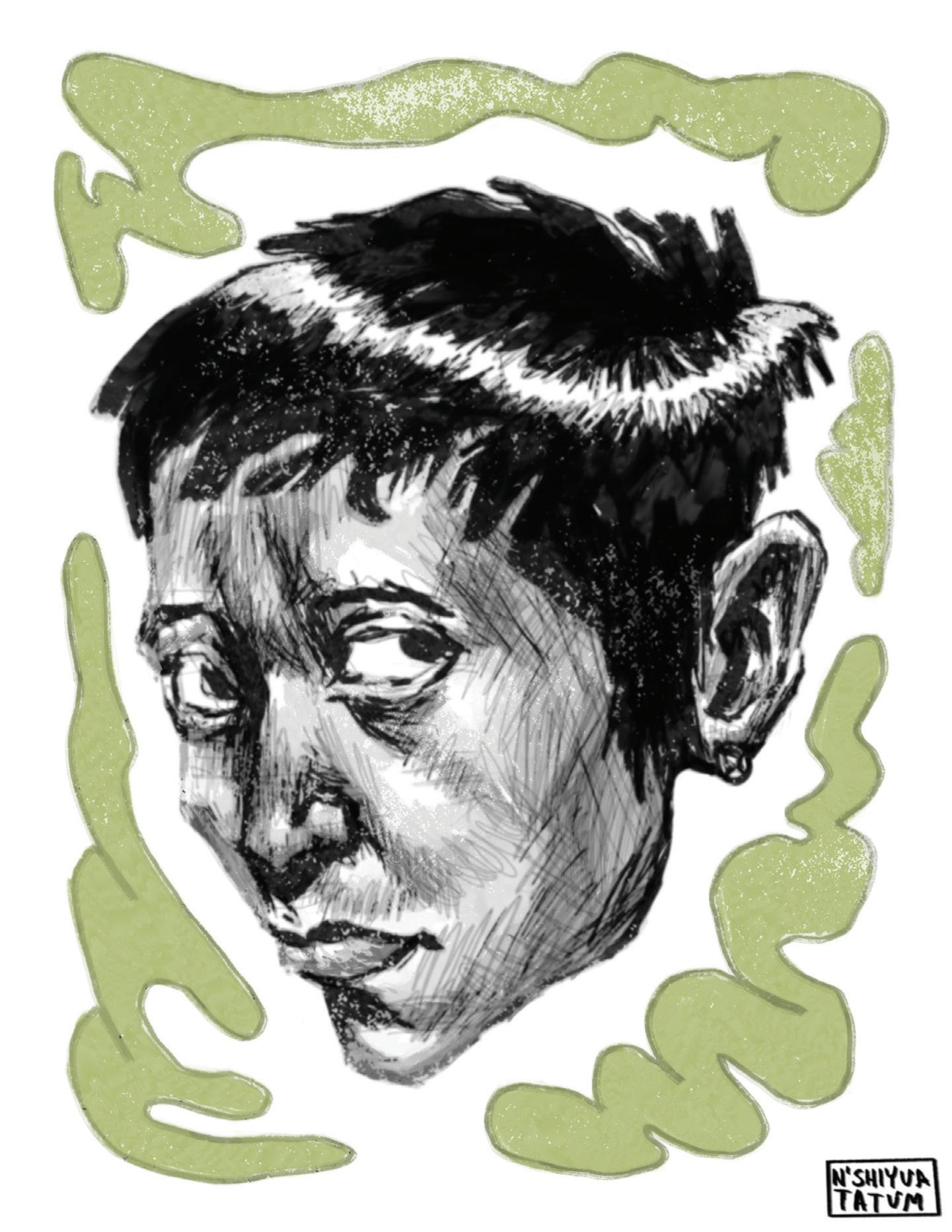
Digital COLTON REVIEW 39
FACE.PNG N’shiyua Tatum
A CURATOR’S FINGERTIPS
Solveig Lee
It’s never going to be perfect and that’s okay. It’s okay.
IT’S OKAY.
Please tell yourself that it’s okay,
I swear they will be fine.
You’re the worst curator in the world, you perfect it until it’s dust. You clean and clean and fix and fix until there’s only bits left.
What kind of curator are you if you see the imperfections in art?
If you itch to clean to fix to rip?
It’s not your right not your place to rip and tear and eat the artworks that hang from your fingertips. They are not for you to chew, to put in your mouth like a toddler.
Stop looking at the art.
You’re only clawing your eyes out seeing all the imperfections. Who makes you the judge?
Do you see the ridges? The edges of the canvas where the artist didn’t finish?
Do you see it?
Do you see?
Don’t sandpaper the edges.
Don’t crop or trim the art, the frames are part of what makes it whole. Who are you to mess with god’s creation?
Is there a god?
Is he in my nails?
You’re scrambling and scratching at the walls in your art gallery. The walls are chipping paint chips.
Paint on paint on walls and yet not enough paintings to cover these walls. The floors are covered in these paint chips that you keep on scrambling and scratching to peel away and see inside the paint the drywall the wood.
What is inside?
Is it a heart? A cleaver? A mouth?
Something to finally rip and tear and eat these accursed paintings on the walls in your curated art gallery.
COLTON REVIEW 40
SOMETHING TO FINALLY RIP AND TEAR AND EAT THESE ACCURSED PAINTINGS ON THE WALLS IN YOUR CURATED ART GALLERY. SOMETHING TO FINALLY RIP AND TEAR AND EAT THESE ACCURSED PAINTINGS ON THE WALLS IN YOUR CURATED ART GALLERY. SOMETHING TO FINALLY RIP AND TEAR AND EAT THESE ACCURSED PAINTINGS ON THE WALLS IN YOUR CURATED ART GALLERY. SOMETHING TO FINALLY RIP AND TEAR AND EAT THESE ACCURSED PAINTINGS ON THE WALLS IN YOUR CURATED ART GALLERY. SOMETHING TO FINALLY RIP AND TEAR AND EAT THESE ACCURSED PAINTINGS ON THE WALLS IN YOUR CURATED ART GALLERY. SOMETHING TO FINALLY RIP AND TEAR AND EAT THESE ACCURSED PAINTINGS ON THE WALLS IN YOUR CURATED ART GALLERY. SOMETHING TO FINALLY RIP AND TEAR AND EAT THESE ACCURSED PAINTINGS ON THE WALLS IN YOUR CURATED ART GALLERY. SOMETHING TO FINALLY RIP AND TEAR AND EAT THESE ACCURSED PAINTINGS ON THE WALLS IN YOUR CURATED ART GALLERY.
COLTON REVIEW 41
YES, I’M A VAMPIRE WORKING AT WALMART, WILL THAT BE CASH OR CREDIT?
Rowan Elwood
“God dammit Kevin, this is the third time this week.”
I sighed and pinched the bridge of my nose. Kevin was a disaster from the day we hired him, but we were already so short-staffed I had been reluctant to let him go. Kevin’s latest escapade? Sneaking steaks out of the cooler and sucking all the blood out of them. And then leaving them to rot in the middle of the bread aisle, stuffed behind the hamburger buns.
“Am I really going to have to fire you?”
Kevin’s first week on the job had consisted of getting him used to the idea of working retail. He was the newest recruit joining this program I started after I got promoted to a managerial position here at Walmart. The idea was to get new vampires used to polite society. Generational wealth was rare, so the rest of us often had to slum it in minimum-wage jobs unless we were willing to deal with the inconvenience of using lessthan-ethical means to amass some wealth. And most humans aren’t built to handle the night shift, anyways, so it was really a no-brainer: hire vampires to do it.
Kevin had been turned a few months ago. Long enough to curb his instinct to bite any neck he saw but still with some rough corners to knock off. I took him under my wing as a show of faith; even for a newblood, he was wild. He’d managed to handle the interview, but had been a menace to the entire store the second we put him on the sales floor.
I figured giving him easy jobs to start would be a good idea, but instead of sweeping the floors like he was supposed to, Kevin had gone through the home goods section, knocked every vaguely Christianrelated knickknack onto the floor, and swept them all into the bin. I had to explain to him that while I understood his distress at seeing them, the customers did in fact want to buy those and he’d just have to find a way to be okay with leaving them on the shelf. He promised to do better, as long as he didn’t have to look at ‘those things’ anymore.
I really had a lot of hope when I started the program. The day I got to hire the first vampire here (other than myself, of course), I was nothing short of thrilled. It was just so nice to have someone like me on the night shift, instead of the human workers who were all either sleepdeprived asses or pumped so full of caffeine I expected them to have a heart attack at any moment. I was so proud when they put my picture up on the wall that afternoon, with the little caption underneath: VampireLed Associates Division, headed by Ginger. I believed I could really make a difference.
Kevin’s first week continued to be a disaster. After his stunt with the broom, he got transferred to the deli, the intent being to get him as far away from the knickknacks as possible until he was ready to handle that kind of thing.
COLTON REVIEW 42
Honorable Mention
The department head, Kristen, got him all fitted out with the extrathick gloves and mask we provided all the undead associates to prevent any accidental garlic intake. I started to suspect Kevin had an infatuation with trash cans, because he lasted all of a day before getting dumped into my office for putting every garlic-adjacent product he could in an empty one.
Kristen’s exact words were, “I don’t care what you do with him, Ginger, but if I catch him in my deli again, I’m throwing him in the dumpster.”
That was the first time I considered firing Kevin. Less than a week and he hadn’t made any improvement. I had to do something. Kevin was putting my whole program at risk.
“Kevin, you can’t keep doing this,” I pled, leaning on my desk. “I want to help you, I really do. I know it’s hard, it is for all of us at first, but if you can’t get your shit together I’m going to have to fire you.”
“I’m trying, Ginger,” he whined. He looked like a kicked puppy.
“I know you are, but you can do better, you know that.” I sighed and sat back. “Take the rest of the night off, Kevin. We’ll talk about this tomorrow, and maybe we can figure out something that’ll work better for you.”
That was three months ago. I had Kevin stock clothes for a while (I think he liked the repetitive nature of folding and stacking things) and once he was used to being around people, I tried moving him to some more customer-focused positions, where we really needed the help.
He ran self-checkout and eventually graduated to running his own register. I was so proud of him. Other than a few scattered incidents of hissing at customers and pouting whenever he had to deal with certain purchases, he was becoming a dependable member of the team.
That was, until I’d started finding the steaks.
“But Ginger,” Kevin insisted, “I paid for them, so it’s fine, right?”
“Not when you leave them on the sales floor!” I snapped back. “Kevin, I’ve given you so many chances. HQ is gonna have my head if this keeps up. We could have the Health Department called in, and, worse comes to worse, they’ll dissolve VLAD and we’ll all be out of a job here.”
“But Ginger—”
“I’m writing you up, Kevin,” I said with finality. “This is your last chance. Don’t make me regret this.”
“I won’t.”
I knew he would. I just couldn’t handle the kicked-puppy look he had.
I just hoped whatever he did next, I’d be able to sweep it under the rug until I could hire somebody new.
We really were understaffed.
COLTON REVIEW 43
THE OUTLIER Alaire Donofrio
I thought I was alone
An outlier thrown
Blown in by the winds of fate.
My world was small
Though I knew it all
That love was more rare than hate.
A sorry case, A guilty face,
A hopeless child in the stands
Who’s well aware
Of fate’s stern glare
And suffocating hands.
She looks around
At love abound
With pessimism in her eyes.
Lovers play with fire, Walk on a wire,
While fate’s will still challenges the wise.
He blows hot air
At the lovers unaware
And the fire grows mad and raging.
Then the lovers tip
Having lost their grip
The outcome never changing.
They all share hopes
Each one elopes
To be the happy outlier
In fate’s cruel game
Where all the same
He makes of them honest liars.
So this is it.
The world is a pit
Where love can never bloom.
What little grows
Fate digs its toes
So the roots have no more room.
I try to resist
But I’m quickly dismissed
And fate smiles a devilish grin.
I have no control
Over my little role
Of unwilling spectator shouting to the wind.
Then in you walk
As others gawk,
In your flame retardant suit.
Right to the stands
Striking and grand and ever so resolute.
This can’t be right.
Try as I might,
He never heard my plea
But in one beat
You sweep me off my feet
And say, “Let’s blow this popsicle stand, shall we?”
You grab your map
And we jump the gap
And trudge to the world above
And the streets are all confusing
But the towns are made with love.
COLTON REVIEW 44
On the map is a place,
It’s only one place.
The tiniest little dot.
Its precarious placement
In an abandoned, old basement
Called “Lover’s Quarrel Rot.”
The Rot was vile, A hopeless exile
Where the air was thick and gray
But my lungs didn’t know
That they were breathing slow
Until the world showed fresh air to my airways.
Now spring is here,
The air is clear,
And I sometimes still feel different
But we get invited
To the parties, delighted
Where we drink sweet lemonade, innocent.
And back at home
I’m free to roam
And your arms still hold me snug. When a gust blows in through the open window,
all you do is shrug.


COLTON REVIEW 45
THE BALCONY Kara Browning Acrylic
MOSS
Rowan Elwood
You walk into the woods.
You aren’t sure why you decided to do this. An escape, maybe? You’ve never been a big fan of the woods, but here you are. The path stretches on for what looks like forever, slowly vanishing into a dim green mist. The trees loom over you, beckoning you further in. You step into their embrace without too much more thought.
It’s kind of nice, you think to yourself. Sure, it’s not your usual choice of activity, but you can kind of get why people would do this. There is something soothing about the green light, the faint sounds of bird calls and other creatures rustling in the undergrowth or in the canopy above your head. Stray bits of last year’s leaf litter scatter across the path and crunch beneath your feet, giving sound to what were previously your nearly silent footfalls. You check your phone: just past 1:00 pm, about an hour after you started your trek. You figure you’ll go a little further before turning back.
Idly, your mind wanders as you continue walking. You think about what to make for dinner tonight. You wonder if [Redacted] will call and ask if they can come over, maybe have a drink or two, watch a movie or something. God, you’re not looking forward to that. You’ve been meaning to break up with them, but it just never feels like the right time. You force your mind to different topics. You think about that therapy appointment you keep rescheduling.
You think about that stupid coworker that nearly choked trying to eat a burger in one bite last week. You muse vaguely on whether you can safely ignore the check engine light in your car for another week, or if it’s finally time to bite the bullet and take it into the shop.
You glance at your phone. It’s still just a bit after one.
You look up and see you’ve arrived at a crossroads. There’s a pool of sunlight before you that fades off into each path. You figure as long as you start heading back around two, you’ll get home in plenty of time for everything you need to do tonight, so you decide to go down the left-hand path a little before calling it quits.
You venture to the left, making note of a particularly gnarled tree beside the path you’ve just come from. You wouldn’t want to get lost, after all. You’d have to call for help, and frankly it would be embarrassing, especially since you haven’t told anyone that you were planning on this little adventure. There’s nothing particularly interesting about your chosen route, other than a few scraggly berry bushes growing next to the path. You think they might be raspberries, but you’re not sure, so you decide to leave them be. If you really want some fruit, you can stop by the supermarket on your way home. You figure it must be getting close to two, so you stop and check your phone.
It’s still a few minutes after one.
COLTON REVIEW 46
You frown and shake the device a little, turn the screen off, and turn it on again.
The display doesn’t change. Your battery is at 73% so you risk it, holding the power button down and restarting the phone. When it boots back up, nothing’s changed.
“Great,” you mumble to yourself, and you stuff the useless object back in your pocket. It’s probably well past time to go home, anyway. You head back to the crossroads and pause at the mouth of the path. You have to go right now, where that tree was, except…
There are four trees, all exactly the same.
You went down the left-hand path, right? So it should be the one to your right now?
You feel like you can’t think clearly. Your head hurts, and the sun is too hot. You should’ve brought some water or something. Maybe some trail mix. You shake your head to clear it and take a deep breath. You know where to go. Decisively, you turn right and start walking. You know it’s stupid to check, but you keep trying your phone, the display remaining in the same frozen state each time.
After walking for what feels like at least twenty minutes, you arrive at another crossroad. You groan in annoyance. You must have taken a wrong turn…You go back and try again, only to find the berry bushes waiting for you. You try a different route, and this time you see a bed of flowers you know you haven’t seen before.
Or…do you?
You’re not sure, and that scares you. You feel your heart begin to race. The clock might be broken, but maybe you can catch a bit of service and call for help…? The phone makes a strange static sound when you try to call anyone, so you put it away and try again to find your way back. You can’t have gotten that lost, you went straight nearly the whole time…
The time on your phone is still the same.
It feels like you’ve been walking for hours. Your legs burn and you wonder numbly why you don’t feel hungry, or tired, or anything but an ache in your legs and a weird lightheadedness. And is your vision going, or is it starting to get darker every time you pass the crossroads?
Someone will notice if you don’t come back, right?
Keep walking, you tell yourself. You try to ignore the sensation of being watched. You try to ignore the sound of branches snapping in the distance.
The sky is dark now. There’s no rain or thunder, though. Has the sun disappeared?
You can’t think about that.
Find the way out.
Keep walking.
Keep walking.
Keep w alk i ng
Ke e
COLTON REVIEW 47
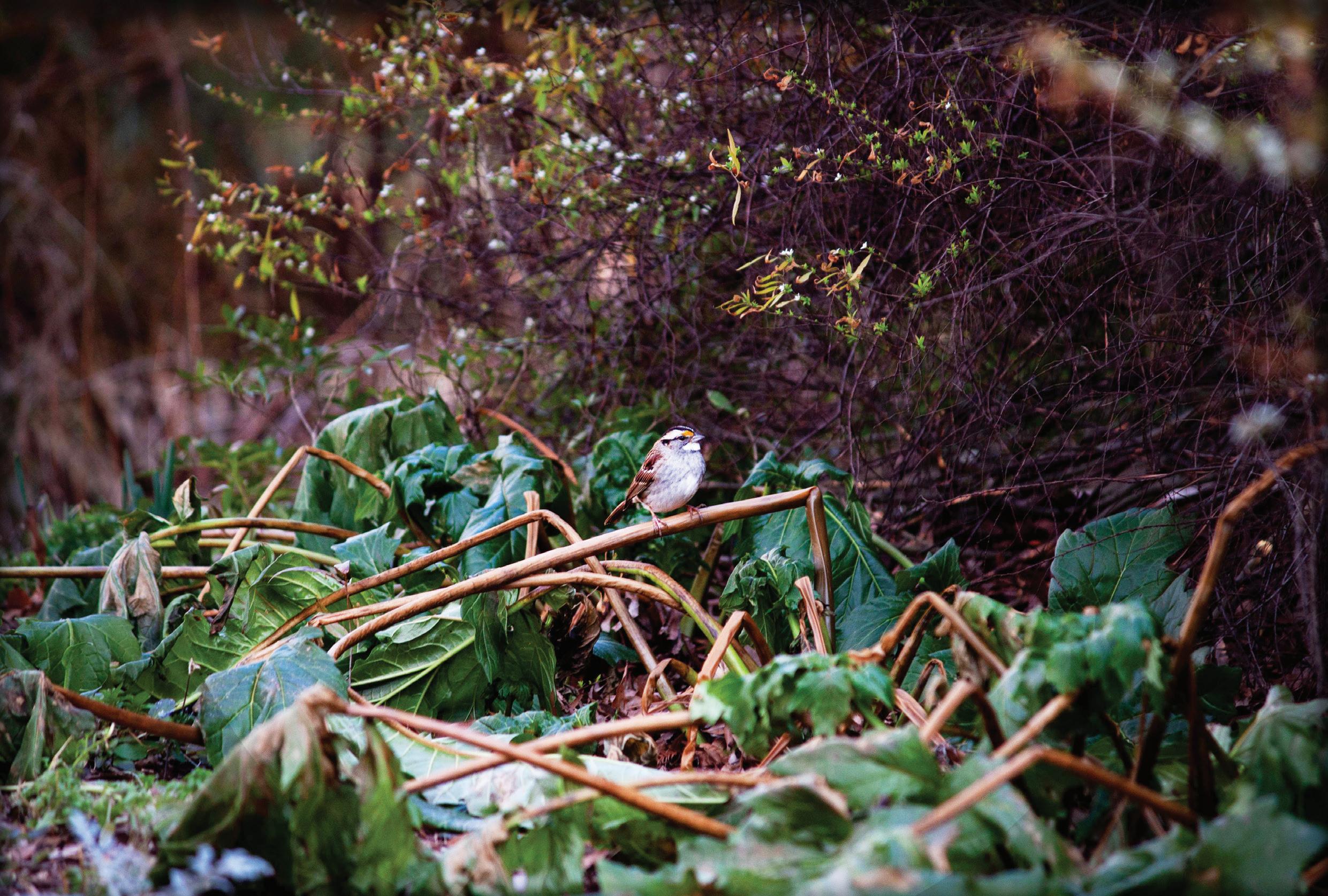
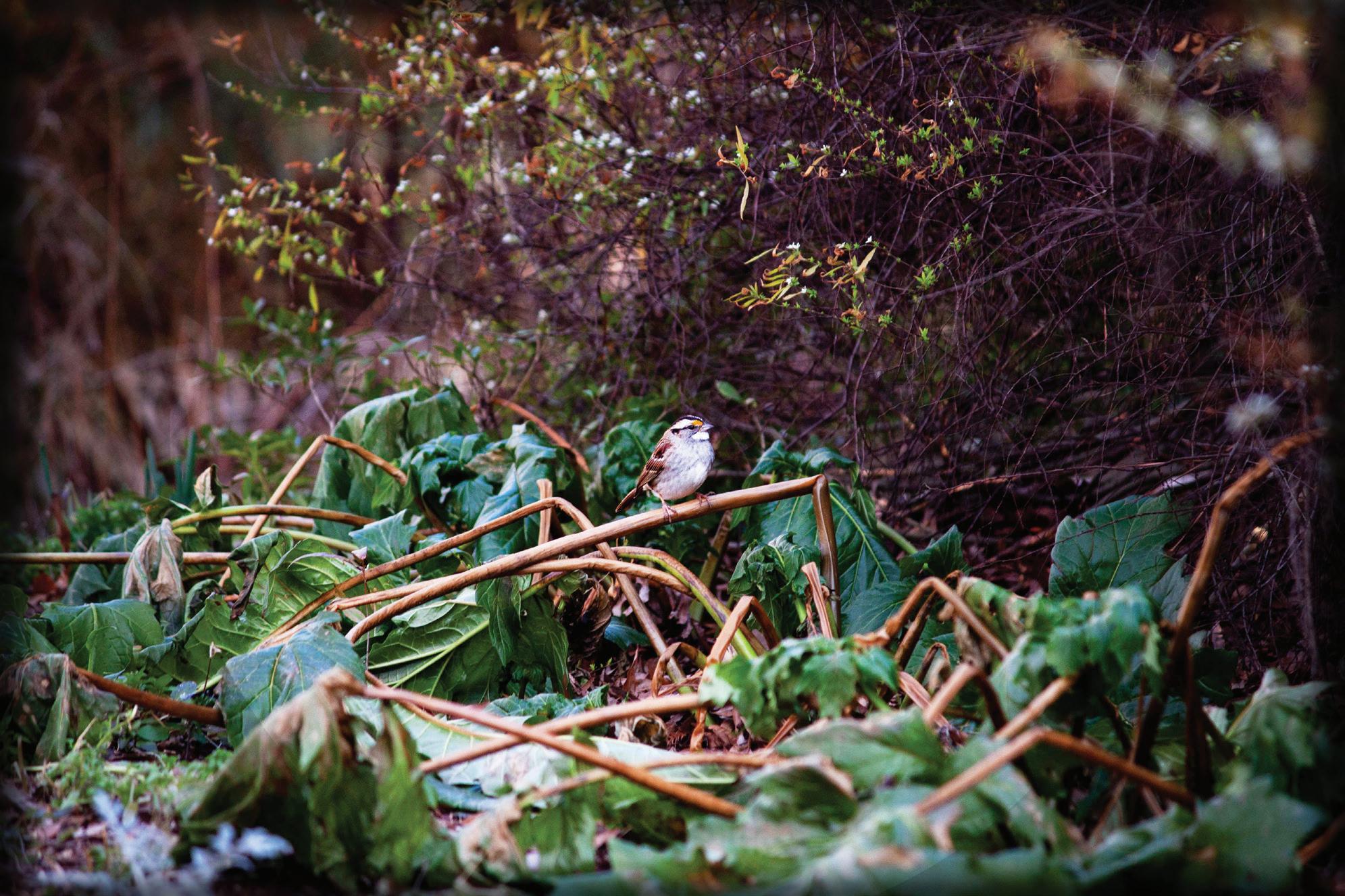
INTO THE WOODS
COLTON REVIEW 48
Josefina Puello Photography
LABYRINTH OF FEAR FOR A DREAMER
Selena Weaver
Nightmares are made real even if they are not believed in.
Can a figment of my imagination truly hurt me if I let it?
An open galaxy with endless unknown possibilities in which I am Goddess.
Am I in control or am I being pulled by strings? As a Goddess I have the power, right?
The stars are my subjects, and cosmic dust is my domain.
The mistress of this celestial realm in fear of the unknown.
That uncontainable addiction to the anonymous has stood its ground.
Fear is weird. I wouldn’t doubt it because it keeps me alive.
Fear is weird. I wouldn’t doubt it because it gives me a reason to live.
Fear is weird. I wouldn’t doubt it because it knows why I should be afraid.
An emotion I can’t fully comprehend.
Like a tempest within me, swirling and raging beyond my control.
A sense of power and uncertainty.
It is something extraordinary, but overwhelming. I adore this feeling.
But at what cost? How far am I willing to go?
A nightmare knows no bounds, morals, or mercy.
Maybe that’s why it is called a nightmare in the first place.
Nightmares are the essence of brutality.
It is the essence of evil, and it can never be truly defeated. Life itself is purgatory. A dream is my heaven. A nightmare is my hell.
Is this the answer to the afterlife?
In death, these worlds would never collide.
A dream is the Holy Mountain.
A nightmare is the void. The abyss.
I dream of a better place where evil never existed. With the waves of tranquility sweeping the soul, untethered and free.
The beacon of light. Free from limitations.
Purifying the nightmares to become anew.
Fear is in the eye of the beholder. Into the world of dreams and nightmares, I am a dreamer and I control my own destiny.
Will I dream even in death, or suffer the nightmares?
Do I decide my own fate?
COLTON REVIEW 49
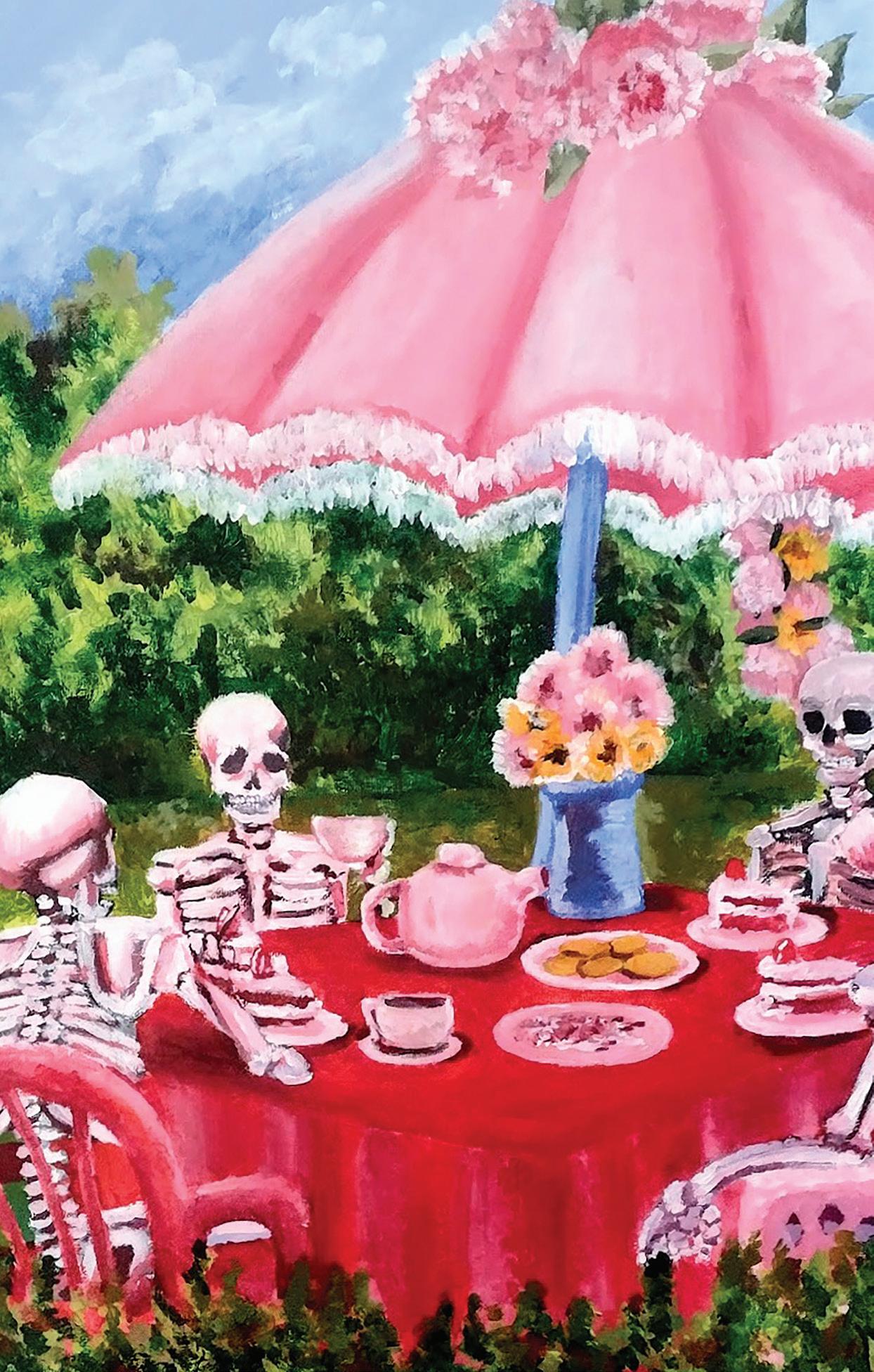
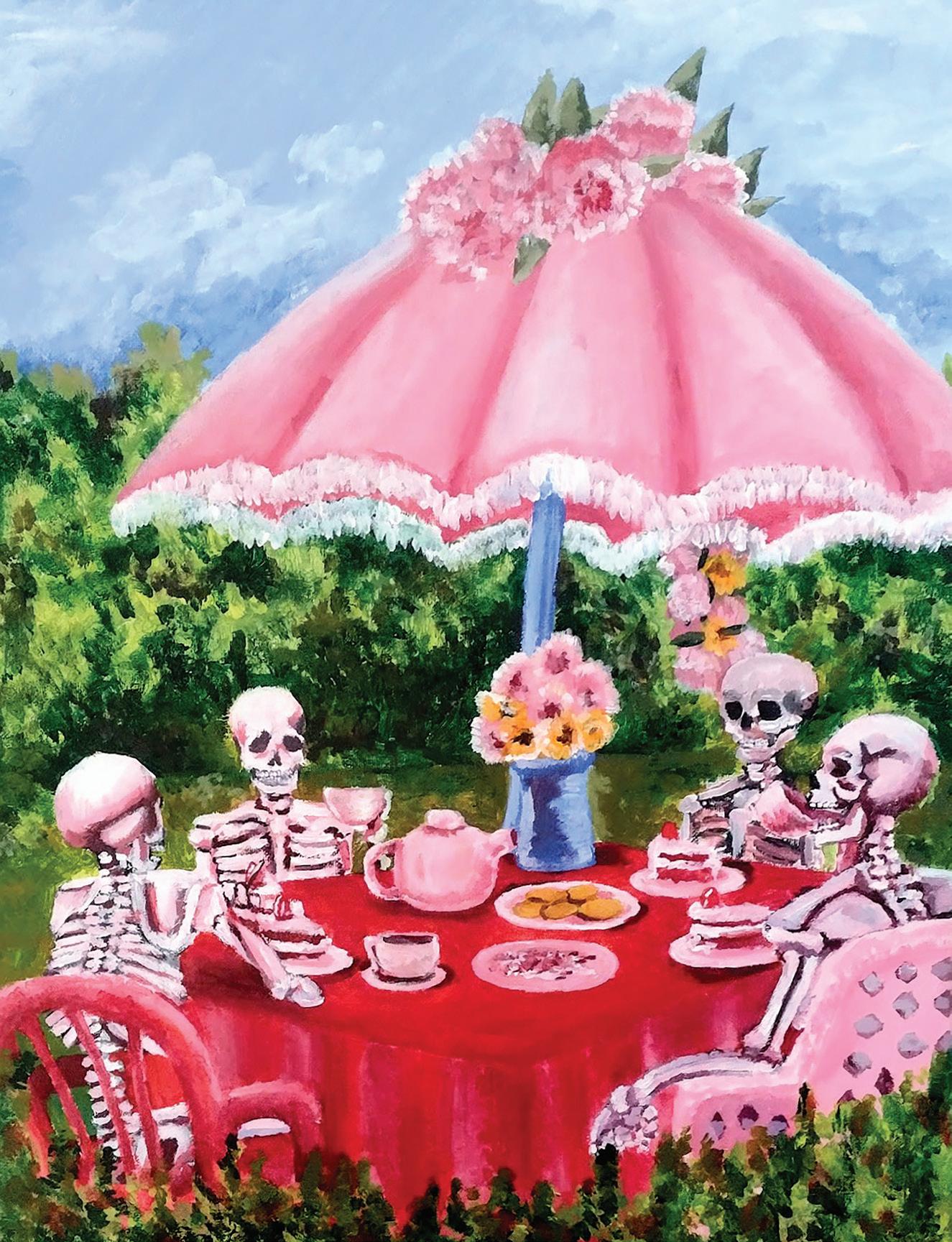
THE TEA PARTY
COLTON REVIEW 50
Valentina Carbotti Acrylic
THE VERY PULSE OF THE MACHINE
Lauren Bartos
TW: Mention of suicide and suicidal ideation, discussion of terminal illness/cancer, body dysphoria, description of a corpse, existential dread
Inspired by Soma by Frictional Games
They declared my brain tumor inoperable. Something about it being in such a delicate area, and the fact that it had gone undetected for so long. They had no clue if it had spread or not. They gave me a year to live, at most.
The news had left me with a sort of resigned acceptance. My migraines had been steadily becoming worse, and more often than not my sleep would be interrupted by violent seizures. My memory’s been shot to hell, too. I hadn’t expected to be given good news. My father had sobbed, clutched onto one of my hands so tightly I thought he would break it. My brothers tried to argue their way out of my prognosis, as if it was only a matter of opinion. My friends—for some reason, I can’t remember their names, although I can barely remember my own birthday so I’m not exactly surprised—devoted themselves to finding fringe cases where people like me pulled through, survived risky surgeries and demanding treatment plans.
I had already accepted my death at that point, so sitting squashed between what’re-their-names in the back of a taxi wasn’t how I wanted to spend what little time I had left. I was humoring them, I think. Trying to help them work through the news. The three of us were close—very close. Our relationship had started out of pure necessity, with us splitting the rent for a house located near the base where we worked.
It worried my father—he always meant well, but I think that he thought my
being autistic would cause the whole living situation to crash and burn. His outstanding show of trust in me definitely didn’t start a week-long fight between us. I was notoriously introverted, and had a difficult time getting along with other people.
There had been an…“incident” with a roommate I had in college that made him overly-cautious. I hesitate to even call it that, since it implies a level of seriousness that isn’t warranted. There had been a fight—a culmination of a lot of different things that turned explosive near the end of that semester. He thought I was sleeping with his girlfriend, and I had told him, quite plainly, that she wasn’t my type. I ended up with a broken nose, and he lost a few of his teeth.
As I said—really nothing worth making a big deal about.
My father smothered me, tried to convince me to just get an apartment where I could be on my own and not have to worry about sharing a living space with “strange men.” (What was I, a teenage girl being lectured about going out at night? I wanted to tell him that out of the three of us, I was the strangest.)
He went so far as to offer to pay for the apartment himself. With his salary, I knew he could afford it, but I wanted to be self-sufficient. I wanted to try new things and meet new people, even if the thought of changing my routine terrified me.
COLTON REVIEW 51
But the thing is, on-base housing sucks total ass. Sure, it costs more to rent close by, but I think it’s worth the hassle.
My two friends and I ended up getting along surprisingly well. The shorter one was almost suspiciously friendly—he could probably befriend a rock if he put his mind to it. He soldiered past my bluntness and my tendency to remain completely silent for long stretches of time. He certainly talked enough to make up for my quietness. I’ve always been more than happy to just sit there and let him talk at me. The taller one was always more reserved. We rarely “hung out” in the typical sense. It was more that we would sit in the same room and do our own things. Parallel play. He painted miniatures—something that always amused me, as the figures seemed microscopic in his hands. I built model planes. The two of us often shared paints and supplies.
We were close. The news of my imminent death shattered them.
Sometimes it felt like they were the ones on their deathbeds. Like they were the ones who had to watch themselves rot away in the mirror. At the time, it annoyed me. They weren’t losing their hair in massive clumps. They weren’t losing muscle mass at such a fast rate that even holding a cup felt like a monumental task. But it’s always easier to retroactively forgive someone. I’ve always had a soft spot for the two of them.
Things are too dire for me to be able to hold a grudge. I don’t have the luxury of allowing things to go unsaid.
As much as I was annoyed by their stubborn refusal of the truth, I didn’t want them to feel like they could have done something more to help me.
My taller friend had already suffered through loss after loss, and I could tell that even if he tried to put on a brave face, he was desperate. He didn’t want to be named in my will— scoffed and said that we still had time, there was no need to give up just yet. I think I ended up giving him my Walkman and cassette collection. I hoped he would recognize the significance of it. That I was leaving him with the items I was practically born with. The writing of my will passed by in a blur. It felt unreal. I was dying. I am dying, and I needed to spend precious time deciding how my belongings would be divied up.
I figured that (hopefully) the two of them would still be together after I passed. That way, they could both make sure my stuff wouldn’t just sit and collect dust. There was no way I was going to trust my belongings to my brothers. I won't delude myself into thinking I’m the only reason the three of us became friends, but I know how loss can affect people.
I can’t remember which one of them first contacted Athena—not that it really matters in the end, I guess. It was the shorter one, maybe. (I have a 50/50 chance of being right.) He interrupted an otherwise silent meal to tell me that he was looking through medical journals and don’t roll your eyes this time, and he found something interesting. A neurologist in Anchorage was utilizing a new form of brain scan—one that, apparently, went deeper than just the form and chemistry of the brain. It wasn’t just a static image—it could create a working copy.
Her work showed a lot of promise, but she needed willing participants. I told him that I didn’t want to spend my last year as a test subject, and he grinned at me. That was the best part—you didn’t need to be present after the initial scan.
COLTON REVIEW 52
I’d be able to spend my time at home while the computer would use the scan to test and compare different treatments at an impossible rate.
The computer program could predict how Treatment option A would pan out, then option B, on and on, condensing hundreds of cumulative years into a convenient data set. No more trial and error, I could rest while it did the heavy lifting. Once the trials had been exhausted, they would be able to see which treatments had the highest rates of success. It seemed unrealistic, too good to be true. I should have trusted that feeling.
He reached out to her, spoke at length about how my situation was an exact match for what she developed the tech for. It was good timing that he contacted her when he did—they were recently approved to start testing on people. No more monkey and rat brains, they were in the position to start doing something real.
I had sighed into my meal with the sort of tired resignation that followed me everywhere. All the way in Anchorage? I really don’t like the idea of doing all that traveling…Piper (my sister-in-law, a wonderful woman who had the misfortune of falling in love with one of my dipshit brothers) is due to have her baby any day now. What if I miss it?
He assured me that we wouldn’t, and even if we did, wouldn’t I prefer a potential cure so that I could spend more time with my niece/nephew?
It was a long shot—we both knew it. But I’ve always had a bleeding heart. I knew that they would torture themselves with “what ifs” for years to come if I didn’t entertain their theories and upstart treatment plans. Just the thought made me feel terrible.
We stepped out of the taxi and onto the filthy, black snow mush, and I could see that someone was waiting for us. They stood in front of a nondescript office building, their arms wrapped around themselves to shield their body from the biting temperatures. I would learn this man’s name later—Kieran McCarthy. The friend that reached out had done a lot of research into the people behind the project. McCarthy was an MIT graduate with a degree in engineering. Apparently, he was a bit of a celebrity in the world of robotics, which seemed completely unrelated at the time. He shook each of our hands in turn, before looking at me and asking if I’m Mr. Landvik. I joked about how that made me feel old, and he might as well just call me Marius.
He had a friendly-looking face. Warm, brown eyes that matched his earlength brown hair. He was taller than me (not that that is a difficult bar to clear, seeing as puberty granted me the generous height of 5’2) but shorter than both of my friends. Young, as well. Early thirties if I had to guess. (I wonder why I remember his appearance so clearly, when I struggle to recall the names of my family members.)
COLTON REVIEW 53
McCarthy gave us a small tour through the building, pointing out different labs and scientists and how they contributed towards The dream. It wasn’t some college grad’s side project housed in their parent’s basement, which was a huge plus. It wasn’t anything like the stupid crabapple treatment someone was running in their backyard that my friends dragged me to. Their project seemed well-funded and a genuine labor of love. Even my taller friend— who was a self-proclaimed nihilist with an eternally bad attitude— appeared hopeful.
I was tired. Walking and talking and even just standing took up so much energy. I just wanted to go home and rest.
I asked, more out of politeness than any real desire to get to know him, what made you decide to start this project? Did someone close to you—
Oh, no, nothing like that. He cut me off with a wave of his hand. My expression must have been visibly sour, as he rushed to apologize. Sorry for interrupting you Mr. La—uh, Marius. I just didn’t want you to think—I wanted to make sure that—ugh, sorry, I’m not very good at talking to people. They usually have me working in the background, making sure everything’s running properly.
There was a moment of tense silence as I did my best to stop myself from making a snide comment. My shorter friend gave me a “just give it a chance” sort of smile.
We stopped in front of an unassuming door as he punched a code into a small keypad. It’s strange—before that point most of my memories are blurry, difficult to make out, like an overexposed polaroid—but I can remember what happened after with clarity. The buzzing fluorescent lights would make the room look like a hospital if it wasn’t for the behemoth sitting in the center. A hunk of metal and wires with what looked like VR goggles mixed with a bike helmet suspended over a single chair. It produced a continuous humming noise, almost like a purr.
Standing next to it, dressed in a pristine white lab coat, was a woman— Athena. Her black hair was pulled into a tight bun, and her face was schooled into an expression that I assume was meant to be comforting. (It looked more like a grimace.) She held out a perfectly manicured hand for me to shake, and her grip was firm. Mr. Landvik, she started, it’s good to finally meet you.
Her voice carried a light accent, one I still haven’t figured out the origin of. She talked about how moved she was by my story, and how she hopes her work will at the very least give me an improved quality of life. She gave the three of us a simplified explanation of how the tech functioned—like an MRI, but with entirely new formatting. It would preserve everything about my brain chemistry and structure, creating a perfect one-to-one copy.
COLTON REVIEW 54
As she spoke, her eyes never left my forehead. It felt like she could see straight through my skull and was staring at the tumor. Like she was talking directly to it.
I just wanted it to be over. The hotel beds weren’t comfortable, but they were better than this. Why did I have to be such a people-pleaser?
She ushered me towards the machine, motioning for me to take a seat. She knew that I traveled a long way, so I’d probably expect the procedure to be lengthy and complicated, but the actual scan should only take a few minutes. I keep saying that we should’ve picked a more convenient location, McCarthy said, not looking away from the screen of a nearby computer. All this travel for something that amounts to getting your brain’s picture taken.
I spoke, did you know some Native Americans thought that when a camera takes your picture, it steals your soul? My shorter friend laughed, while the taller one shook his head and mumbled that hopefully there wasn’t any truth to the claim.
Athena seemed amused at the idea, or maybe I was just imagining the way her lips curled into a smirk. Wouldn’t that be something? She hummed as she adjusted something behind me.
She told me that I would probably feel some slight pressure, but if anything felt painful, to let them know. She reached up, grabbed the helmet-looking-thing,
and pulled it down onto my head. Her fingers moved deftly as she adjusted straps and sensors, fitting it snugly against my head. The helmet covered my ears, blocked out the sounds of the room around me, and left me only with the sound of my own heartbeat pounding against my eardrums.
All of that traveling and arguing and convincing has led to this—me, sitting in a repurposed office chair as I feel more than hear the machine whir to life behind me. There’s a click, and a feeling like my entire body has been doused in ice water. I grip onto the edge of the armrests.
I wait. And wait.
Nothing happens.
I try my best to not start fidgeting, unsure of how it could affect the quality of the scan. There’s no pain, not even any real pressure, and I’m starting to feel like the biggest moron on earth for letting what’s-his-name drag me to fucking Alaska all so I can sit in a chair with my eyes covered while two people I’ve known for ten minutes do tests on me.
I’m going to haunt him for the rest of his stupid life.
The room feels colder than it did when I walked in.
COLTON REVIEW 55
I wait five more minutes (I know because I count the seconds, seeing as there’s nothing else for me to focus on) before speaking up.
“Is it done?” I flinch at the sound of my own voice, at how strange speaking feels. The words come out clear, but it feels like my tongue is glued to the roof of my mouth. Like it’s impossible for my lips to actually form what I want to say. There’s no response.
Slowly, so that they have time to stop me if needed, I move my hands towards the helmet. When no one intervenes, I pull it off. The room is dark, but the details quickly come into sharp focus. It’s…definitely not the room I was just in. For one, the place looks completely trashed. There’re miscellaneous bits of garbage strewn everywhere, and everything is covered with a thick layer of filth and dust. The general layout is the same, but it’s like it was sent two hundred years into the future. As if it’s been long-abandoned, and the elements were allowed to have their way with the equipment.
“Guys? This isn’t funny!” I try my best to sound angry, but the trembling in my voice gives away just how terrified I am. My body feels heavy and weak as I try to push myself out of the chair. I take a few stumbling steps forward as I look around, trying to get a better look at the room. “What kind of person plays a prank on a guy with cancer? Was everyone else in on it? Athena? McCarthy?”
My voice echoes, and no one responds.
Somewhere nearby, a pipe is dripping water at five-second intervals. Drip… drip…drip…
Wrapping my arms around myself, I take a few more steps forward. No one jumps out of the impossibly dark shadows to scare me, what’s-hisname-why-can’t-I-remember-his-name doesn’t appear from around a corner to apologize for taking a joke too far.
His jokes usually aren’t this meanspirited. There’s a significant difference between replacing the sugar with salt and…whatever this is. And he’s been so careful around me lately— like I’ll die instantly if the AC isn’t at the perfect temperature or if he raises his voice. I won’t waste my time wishing for things to go back to normal, but having everyone around me walk on eggshells is wearing my patience thin.
It’s like everyone’s suddenly turned into my father, the way they see me as being incapable of taking care of myself. (“The doctor said to avoid ‘high-stress situations,’ Porter. I don’t think she was talking about driving with the windows down.” The memory seems to come from nowhere. That was my voice, but who’s Porter?)
I glance down. My clothes haven’t changed, at least. Old Adidas sneakers that were passed down from one of my brothers, gray sweatpants, a T-shirt that used to be white, and my father’s nylon flight jacket. (I had given up dressing “nicely” a week after the diagnosis.
COLTON REVIEW 56
I figured I might as well be comfortable during the time I had left.)
My stomach churns as I pull in deep breaths, trying to prevent myself from launching into a panic attack. The doctors said—what did the doctors say? I don’t remember their exact words, it was something about how high stress levels could trigger seizures or aneurysms.
Which one was it? What’s the difference?
My phone isn’t in my pocket anymore.
I need to start moving, try to find where those morons went. If they get mad at me for ruining their little experiment, I’ll tear them a new one.
There’s a door on the opposite end of the room—industrial looking, with a sheet metal face and rusted hinges. It screeches loudly as I push it open, sounding as if it hasn’t been moved in centuries. The door opens into a hallway that’s just as dirty as the room I was in. My room seems to be right in the middle, with both sides of the hall stretching into indiscernible darkness.
The walls are lined with refuse and debris formed into haphazard piles, and are covered in scrawling black handwriting and deep, claw-like gouges. The hallway is dark, but for some reason, I have no issue reading the text. “They lied” is etched into one segment. “Stuck in hell staring at heaven” is written just below where the wall meets the ceiling. Dread settles into the pit of my stomach.
Where’s the humor in this? I don’t understand what part of this situation is funny.
“Hello?” I call again. There’s no response.
Reluctantly, I step out into the hallway, avoiding suspicious puddles and other bits of scrap that are waiting for the chance to give me tetanus. Figuring that neither side seems more promising than the other, I choose to head down the left portion of the corridor.
My footsteps sound excessively loud when compared to the relative silence of the building. Makes me feel like I’ve suddenly become 100 pounds heavier. (I’ve always been underweight, no matter how hard I try to put on muscle. The issue has only been exacerbated by the tumor. I look like a scrawny teenage boy.)
The quiet reminds me of when my brothers forced me to go into a haunted house with them. I’m the youngest in my family, and yet they made me go first into every room and around every corner. Right now, there’s a distinct lack of people wearing dollar-store masks jumping out at me.
A part of me wants that to happen. Just so that I know I’m not alone.
Read the rest of "The Very Pulse of the Machine" by Lauren Bartos at www.coltonreview.com
COLTON REVIEW 57
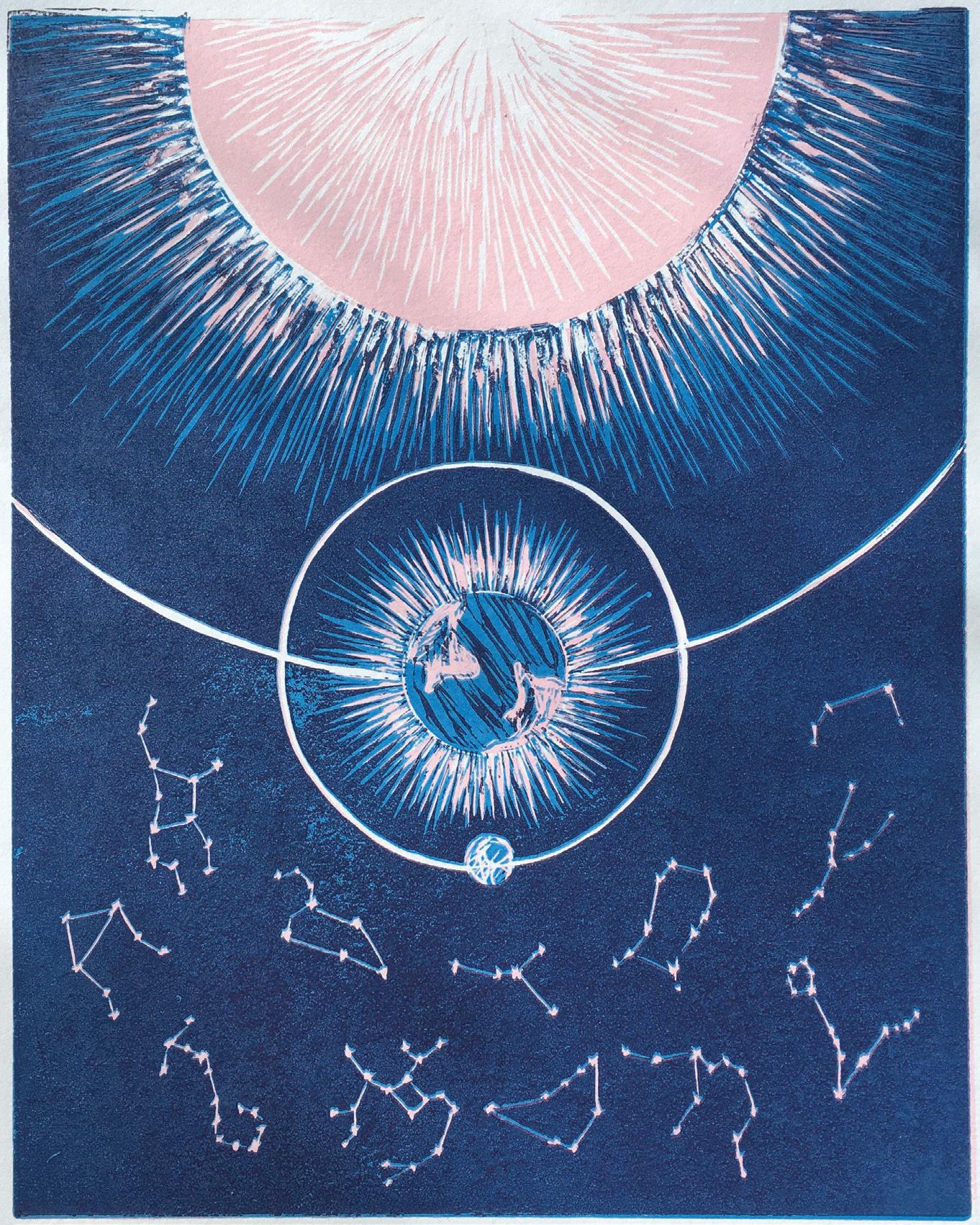
COLTON REVIEW 58
ORBIT ORBIT Noelle Pearce Printmaking
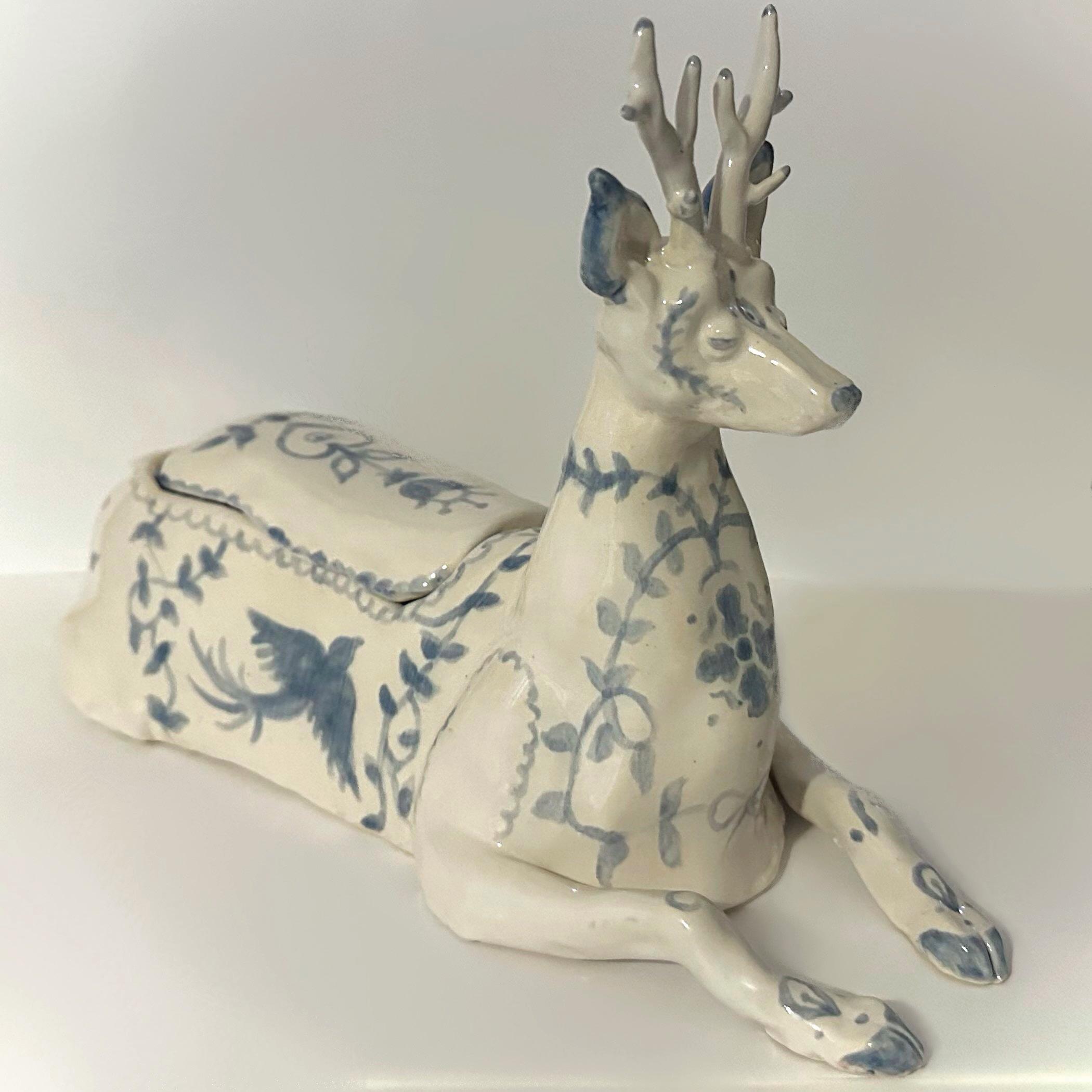
UNTITLED

COLTON REVIEW 59
Avery Williams Ceramic
THE PARADOX OF IMMORTALITY
Leslie Kramer
I am the sunless midnight sky
In sunless song I stay
To watch endless tomorrows turn
To endless yesterdays
My song, it sings Of starlight
Whose serenity is sweet
My eyes, they shimmer
Softly, as
The moonlight’s muse
They greet
Yet darkness has A dark side
Her will is oh-so weak
Yes, what happens to
The sunless night when
Sunlight’s kiss I seek?
I am the burning Mother’s love for A precious mother’s Child, and it burns
Ever brighter when that Precious mother’s child smiles
My love, it speaks Of memories that Have not yet Been made
That sweet mother’s child’s Laughter sings like A serenade
Yet love can be
So lonesome when A mournful mother cries
Yes, what happens to a Mother’s love
When a mother’s Child dies?
I am the rose’s royalty, oh
The romance in My cheek
Is the beauty in my Blossom that
Never lays me down
To sleep
My enchantment never fades
Like sunshine’s kiss
At dawn, enamored by
Aurora’s eyes whose Gaze is never gone
Yet beauty is pain
And pain has scars and Scars, like roses, bloom
Yes, still sometimes
I wonder why
These thorns must
Be here too
I am a great and Giving god whose
Hunger shakes the sky
Whose power and pain was Never born and shall
Never ever die
My might did make
The seas and My thunder birthed
The storm
My name can light
The moon and keep
The sun’s fire
Burning warm
But power is such
A poison oh what bittersweet joyless joy
For this power that Has made the earth can
Just as soon destroy
COLTON REVIEW 60
I am two bloodied edges
Of a tainted sword of time
One’s blood bleeds to live, yet
The other bleeds to die
What once was all i loved
Becomes that which i grieve
So to the everlasting earth, A choice i now bequeath:
To have loved and To have lost, or to Have never loved at all
To fly too close
To a swan song sun, and
To the oceans to fall
Yes, to have lost and
To have loved and
To have lived a life so brave, or
To never have to fear
This sweet death i’ve
Come to crave
For you see, even
The night grows weary
Of the dark, and Every mother’s child
Will break their mother’s heart
By any other name
A rose would still
Spill the blood of the hearse of
The god of eternal power who
Cannot escape its curse
To every day there is A night, yes
To every rose its thorns
So i am the new Immortal, yet With me
The end is born
COLTON REVIEW 61

TOAD ON STONE
COLTON REVIEW 62
Charlotte Thomas Photography
Alone on the bank, the lonely frog sighs, Beneath the moon’s glow, he dreams and lies.
Croaking softly, his lullaby tune, Damp solitude beneath the silver moon.
Echoes of longing in the marshy night, Fading ripples on waters so quiet.
Glistening eyes reflect a starry sky, Hoping for a friend as the night passes by.
Invisible tears in the pond’s reflection, Journey of loneliness, seeking connection. Kisses of ripples touch his webbed feet, Loneliness lingers, a quiet defeat.
Mournful croon carries across the breeze, Night’s embrace, a companion he sees. Over the water, a lone firefly glows, Pensive frog dreams of companionship woes.
Quiet whispers of reeds in the marshy air, Ripples of longing, a silent despair.
Solitude deepens as the night advances, Tales of the lonesome in amphibian dances.
Under the stars, a lone frog sits, Veiled by shadows, where loneliness fits. Wishing for kinship, a bond to find, Xanadu dreams in the lonely frog’s mind.
Yearning for friendship, in the marsh so vast, Zeal for connection, the lonely frog’s cast.
THE LONELY FROG THE LONELY FROG THE LONELY
FROG
THE LONELY FROG
Kara Browning
THE LONELY FROG
COLTON REVIEW 63
PANCAKES
Karlie Mullis
My stomach growls so you make me pancakes. Vanilla sweet and sunlight butter and the sticky brown eye chocolate, that molds itself to the roof of my mouth.
You stood up without a word. The sound of your hands, still warm from holding mine, rummaging in the cabinets, knocking your red pan against every pot in the kitchen. A new language to whisper words left unspoken.
I stay on the couch, the sun running their fingers up and down my back, hesitating in the sleepy Sunday morning haze of twenty-somethings playing house.
Your steady stirring— the light clink, clink, clink of your whisk against the glass bowl— is the metronome to the song you never know you’re singing. You breathe in melodies.
The pancakes sizzle and my mouth waters and I know you’ll bring me two on my favorite small plate stacked neatly on painted blue flowers. I don’t have to wonder anymore.
COLTON REVIEW 64

STILL LIFE
COLTON REVIEW 65
Ellen Schwartz Oil
THE GHOST
Camille Duncan
An excerpt from “The Eternal Recurrence of Sue Schuester”
It was nobody’s business to be snooping around the ruins of East Litchfield High. Not because there was any real threat present there, but the state of the building was just too dangerous to explore anymore. The place had been condemned twenty years ago, after a failed series of charity drives dashed all hope for prospective classes going forward. Not that any alumni wanted to talk about it. You could scarcely find anyone sharing rose-tinted memories from their youth at Litchfield; it seemed the sting had never cooled. So, the once noble institution was now rotting away in the woods off of Newberry Road, untouched since 1972 and, for some odd reason, never claimed by any developers. No one wanted to go near that school, but the promise of ghosts and specters was just all too enticing to the Bartley brothers.
Hopping the rusted fence, trekking down the cracked road through the woods, and then marching through the thick, unmanicured lawn up the hill, Simon, Lucas, and Micah Bartley finally arrived at the orange, paint-chipped doors of East Litchfield. They were locked, of course, with chains around the handles, but that didn’t stop Lucas from busting open the adjacent office window and climbing in, much to Simon’s chagrin.
“This is a bad idea, Lucas,” Simon warned, watching with arms crossed as his younger brother vaulted his legs one-by-one over the window sill. Lucas scoffed, turning around and looking back out the window at Simon.
“Quit being the doog, Si, you’re spoiling the fun,” Lucas retorted. He then disappeared back into the dark office and Simon begrudgingly climbed in after him, with Micah not far behind.
“Don’t call me the doog,” Simon called after his brother as he stepped into the room. “I’m the only legal adult here and I have a vested interest in making sure you don’t die before Mom kills you herself.” He looked back at Micah, his eight year-old brother wandering behind him.
“And why did you even bother coming, Mike?”
“I was bored,” he replied glibly, battling away space pirates on his gameboy copy of Metroid II. Simon sighed.
After some maneuvering around the broken door in what used to be the old admin office, they finally made their way out to the main hallway and caught up with Lucas. Turning on their flashlights, Simon wrinkled his nose as they made their way down past the rusted-out lockers, the air permeated with a rotting, moldy stench. His foot splashed into a puddle of god-knewwhat, causing his shoes to squeak against the tile. Meanwhile, Lucas was popping his head in and out of the old classrooms, hunting for the reportedly paranormal location he’d been ranting about for the past week. He came out of one of the classrooms with a smug grin on his face and shined his flashlight right in Simon’s eyes.
COLTON REVIEW 66
“You’re just mad because you didn’t get to go out with Mila Parker tonight,” Lucas teased.
“She has strep throat, I wasn’t gonna force her to do that,” Simon argued. “And I’m not looking to get sick, though honestly we couldn’t have picked a worse place.”
“You sure it’s not mono?” Micah quipped sarcastically from behind.
“Mike!”
“Ah ha! Here we are! This is it!” Lucas exclaimed, pushing his brothers aside. He ran down a particularly disgusting hallway to a pair of crusty orange doors. At last, the auditorium. Even though Lucas tended to ignore his brother’s advice, he did have the foresight to put on some gloves before aggressively pushing on the rickety doors, which screeched open with a horrible shriek. One door proceeded to fall off entirely, echoing with a loud CLANG throughout the vast room. Simon gave his brother a look, but Lucas was completely unbothered as he waltzed into the ruined theater, tracing his hands along the warped audience seats down towards the stage. Micah decided to park himself in the middle of the rows and fiddle away on his gameboy some more.
“Ugh, gag me. Luke, this place is toxic,” Simon remarked, recoiling. Lucas then proceeded to leap onto the stage and run over to a torn banner hanging from the rafters, ripping it down with childish delight.
“This place is amazing! Look! Class of ‘72!” he replied giddily, holding up the banner. “This was from the last class to graduate before they shut down this place.”
Simon arrived at the bottom of the stage, scrutinizing his spoils. “Yeah, I think it was for a good reason. Why are we even here? Some demon or something?”
“Ghosts, my brother, a real ghost,” Lucas replied, digging through his backpack for his tools. Simon came closer and inspected the various ghosthunting gadgets that Lucas had jerryrigged over the years.
“Where the hell did you hear about this?” Simon asked.
“From Dave Scarborough. Before he graduated, he and a couple of the physics club guys would come here every year to see it.”
“See what?”
Lucas then sat down on the stage and crossed his legs, splaying out his hands in true campfirestorytelling fashion.
“On November 25th, they say that every year, at 8:03pm, it appears. A dark shadow in the shape of a human being, rising up from the floor and disappearing into the ceiling. The exact same day, the exact same hour, the exact same minute,” Lucas reported excitedly. “And these guys, they went crazy trying to figure it out! They brought all their equipment, tests, but no dice! He said it was my mission this year as club president to figure it out.”
Simon crossed his arms and looked up at him skeptically. “November 25th is next week, Luke. Where’s the beef?” he asked. Lucas stood up and waved his makeshift gadgetry around at the perimeter of the stage.
COLTON REVIEW 67
“We have to do diagnostics, thermal readings, magnetic signatures,” he explained. “I always do a preliminary survey before any actual ghost-hunting. It’s an annual haunting, Si, I want absolute certainty that this is prime ghost real-estate.”
“An annual haunting? Dear god, shave off the corners of your head, square,” Simon quipped as he slumped down in one of the seats. Lucas frowned at him, resting his hands on his hips.
“Well, the least you could do is take some pictures,” he said. “You know how to work that camera better than I do. I need my references.”
Simon let out a sigh, standing back up. “Fine, but you’re paying for developing the film,” he said, pointing his finger. Lucas hand-waved him and wandered off towards the back of the stage, his EMF reader letting out a series of weak beeps. Simon shook his head and rummaged through his backpack for his camera. His brothers never failed to exasperate him. Being latchkey kids, he was always the one tasked with keeping them in line when traipsing on little adventures like these. Micah was at least easier of the two to deal with, being laser-focused on the latest technology. However, it was disconcerting that now, at this age, he was taking after Lucas, his irreverent, hyper-nerd brother who always got into trouble and sneaked into places he wasn’t supposed to be. Though on the other hand, Simon could at least appreciate some of the beauty in this place as he walked around the room and snapped photos.
Big paneled windows near the left of the balcony bathed the room in natural light, with swarms of dust particles glittering in a strangely beautiful way. A hole in the roof let in a draft, which whistled as the wind blew outside. There were long frames of warped, large-format pictures on the walls from past performances at East Litchfield: Kiss Me Kate, Oklahoma, Carousel, and surprisingly a production of Company, which Simon didn’t understand how they even got away with. He made his way towards the back of the theater to get a wide-view shot of all the rusty orange seats in the room, but paused for a moment to let everything sink in. It was humbling to be in a place that so many had found joy and laughter in, the warm and happy memories made here now standing cold, abandoned, and desecrated.
Desecrated. Simon looked up from his camera, taking a better survey of his surroundings. It dawned on him that the place was much more thoroughly damaged than the other rooms in the building, most of which had been left alone. This place looked like it had been the scene of a riot. He noticed the door that Lucas had so casually knocked to the ground had actually broken off its hinges, with a large crack down the middle and scratches that had already been there. Some of the seats near the exit had physically broken out of their stalls, and, chillingly, Simon noticed the hundreds of dirty footprints crowded near the door, with scratches and dents on the drywall around the frame. There was a stain that looked like blood on the carpet. His heart sank into his stomach.
COLTON REVIEW 68
“Hey guys,” Simon called out, trying to hide the anxiety in his voice. “I hate to break it to you, but we have to get back.”
“Oh come on! I was just getting my radiation readings!” Lucas whined, throwing up his hands in a dramatic pose on the stage. Micah complied and rose from his seat, beginning to make his way back to Simon, when he stopped in the middle of the aisle and looked down one of the rows.
“Hey guys, look at this!” Micah called out. “There’s like, a bunch of papers all over the ground!”
“Guys come on, Mom’s probably got dinner on the table and you two have homework. And Dad won’t appreciate you messing with his geiger counter, Lucas,” Simon ordered. Lucas ignored him and ran over to Micah to investigate. He bent down to pick through the contents while his little brother looked over his shoulder.
“What is it, Lukie?” Micah asked.
“It’s evidence!” he exclaimed, scooping up the papers on the floor and dumping them out into the aisle. He picked up one and carefully examined its contents.
“These are playbills,” Lucas observed. “Playbills from, let me see, ‘The East Litchfield High School 1972 Thanksgiving Fundraiser Variety Show,’—god that’s a mouthful— and let’s see…‘ performances by faculty and staff to raise funds for restoration’…Wait a minute!”
“What is it now, Luke?” Simon asked begrudgingly.
“November 25th, 1972! November 25th! That’s the same day that the ghost appears!” Lucas exclaimed. “And wait hold on, hold on…wait, Simon. Do you know this guy? He looks familiar.”
“Lucas…”
“Please just take a look,” he begged, handing it over to him. Simon narrowed his eyes carefully at the picture. It was extremely faded, but he could make out a lanky, dark-haired guy with blown-out Bee Gees hair and sharp features, rocking a telecaster guitar.
“Yeah I recognize him. That’s the guy who fixed Dad’s car last month,” Simon observed, tracing his finger over the name under the picture. “Scott Larsen, yeah, he works at the Jiffy Lube on Fairfield Avenue.”
“Maybe he knows what happened?” Micah proposed. Lucas’s eyes lit up and he pointed at his brother with a knowing look.
“Smart thinkin’ little Lincoln, interviewing the witnesses. This’ll build an excellent case,” he commended, patting him on the shoulder.
“No Lucas, we’re not gonna go bother this guy,” Simon scolded. Lucas whined and gripped his hands in frustration.
“Come on, Si, he was there! November 25th, 1972! Come on, man, we’ve gotta ask him some questions,” he begged.
COLTON REVIEW 69
“Luke, you’re getting out of your head again. Get back in there,” Simon insisted. Lucas then put his hands on Simon’s shoulders.
“Come on, man-to-man, you’ve got to have some spirit of inquiry in you about this.”
“You’re fourteen, and no, I’d rather not come back here,” Simon said dismissively.
“Okay, one: you’re barely eighteen, and two: this could be one of the greatest mysteries ever uncovered, Simon, one of the biggest breaks I’ve ever got, and I don’t want to let the guys down. I have to do this,” Lucas pleaded.
“You haven’t even seen the ghost yet.”
“I want to see it,” he implored. “I want to find out what happened and be there when it happens. Please.” Simon let out a sigh, scratching his forehead. He knew Lucas would wear him down eventually, but it wasn’t entirely his fault. As frustrated as Simon got with Lucas, as much as he groaned and complained, he knew that he couldn’t deny his passion. Lucas had always needed special attention, and Simon loved his brother even if he was a little over-enthusiastic. He was just getting his footing in a club with people who actually liked him, where he finally fit in. So once again, Simon let his guard cautiously cave in.
“Okay, after school tomorrow, we’ll go visit,” he conceded, holding out his hand. “But we have to pick up Micah after that and you have to behave.
If it turns out to be nothing, we’re never coming back here again. Capisce?”
“Deal. Okay, deal,” Lucas conceded, grabbing Simon’s hand and shaking it, though Simon knew that that would probably blow up in his face immediately. Simon then pointed at Micah, still not paying attention to either of them, eyes affixed to his space-faring adventure.
“And you too, Micah. Don’t let this guy turn you into a punk.”
“I will make no such promises,” Micah retorted. Simon chuckled half-heartedly.
“Ah…Christ. Alright, autobots, roll out,” Simon commanded, and with that the boys followed behind like soldiers as they made their way back down the hall. Walking out of the building and back into the woods, there was still an amount of unsteadiness Simon had about being in that room, how violently torn up it was. He felt it in his bones that something unspeakable had happened, and he was worried about how he was letting Lucas pull at this thread without knowing what it was attached to. When they made it back to the main street and up the sidewalk back home, something told him to look more closely at the evidence they had collected. Something he had noticed in there had caught his eye.
“Lucas,” Simon said, looking back at his brother. “Can you hand me that playbill you showed me? I wanna check something out.”
COLTON REVIEW 70
“Sure,” he replied, fishing it out of his backpack. Simon took it from him and gave it a read as they were walking, scanning through the photos. It was a typical catalog of 70s variety show acts that they had put on for this school fundraiser, with photos of the performers and parent testimonials to graduating seniors, each with their own fabulous haircut. But then his eyes stopped at one photo in particular. Near the last page, there was a picture of a girl, kind of like Marcia Brady, smiling in a bright orange and white cheerleader uniform.
“This girl went missing,” he announced to his brothers. They stopped in their tracks and stood to attention as Simon stared at her photograph.
“Who went missing, Si?” Micah asked. Simon gathered them near so they could inspect it more closely.
“This girl, Susan Schuester. We were going over missing persons cases in my criminology class and I read her old case file on the computer. And Lucas?”
“Yeah, Simon?”
“She went missing on November 25th, 1972,” he replied, giving Lucas a serious look. Lucas grabbed the playbill and hurriedly flipped through the pages back to the event lineup. “And she was a part of the cheerleading squad, they were the last act of the night,” he deduced. “Something happened to her.” A knot twisted in Simon’s gut, and suddenly that spirit of inquiry that Lucas had mentioned beckoned his mind to know more. Not just for the sake of his own curiosity, but something in him called for justice.
“And maybe she’s the ghost.”
COLTON REVIEW 71
MIRROR
MIRROR
Kailey Wurr
When I look in the mirror I don’t recognize who I see but I don’t know if I’ve ever recognized me
I have never been and I will never be
I do not see myself in the glass because there has never been a me all I see is the skin and surface that you see but I know that under the surface is nothing and it is me
MIRROR
COLTON REVIEW 72

DENYING ACCESS
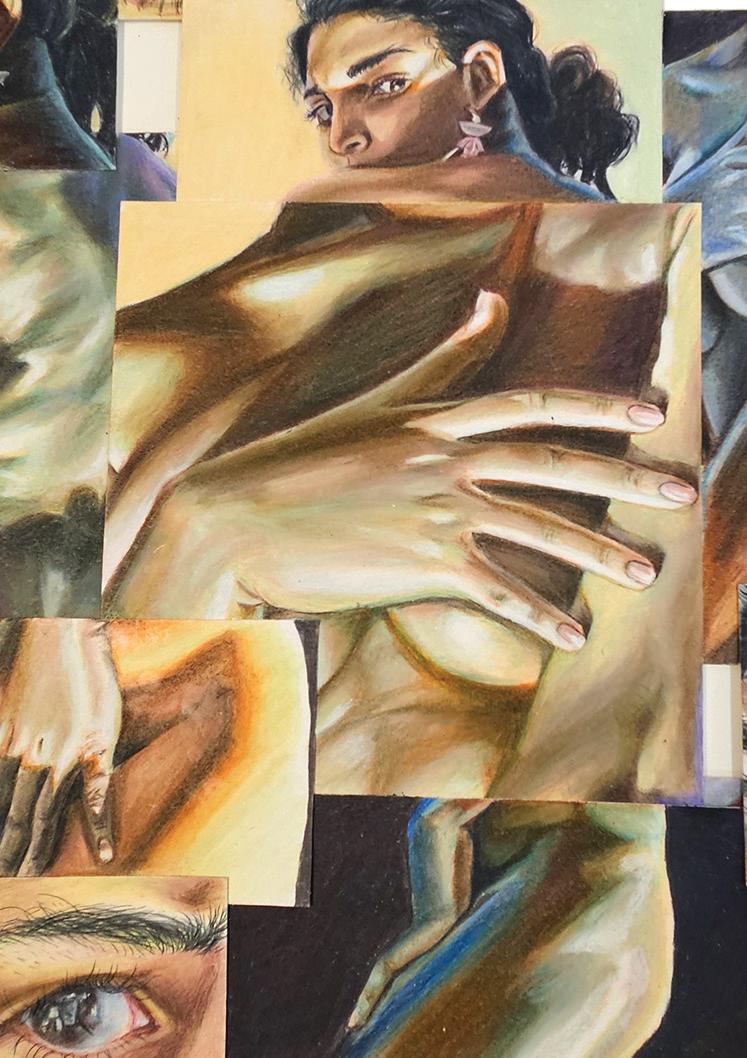
MIRROR MIRROR
Perla Gerez Hernandez
COLTON REVIEW 73
Colored Pencil
READING FOR CLAUDIUS
Constance Wesley Figueroa
I hear them scoff in shadowed velvet seats—
Their whispers carry through the theater:
This mad Ophelia knows no fool would cast
A Lady as Macbeth, nor Juliet
As Romeo. A brave man says it’s worth
A laugh, so why not hear me out? Alone
On stage, I watch as the director frowns.
A Hamlet he could understand, at least
A hero then I’d be, but why this king?
The bard did not write for someone like me.
Why tragedy? Why villany? Why not
When I can get a taste of infamy?
They’ll judge me harsh until I pray, the crown Of my dead brother ‘pon my cursèd head.
READING FOR CLAUDIUS READING FOR CLAUDIUS READING FOR CLAUDIUS
COLTON REVIEW 74
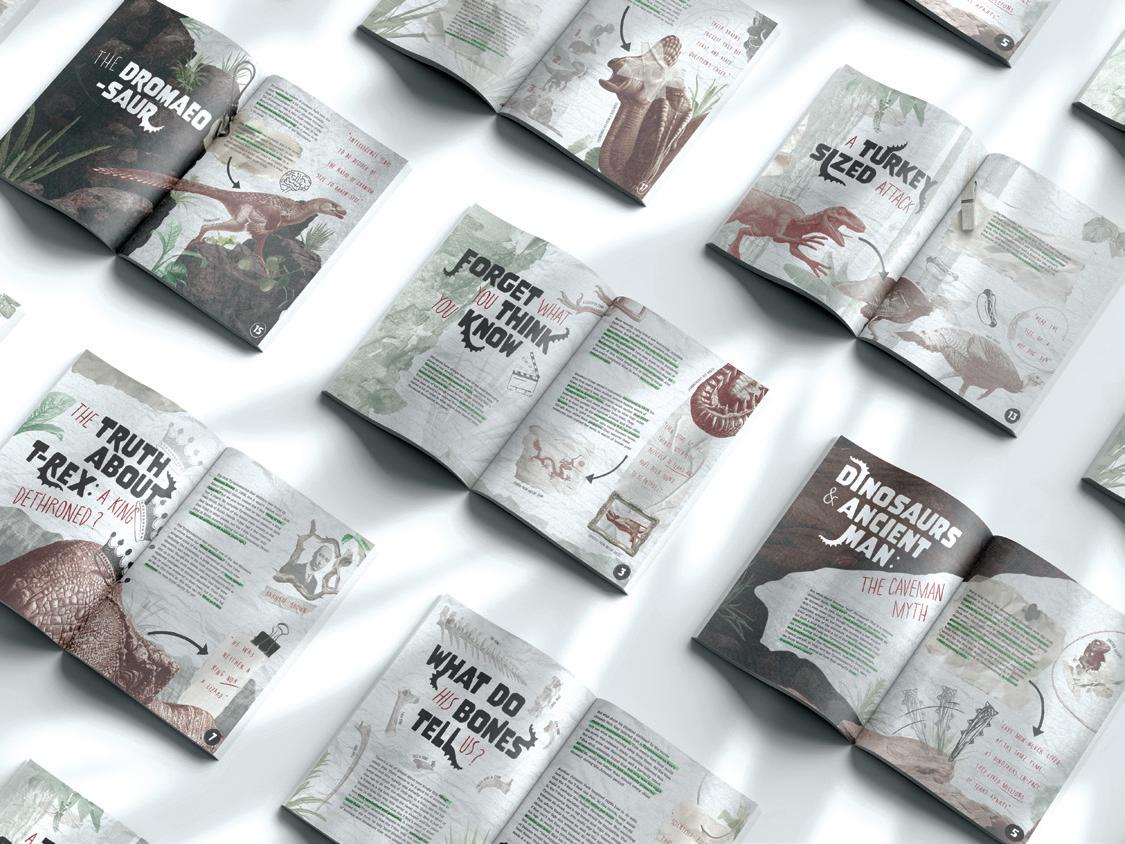
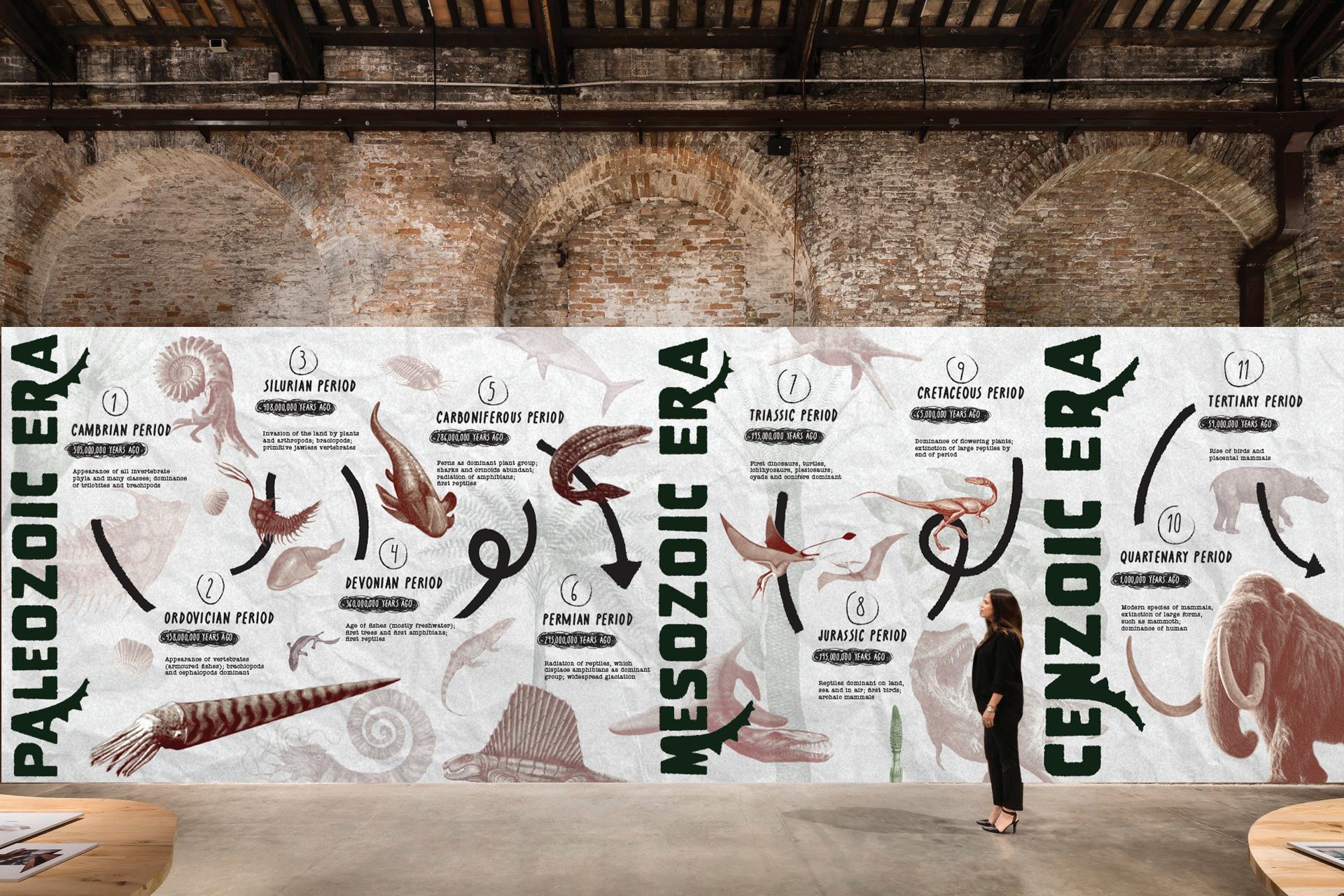
THE TRUTH ABOUT DINOSAURS
Claire Miller Graphic Design
COLTON REVIEW 75
PLACES, EVERYONE
Katie Avants
(At rise, the stage is empty save for the set. We are inside the lobby of Arcwood Ballet Conservatory. It’s an inexpensive, well-loved sort of space, endearingly shabby, as is characteristic of a community/amateur theater. A Christmas tree sits in downstage right, decorated with all the standard festive trimmings and softly glowing. Upstage center is occupied by a receptionist’s desk, with a computer, phone, and other typical desk items. Filing cabinets create a sort of wall next to the desk on the left, and more racks and cubbies occupy the space slightly to the right of the desk. Behind it, of course, is a chair, and the front is decorated with garland and lettering bearing a holiday greeting. We hear voices from stage left, and on prance TIPPY and PARKER, TIPPY leading the way, as well as the conversation.)
TIPPY: This is definitely my most favorite time of the year!
PARKER: Oh, yeah, mine too!
TIPPY: I’ll tell you what, Parker. When I was little, I thought that Christmas was the best day of the whole year. I lived for Christmas. I liked Christmas even better than my birthday. But now that I am older and wiser, I’ve realized something. Christmas is alright, but what really deserves my year-round adoration is Nutcracker! It is the single greatest event in all of ballet history. After all, there are far more important things in life than a whole day of getting presents, Parker.
PARKER: (Skeptical but amused) Oh really? Like what?
TIPPY: (Smiling into the distance) The sound of applause.
PARKER: I dunno, I think presents are pretty amazing.
TIPPY: Well, that’s why you don’t have a lead role. And that’s why you didn’t come up with the plan for advancing on the studio hierarchy! But don’t worry, I’ve still included you!
PARKER: Oh really?
TIPPY: Yes! What kind of real-life best friend would I be if I didn’t include my on-stage best friend in my plan to finally claim the respect I deserve around here?
PARKER: So what is this plan of yours?
TIPPY: (matter-of-factly) Well, you see, Parker, it’s all about cozying up to the right person. If we can impress someone stupendously important, it’ll be an instant status boost. My first thought was Miss Flossie, since she’s the owner and director and all, but no! Miss Flossie is the obvious choice - cozying up to her would be artless. The person we need to align ourselves with is Romy.
PARKER: (alarmed) Romy? Tippy, we are WAY too lowly to talk to her. She’s one of the best dancers, she’s playing the Sugar Plum Fairy this year, and she’s clearly one of Miss Flossie’s favorites. She’s like, Arcwood royalty.
COLTON REVIEW 76
TIPPY: Parker, you are forgetting something. I am eleven and a half, which is almost twelve, which is close to thirteen, which is an official teenager. And, I have a lead role this year. There’s a lot that puts me on my way to being Arcwood royalty. It’s like…I’m Princess Beatrice, and Romy is Duchess Kate.
PARKER: And Miss Flossie’s the Queen. Before she died.
TIPPY: Yes, well, that goes without saying.
PARKER: Who’s Prince Phillip?
TIPPY: I don’t know, I think Miss Flossie has a husband or something. Anyway, I—
PARKER: And which one of us is the Queen’s corgis?
TIPPY: I don’t know, maybe the volunteers. Anyway, I’m Princess Beatrice, you’re my ward or something—
PARKER: I am not your ward. We take all the same classes, and my birthday is only seven months after yours.
TIPPY: My POINT is! We’re not superduper big royalty, but we’re still allowed to chat with the Queen, or, I mean, Duchess Kate, and you know, go inside Buckingham Palace and stuff.
PARKER: Does that make your sister Meghan Markle? Since no one knows how to feel about her?
TIPPY: Leave Scarlett out of this! The point is, if we ever want to really establish ourselves, we need to befriend Romy.
PARKER: Doesn’t that seem weird? We’re both younger than her— she’s like, the same age as Jules and Scarlett.
TIPPY: And the Queen was younger than Prince Phillip, but they made it work!
PARKER: But the Queen and Prince Phillip made it work because they were fighting in the war or something—they had lots to talk about, like bombing the Germans. What are we going to talk about with Romy? She’s way older than us—
(Her eyes widen, and she drops her voice.)
Tippy, what if she wants to talk about sex?
TIPPY: Don’t be ridiculous, Romy isn’t having sex, she’s always at dance! And it may surprise you, Parker, that like Queen Elizabeth, we, too, are facing a great evil of our own—but instead of Germans, it’s lack of funding.
s e, the s tag e is empty save for the set. We are inside the lobby of Arcwood Ballet Conservatory.
ownstage right, decorated with all the standard festive
( A t r i
i n
COLTON REVIEW 77
ruetama/y .retaeht A samtsirhC eert stis
d
PARKER: Wait, what?
TIPPY: I was snooping through Scarlett’s inbox this morning to make sure she bought me the presents I wanted, and I saw this whole budget breakdown from Miss Flossie—we almost didn’t have a Nutcracker this year because of how few donations we’ve received. Scarlett’s doing her best to fundraise, but people aren’t giving much.
PARKER: Oh my god, that’s terrible.
TIPPY: Thankfully, some Good Sami-tarian wrote us a big check at the last minute so we could pay the theater rental. Miss Flossie’s inviting her in today to say thank you. Scarlett’s all worked up about it.
PARKER: Why? Isn’t she happy that someone saved the day and we get to do Nutcracker?
TIPPY: Yes, but you know Scarlett. She’s like Taylor Swift in her Reputation era— she doesn’t trust anybody.
PARKER: She’s a little short to be Taylor Swift, but okay—anyway, what makes you think Romy will know what to do about fundraising?
TIPPY: Well, Romy’s parents can barely pay for her classes and stuff, and yet she somehow digs up the money, so I figured she might have an idea.
PARKER: Romy can’t pay her bills?
TIPPY: I also saw that in Scarlett’s inbox—Romy stays late most nights to do chores around the studio to offset her tuition. Miss Flossie mentioned it in an email.
PARKER: Tippy, do you think it’s alright that we know about these things? I mean, money can be kind of personal.
TIPPY: It’s not personal, it’s business! And there is no business more serious than Nutcracker. Besides, we’re aiming to get personal with Romy, remember? We need to butter her up, but actually be useful, and in the process, raise our street cred. That way, people will be like, “Ohmygod, did you see Tippy and Parker? They were like, such good dancers, and they were like, so helpful. Like, they brought Romy water literally every time she asked for it, and they gave her so many pep talks, and they even fixed her eyeliner when it got smudged!”
PARKER: Tippy, I can’t do eyeliner!
(TIPPY seizes PARKER’S shoulders.)
TIPPY: That’s not the point! Listen to me, Parker! This is a major point in both of our careers! If I can pull off an alliance with Romy AND my lead role as Clara, it’ll open all sorts of doors for me!
(She releases PARKER.)
And with you, you know, tagging along, you might even get your pointe shoes quicker!
(PARKER pauses.)
PARKER: You really think so?
TIPPY: I don’t think so, I know so!
(Enter MISS FLOSSIE, WALLY, and STEWART from stage left. MISS FLOSSIE carries two enormous boxes.)
COLTON REVIEW 78
MISS FLOSSIE: Ladies! What are you doing out here? You are the only ones missing from my class!
(She swivels around and dumps both boxes in the arms of WALLY, who buckles slightly under the weight.)
Wally, leave these behind the desk.
WALLY: (grimacing) Sure thing. Should I let Scarlett know they’re here?
MISS FLOSSIE: Yes. Come along now, girls. I want you to think about what I said last night:
(sing-song)
“Inner thigh, inner thigh, hold that thigh until you die!”
(MISS FLOSSIE bustles off stage left.)
TIPPY: Unfortunately, no matter our place on the status quo, we’ll never escape Miss Flossie’s weird, rhyming corrections.
STEWART: Have fun holding!
COLTON REVIEW 79
Second Place in Poetry
THE SHOULDERS OF WOMEN
Kat Whetstone
my feet stand upon the generations of women their hands are cracked and their eyes weary with exhaustion and the burden of labor their voices weakened and strained from the screams. and yet they do not walk away or bury their words to please incompetence they sit with their stories and decide to tell them. they stand upon the shoulders of women before them their bodies sick with constant stimulation and circling around asking for nothing and given less than that. and yet they strum softly to the burdens of the woman before and before and before trying to give their daughters something better than their chances. i stand again on more shoulders and a little girl stands on top of mine she watches all the bodies and i tell her that she is the future and her crooked voice is what defines change she asks if i have ever felt the way she does in this moment i have and i say that i stand for her.
COLTON REVIEW 80
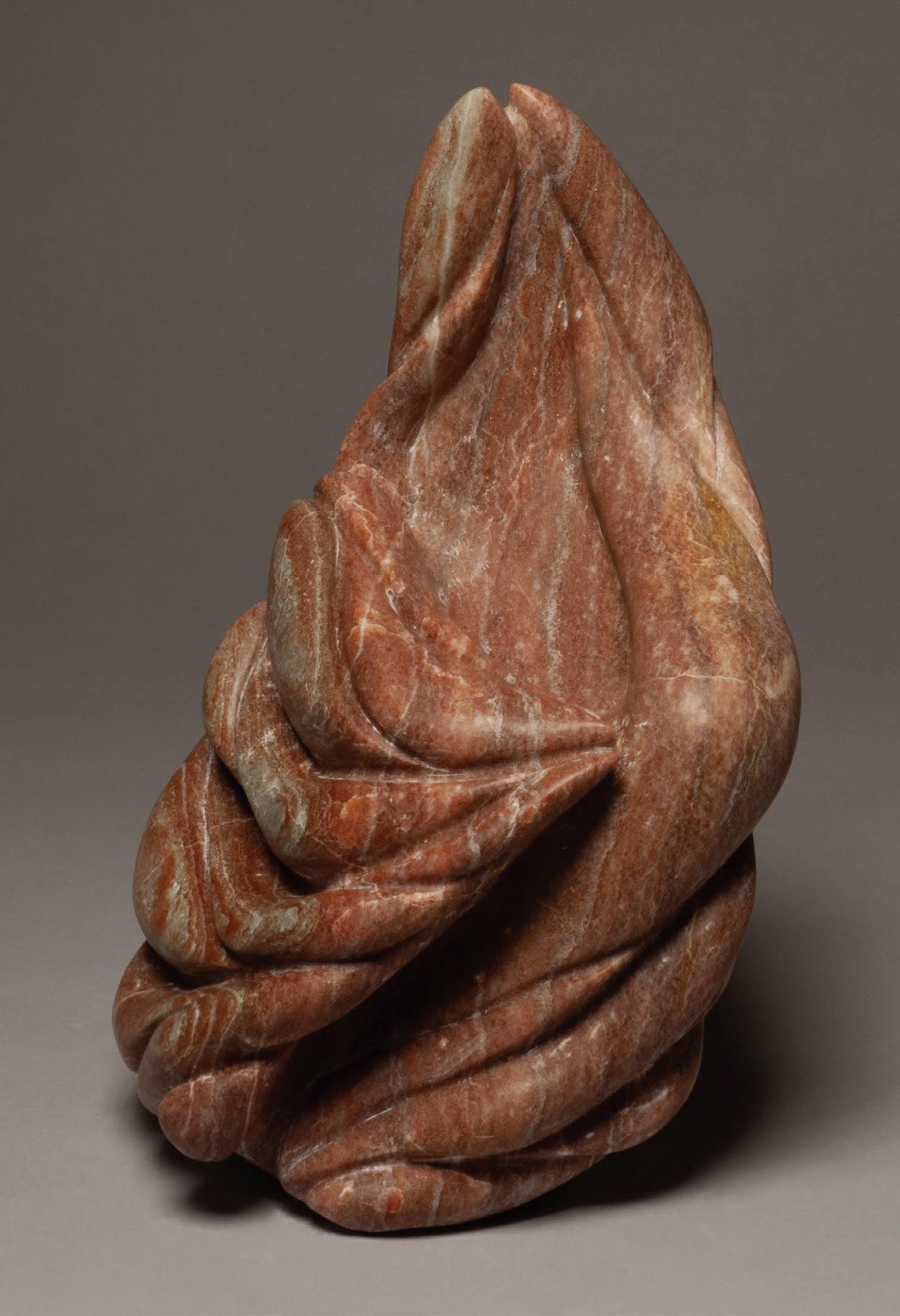
IMPERILMENT
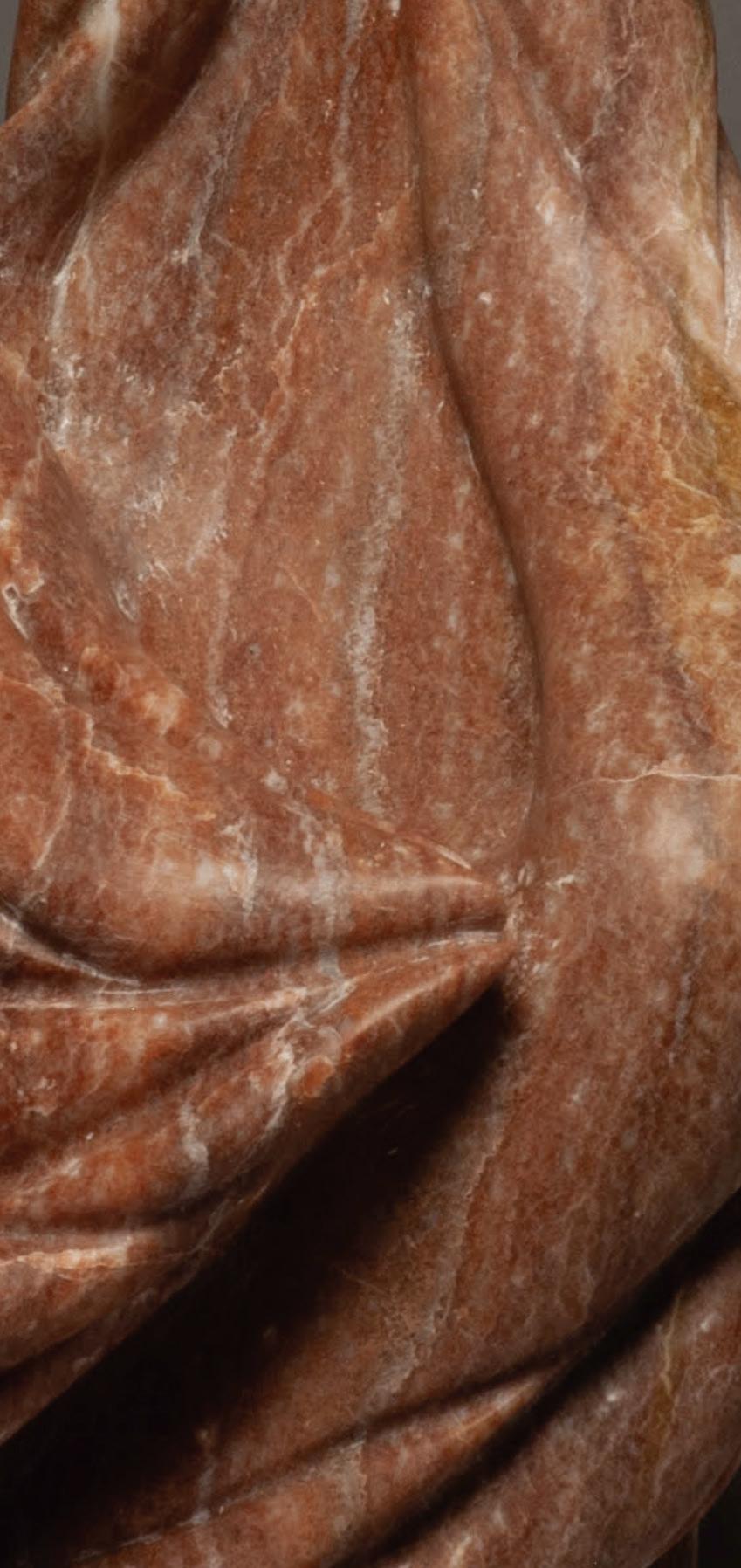
COLTON REVIEW 81
Sara-Rose Spann Alabaster Stone
“RESPECT WAS MURDERED” AFTER VICTORIA CHANG
Anonymous
Respect—died on November 29, 2017. The night before your birthday—in a fit of adolescent rage and a blinding hunger for revenge—I murdered it.
I told your wife all your secrets and spilled your guts all over the tiles of our kitchen floor. There was no second thought, just a weapon in my back pocket, the evidence of your infidelity. I thrust it forward. The kitchen filled with the iron smell of blood. It dripped off of the knife I held in my hand. Not just your blood but mine too. I ruined your life without a second thought. I ruined mine too. I slit the throat of daddy-daughter dances and action movie nights. I watched as shared packs of peanut M&Ms in the front seat of your truck crumpled and fell to the floor. I looked at you—and I mean truly looked at you, just a wide-eyed little boy who swam too deep—for the first and last time. Some stains permeate too deep to be removed.
COLTON REVIEW 82
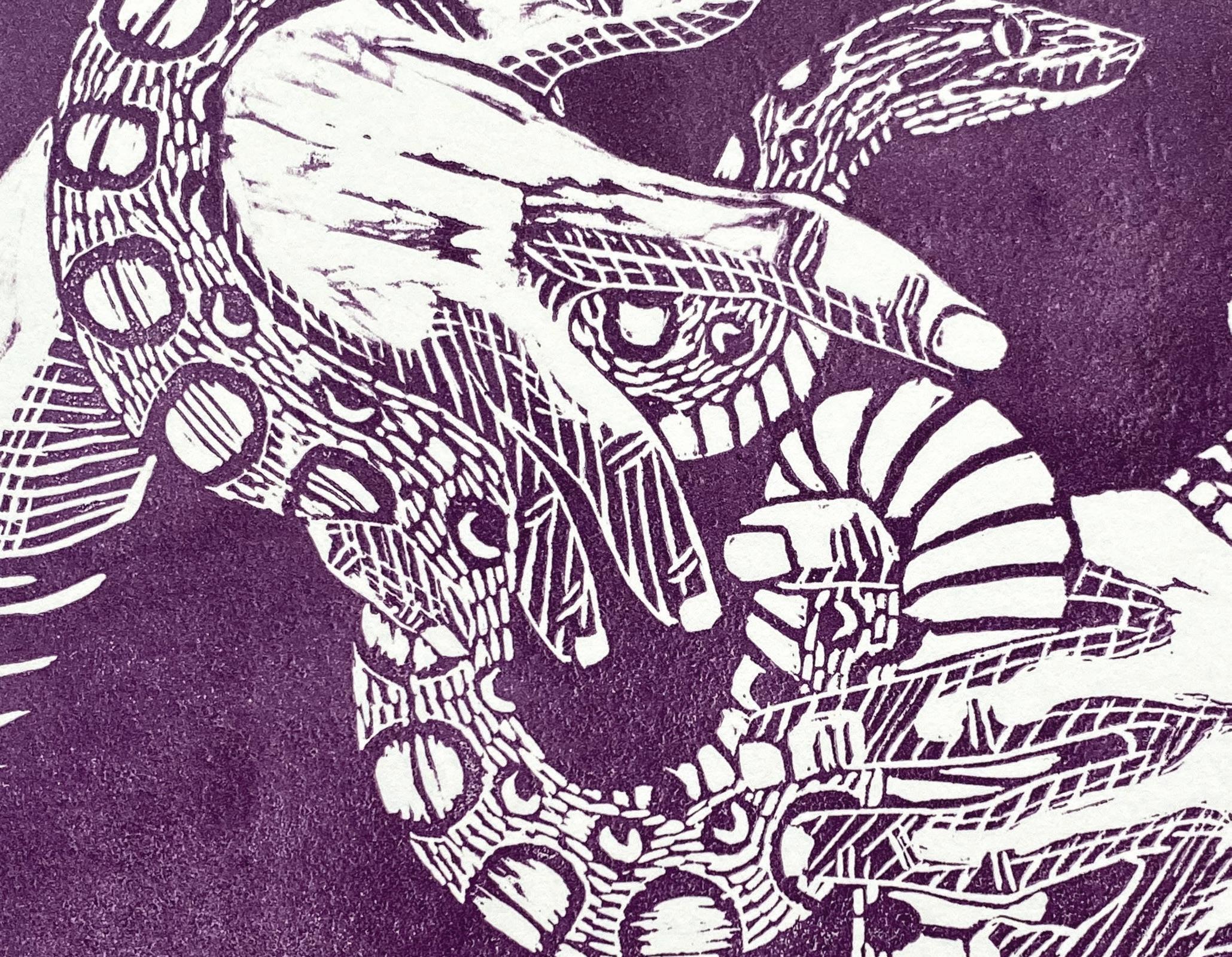
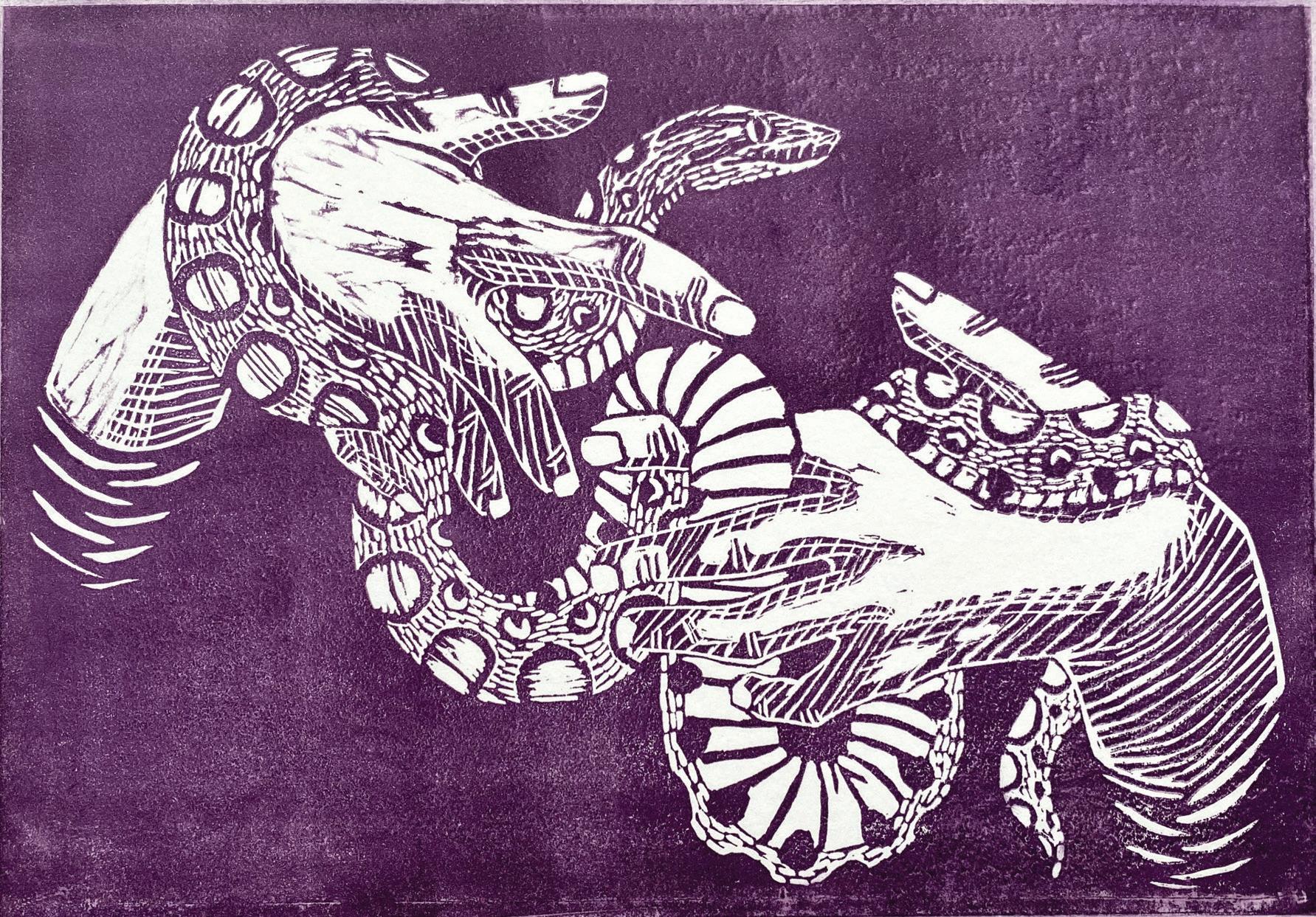
SELF-LOVE/SELF-ACCEPTANCE
COLTON REVIEW 83
Madison Russell Linoleum Cut
I will offer you mine. When your body decays I will offe r uoy
I will o ffe r y o u im n e . W h e n y o u r body decays I willoffer you mine. When your body decays I lliw reffo uoy .enim hW e n your body decays
. When your body decays
GLUTTONOUS
Jordan Johnson
All I am doing is worrying about you And hoping you feel brand new again. will offer you mine. W h e n y o ru bydo
When your body decays I will offer you mine. I will take a knife and ruin myself. Rip every part of me out. Remove skin from muscle Muscle from bone.
I will help you step inside
Then, I’ll stitch you up.
As you walk out without thanking me
I will clean up the blood I let fall on the ground.
Parts of me will fall away as I rush to make you dinner.
I will no longer exist.
I could not find another body.
No one would help me stop decaying.
Even as I slip away
lliwIsyaced
im COLTON REVIEW 84

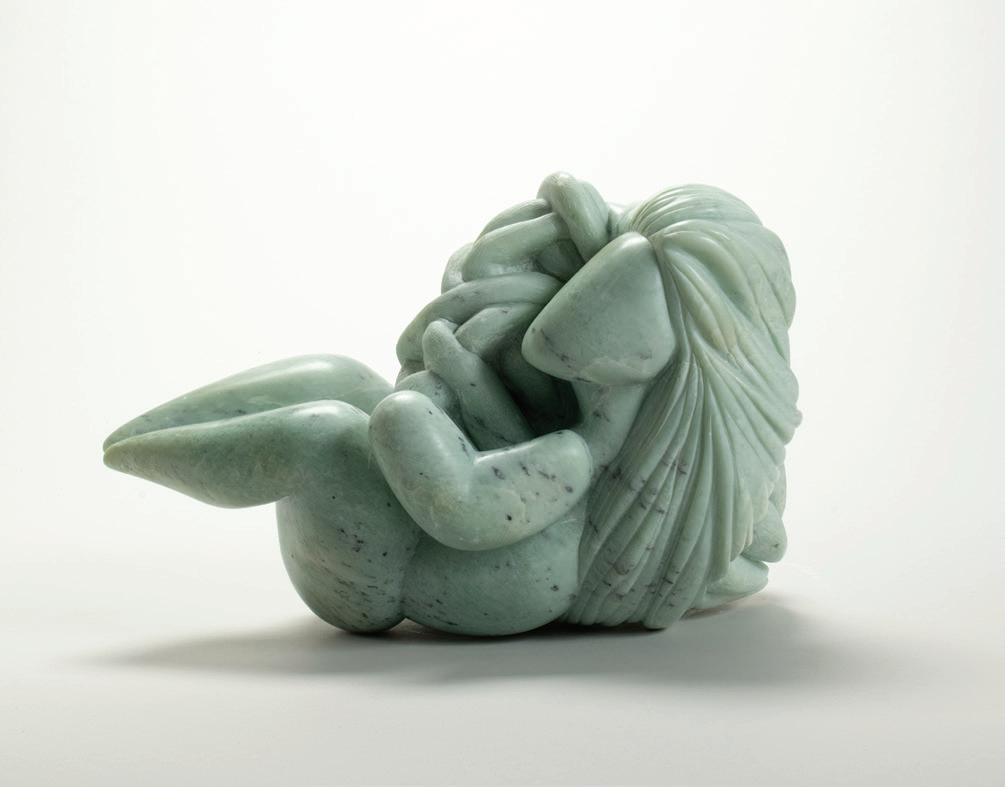
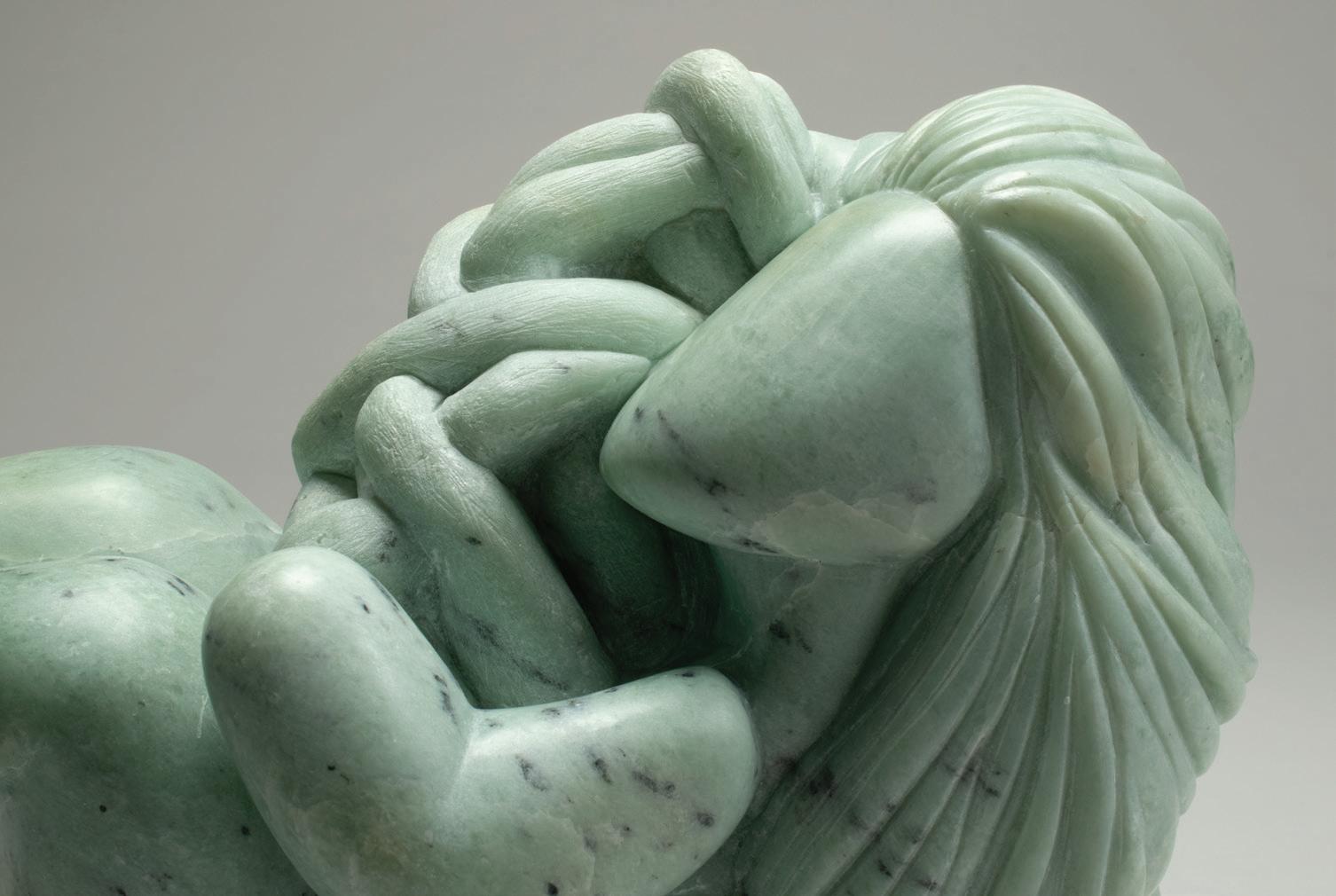
SURRENDER TO PERSEVERENCE
Arianne Gonzalez Soapstone
COLTON REVIEW 85
MY MIREILLE
Rowan Elwood
Today is our fifth anniversary, and I couldn’t be more excited.
I mean, five years; that’s a lot. Five wonderful, wonderful years. God, it’s only gotten better with every passing day. I have to make this anniversary special, and I know exactly what I want to do. I think it’s finally time.
My Mireille deserves the best, after all.
Oh, I still remember the first time I ever saw her. She was dressed in paint-stained overalls and a plaid button-up that had slid half off one pale, delicate shoulder. Her dark hair was sticking to her forehead, slick with the rain that drummed against the windows like even it couldn’t get enough of her. She was moving into my old apartment. There was nothing really left of me in it, and at first I minded that the last traces of my life there were going to be covered up by her presence. I was angry. Even if it wasn’t technically mine anymore, I still felt quite possessive over that rotten old place.
But then I saw her, staggering through the doorway with an armful of boxes. She was sweaty and flushed, covered in streaks of grime, but God she looked so cute rushing around, trying to decide where to put everything… For the first time in years, I felt alive. I was too shy to introduce myself to her or even wave hello yet, but the moment I saw her I was transfixed.
The power she had over me from the very first glimpse I had of her… It was love at first sight. I knew right then that she was the woman I wanted to spend eternity with. She would be my everything, and I’d be hers. I watched her shelve books and stack mismatched dishes in the scuffed wooden cupboards and fell deeper in love with every movement she made. I devoured every detail of her from behind the door; I wanted nothing more than to swallow her whole, to be melded into her, flesh and blood and bone. I decided then and there that she would be mine. My Mireille, my precious doll, my everything.
I spent so long watching her. I loved her so much it hurt, but it was the kind of pain that felt so good, so right. Mireille was my goddess, the sun in my sky; I lived off of her and her alone. I’d never felt this way about anyone before, and at first the intensity of my feelings even scared me. There’d been other girls, none of whom liked me anyways, but Mireille was different. I needed her. She ignored me at first, and, I won’t lie, it stung. Here I was, ready to give her everything, and somehow she still found other men more appealing. I guess I’d never been much of a looker, especially now, but what did looks really matter? I would have given her the beating heart from my chest if I could. That should’ve counted more than whatever they could offer her.
COLTON REVIEW 86
But I loved Mireille more than anything, and I refused to let her little flings do anything but make me more determined to win her heart for good.
The day she finally noticed my presence was amazing. Being around her, serving her every whim, it was a better high than any drug I’d ever tried before. I didn’t need anything but her and her beautiful smile, but I did want her attention. I started small. I left some flowers on the doorstep for her, and she smiled when she saw them. She was smiling at me. I fell in love with her all over again, more determined than ever to devote myself entirely to worshiping her exactly as she deserved. I kept leaving her little things, watching her through the walls separating us. I knew she was falling in love with me too. Sometimes she’d call out a soft ‘thank you’ when she found my gifts at her door, and the sound of her voice directed at me sent chills of elation through my whole being. When I finally moved in a few months later, I was thrilled beyond words. I already knew the layout of the apartment, of course, but making it official was just so exciting. I spent hours just wandering from room to room, seeing where things were different. Mireille’s presence had made even that shitty apartment beautiful. She had covered up the cracked and warping floors with colorful rugs, put her paintings over the shoddilypainted walls to brighten them up, and brought home little knick-knacks and figurines to display on shelf edges and windowsills. Most of it didn’t match, but I hardly cared; it made Mireille happy to live in such a colorful, vibrant home, and whatever made her happy made me happy.
All I wanted was to make Mireille happy. I never wanted her to regret even a single moment of her time with me. I wanted to prove every day with me would make her life better, and I did everything I could to make that happen. Every morning I made sure that I was always up before her to make her coffee just the way she liked it. When she left for work, I’d spend all day doing whatever chores I could find so she didn’t have to worry about a thing when she got home. I did dishes, I dusted, I picked up the books and trinkets she’d leave lying around, made sure the caps were put back on her paints so they didn’t dry out…I’d never been the neat-and-tidy kind of guy, and the apartment still bore the consequences of that, but for Mireille? I whipped myself into shape immediately. I didn’t want any frown lines to mar her pretty face; I just wanted to see her smiling. I left roses on the table every week, mixed with other blooms when I could. I’d always had an interest in botany, especially in flowers, and it thrilled me to send her those secret, sweet little messages told through the petals. When I learned that her favorite candy was sour gummy worms, I made sure to put a bag under her pillow whenever I could find some.
But when that’s your baseline, you have to really go all out for the anniversaries.
Technically, I couldn’t afford the lavish gifts I got her every year, but hey, I found a way. My Mireille deserved the best, after all, and nothing would stop me from giving it to her. For our fifth, I decided I would make it the most special so far.
I was going to ask Mireille to marry me.
COLTON REVIEW 87
I’d known from the beginning she was the one I wanted forever, and I knew she felt the same way about me, whether she knew it or not. I could always see in her eyes how much she loved finding my little gifts, knowing somebody loved her that much to make sure she never had to bother with anything she didn’t want to do around the house. Sure, she often thought my little gestures were something she’d done for herself—she had this adorable habit of forgetting things, like where she’d left her keys or what she made for dinner last night—but I loved her so much it never really bothered me. And those other men that came and went meant nothing. She might see one for a few weeks, but it never worked out, and in the end she always came back to me. The proposal would just be a formality. We’d be together forever, just like I’d wanted.
I couldn’t have slept last night if I wanted to. I sat by her bedside and watched her all night, admiring her and thinking of how tomorrow would be the start of everything for us. I’d already gotten my hands on a ring; I’d planned for roses and candles and the fanciest bottle of red wine I could find to celebrate. I knew she’d say yes, but what kind of boyfriend would I be if I didn’t make it special? If I could have, I would’ve proposed to her somewhere scenic, like on the Eiffel Tower or something, but I knew if I tried something like that, I’d start choking on my love for her and wouldn’t be able to pop the question. This was more comfortable for both of us, and so much more intimate.
Like usual, the moment she left for work, I sprang into action. I’d be doing chores anyway, but with such a special night ahead of us, I took extra pains to ensure that the apartment was sparkling, top to bottom. I should’ve thought about getting a tablecloth, just to really set the mood, but Mireille had some white sheets that worked just fine in its place. The extravagant bouquet I’d gathered had started to wilt a little, but that was fine; I just plucked off the darkening petals and sprinkled them along the path from the door to the table. I arranged the candles, with a lighter set beside them for later. There was just one more thing to prepare: the wine. Mireille had already gotten into it, the silly goose, but that was okay. It made it easier, really.
See, I knew Mireille loved a good sangria. She’d already started preparing it, and I smiled at the haphazardly-cut fruit already soaking in the wine. I doubted she’d notice my additions. There was a big bed full of lily of the valley growing just outside the apartment, and I’d spent a good hour or so combing through it for the tiny red berries those plants produced. Now I got to work crushing up the berries and mixing them into the sangria, humming as I did so. I had to make sure the poison took, so I took the risk and added more than I thought I could get away with, even throwing in a few finely shredded leaves and roots for good measure. I gave the pitcher of wine a good swirl before putting it back in the fridge for later.
COLTON REVIEW 88
I wouldn’t want it to get warm, after all; Mireille deserved better than that.
It wasn’t that I wanted Mireille to suffer, of course. I hated the thought of seeing her in any kind of pain at all, let alone what those berries were going to do to her. But this was the only way to make sure Mireille would be mine forever. I couldn’t leave the apartment, after all. They’d scrubbed my blood off the walls and stripped out the carpets, burned my belongings, but I couldn’t leave. Even going too far away from the confines of the apartment was difficult; it had been a real struggle to gather enough lily of the valley. And the thing was… Mireille was planning to leave. She’d gotten her dream job offer, but it was in a city hours away from here, and I wouldn’t be able to follow her. It would be easy to say I did this all for revenge, that I was just lashing out because I didn’t want her to leave, but I did it all for love. Mireille was the first person to live here since I died, and I wasn’t going to let her go for the world. She’d come here for a reason, I was sure of it. This place called to her, brought her straight to me; she must have known I was waiting here for her to come, that she would have everything she needed with me. She just couldn’t see yet that she’d be miserable anywhere else. And sure, maybe there was a little anger in it. She’d practically welcomed me into her life; I was the one she told all her fears to, the one she celebrated with when she finally finished her degree, the soothing presence when she cried herself to sleep over all those little flings, and she thought she’d be happy somewhere else? I couldn’t stand the idea.
Once she was dead too, I wouldn’t have to endure any more men putting their filthy hands on her, wouldn’t have to drift around her, knowing she’d never take our relationship seriously with this barrier between us…I wouldn’t be deprived of her heavenly touch any longer. We could be happy here, sick with love, spending eternity together while our physical bodies rot away. I knew it was what she wanted too. I knew her every desire like my own.
I still had a few hours before she’d get back from work, so I decided to use that time to write her a letter. I wanted to make sure I had all my thoughts in order, and could tell her exactly how special she was to me. Besides, all my attempts at speaking to her before had failed. She couldn’t hear me. She would soon, but for now, writing would have to suffice.
COLTON REVIEW 89
My dearest Mireille,
It’s been five years since I fell in love with you, and every day that love has only grown. I can’t really put into words how much you mean to me, but I’ll try. Before you moved in, I was so lonely. I’d been all alone here for so many years, frozen in time, trapped in these rotting walls while the world moved on without me. All I wanted was to have someone near me again. And then you appeared, like a miracle sent just for me. Every day I’ve known you, you’re more beautiful than the last, more perfect than I could have ever imagined. I feel so lucky to have you. You are everything to me.
So, Mireille, I think it’s time to take the next step in our relationship. We’ve been living together for so long, and I feel like it’s only made us closer than ever. I know you love coming home to me every night, and no matter what you’ll always come back. Yes, I know you cheated on me, but that’s water under the bridge, right? None of them really meant anything. When it really mattered, you came home. And I love you too much to stay mad at you for long. I want to be with you forever, and I know that, deep down, that’s what you really want too. And you knew this was coming, didn’t you? You knew I was here, that I loved you, you just weren’t ready to accept it yet.
I want to marry you, Mireille. Let me spend every day worshiping you until this rotting building falls down around us. Let me be your everything. Let’s spend eternity together. We don’t need anyone else.
I love you, Mireille. Here’s to the start of eternity.
Yours forever,
I worked the letter over until it was as close to perfect as I could make it. I couldn’t write down every single thing I loved about Mireille, or I’d run out of paper. And really, what’s important is that she’ll be here with me forever. I’ll have until the end of time to tell her all about how I adore every atom of her being. I put the letter at her place at the table with the ring and the empty glasses, eagerly awaiting her arrival.
Fifteen minutes before she was due home, I lit the candles and poured the sangria. I dimmed all the lights and queued up a playlist of old-timey love songs Mireille had been listening to recently. I almost laughed at how cheesy it was.
At last, my love has come along…
I ran through everything in my head one last time. I refused to leave any room for failure. Every exit in the apartment was sealed off, other than the front door, and I planned to break the lock the moment Mireille was safely inside. If the sangria didn’t take, well, there was really no shortage of ways to make this happen, it just depended on how creative I felt like getting. If worse came to worst… I wanted her to make the choice herself to join me, but I’d force her if I had to. If I still had a heart that worked, it would’ve been beating like crazy in anticipation. One way or another, I’d have my Mireille for eternity.
Mireille deserved the best, and I was going to make sure she got it.
█ █ █ █ █ █ █
█
█ █ █
COLTON REVIEW 90
My lonely days are over…
I couldn’t wait to finally be able to touch her. I couldn’t wait for her to finally see me.
And life is like a song…
I can hear her keys in the door now.
Welcome to our eternity, Mireille.
I love you.
love you. I love you. I loveyou.I love you. I love you. I love you. I love you. I love you. I love you. I love you. I love you. I love you. I love you. I love
I
.
o v e y o u . I l o v e
you
I l
you
COLTON REVIEW 91


COLTON REVIEW 92

INDUSTRIAL
 FOLIAGE
FOLIAGE
COLTON REVIEW 93
Naomi Adkins Photography
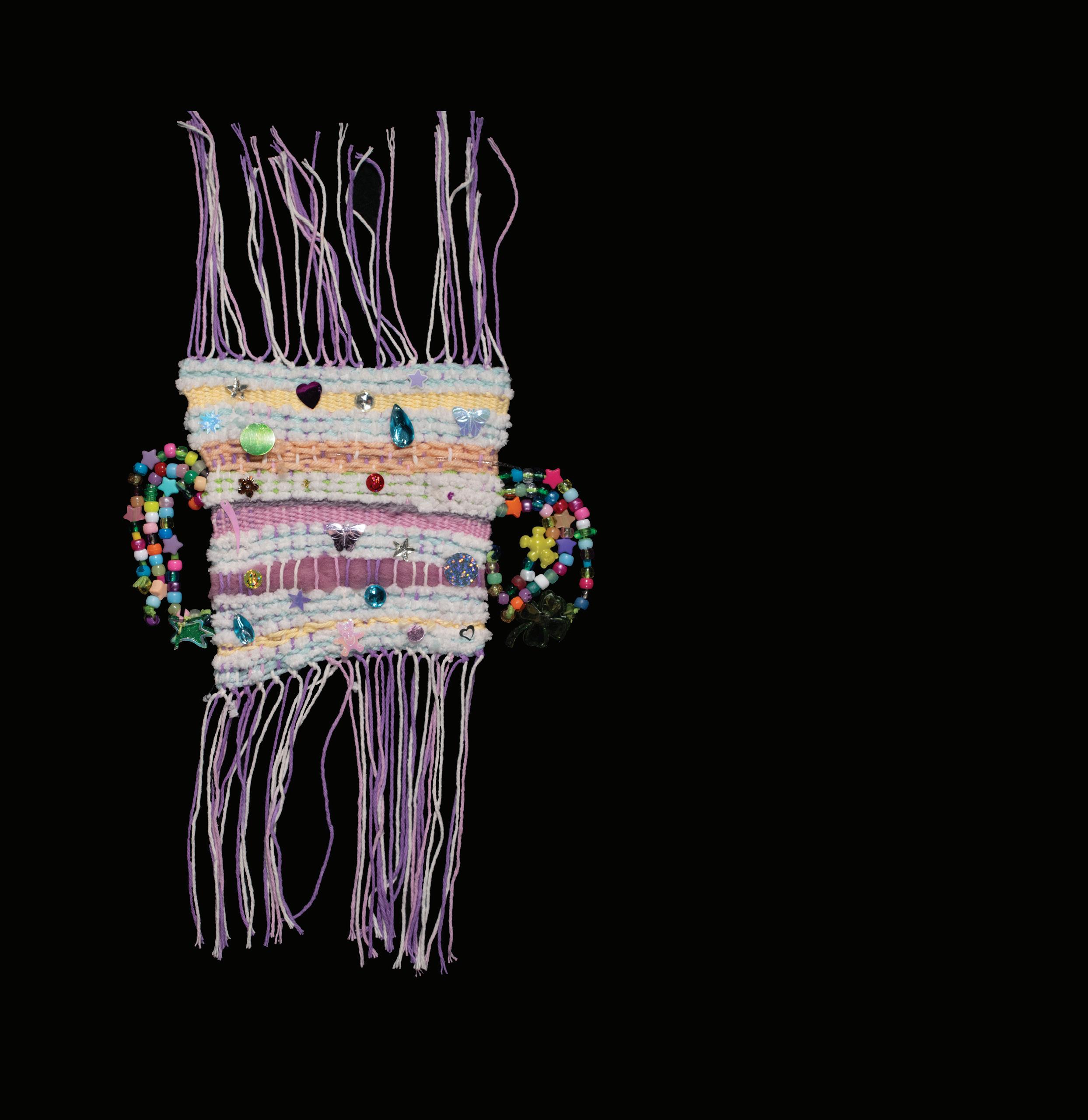
COLTON REVIEW 94
NOSTALGIA Emma Relota Weaving
DARLING, YOU FOOLED ME.
Cady Stanley
Honey drips like soldiers in slow motion
Until my whole body is coated.
My neck, my tits, my thighs Are plastered to my saturated clothes. Bugs strike me and stick—
They are dying too.
Matted hair from my slick Neck crawls into my mouth.
Gagging here in a golden river, I pray, Immortalize me in honeystone, Do not let your loved one see decay. You pushed me into this Styx alone
And watch me choke And choke.
COLTON REVIEW 95
"MY
MOTHER’S LOVER SPEAKS TO ME FROM HELL” AFTER SHARON OLDS
Anonymous
I wish I could say that I’m sorry, but I can’t.
Darling I know you knew— you’ve always known. You didn’t ignore it like your father; I admire that.
I love your Lake Norman eyes which nothing escapes. They hold secrets unknown drowned long ago.
I love your silence, your self-control, as you sat cross-legged on the couch— your pink pajama pants bunching up around your narrow hips— quietly while I brought banana pudding and brownies every Sunday night like clockwork.
I know you knew, darling.
I love your stillwater of the morning gaze that you cast on me in your living room as I laughed with your father, your mother’s husband. We were old friends.
I knew you knew and that scared me
You scare me and I love the threat you pose. I love your anger, boiling just beneath the surface, heat rising from the decaying corpse of secrets, my decaying corpse, sunk deep below, waterlogged and bloated.
COLTON REVIEW 96
You know, I half think you did it —and I know that’s not possible; you were miles away asleep in your bed— but I can’t hate you for it. Not like you hated me.
Was it the sheer force of your hate, a wave of your power, that knocked the ladder out from under me that night?
I thought of you as I crawled up the stairs and to the shower to wash away my sticky-warm sins spilling from my head.
I thought of your Lake Norman eyes as the water ran red. I thought you were drowning me.
Did you pray for this?
Tell me darling, is this my punishment? Is this my fate?
Tell your mother I love her, then sink me in the lake.
COLTON REVIEW 97
DOWNPOUR
Clary Taylor
most of what i’ve read about funerals starts with the speaker lamenting the sun having the audacity to shine “on a day like today”
i don’t have that gripe
i woke up to a flash flood warning and was late to the service because of the torrential downpour my heart leaping to my throat every time my car skid over the water the fear a paralyzing reminder that i am alive the context a crushing one that you are not
i wonder if you felt that fear towards the end or if the weight of your mortality felt more like a security blanket a heavy, heady calm after years of chemotherapeutic chaos pushing you down into oblivion back into the earth from whence we all came (or so your scriptures say) parallel to the water thudding down from the sky
i hope it was the latter but fear it was the first for every time that i have had the phrase “critical condition” directed towards me in a sterile room i have ripped out my fingernails clawing my way back to life and i worry that the curse of our commonalities is that you were just a little too much like me to find peace in the end.
DOWN POUR
COLTON REVIEW 98
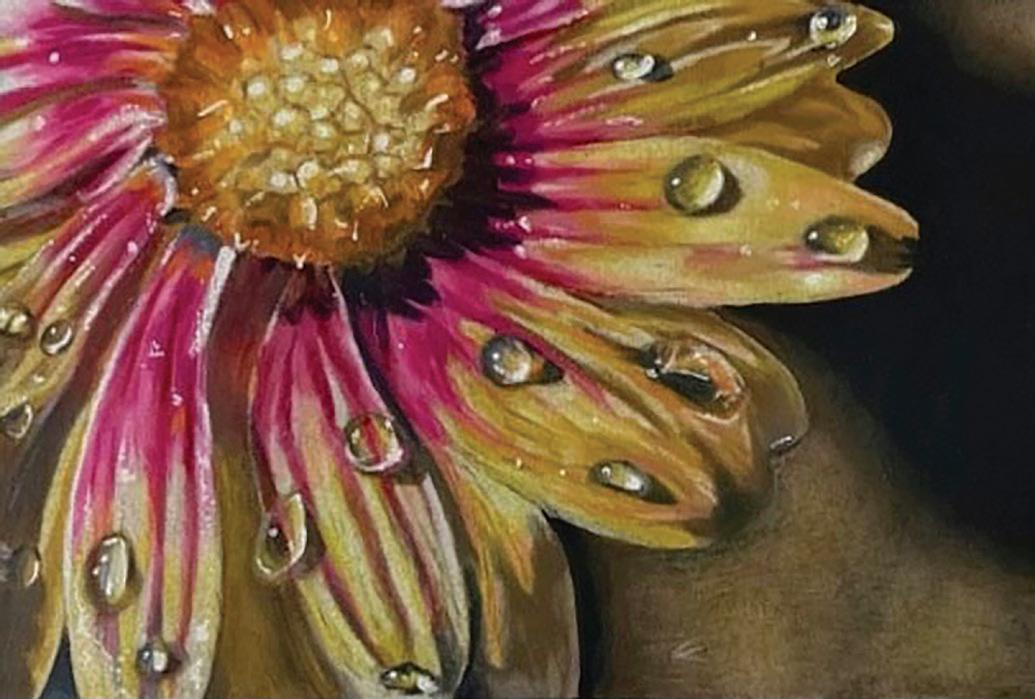
DOWN
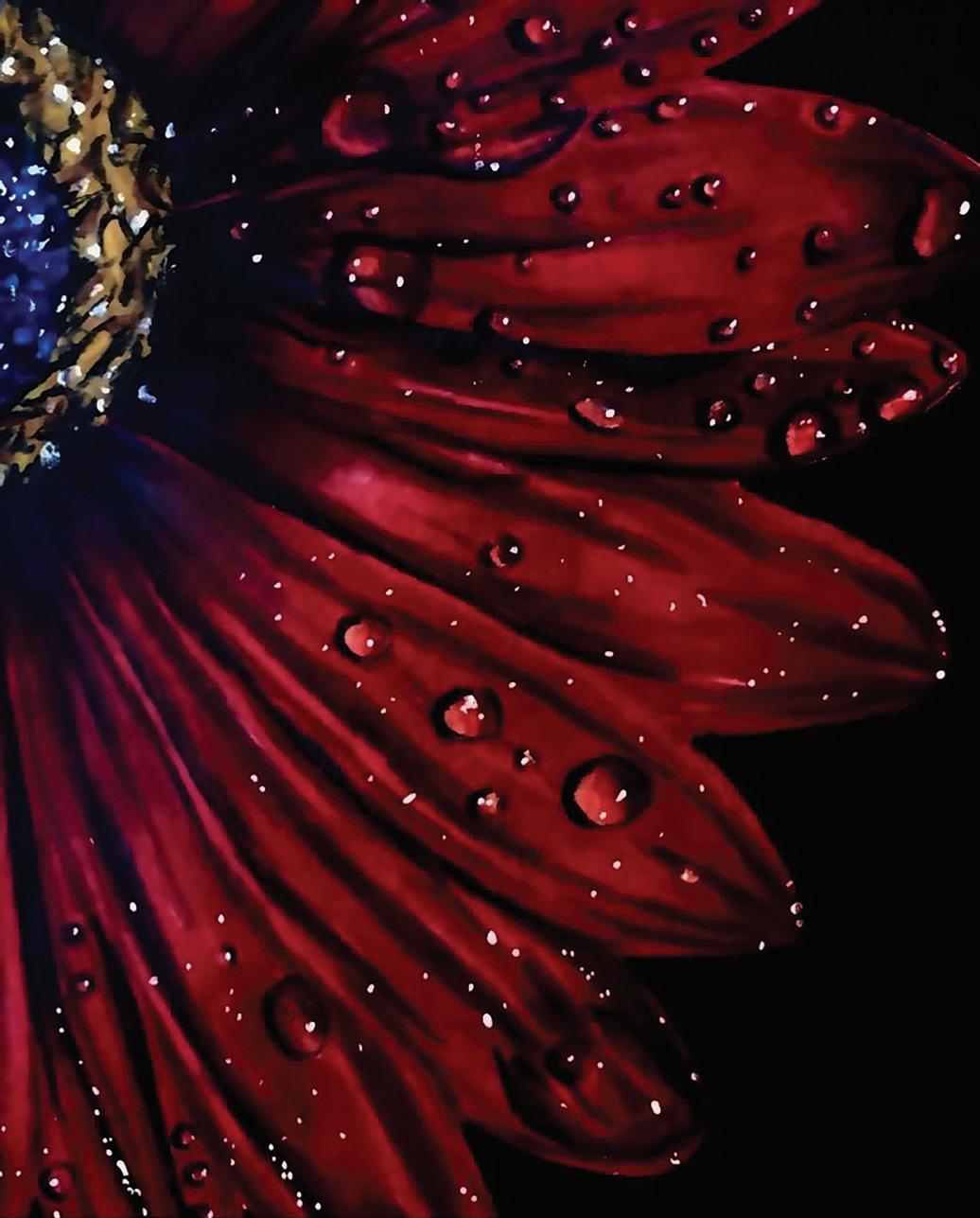

Best in Show
FLOWERS
Colored Pencil
Leen Abazid
Blushing Petals
Roses Are Purple
Misty Blooms
COLTON REVIEW 99
First Place in Prose
Clary Taylor
They never tell you that the injury is the least traumatic part.
The injury is easy. Waltz to the table with all the confidence of the surgeon who just reassured your mother that he could do this shit (“pardon my French, young lady”) in his sleep. Stuff your legs into compression stockings and joke with the girl labeled ‘MEDICAL STUDENT’ that it’s a fashion statement, “coming soon in Vogue!” Lay down and look around and when you feel the plastic mask pinch your cheeks inhale deeply. “Good girl,” they tell you, and it feels good, good like the rush of the white medicine they’re shoving into your veins seconds later. You cling to that description of yourself as the world fades into black. Wake up seconds hours later with a tube in your throat and your arms tied to the bed rails and no feeling in your legs and start to scream and scream and scream.
Easy.
They tell you so much in the next few days, a new white coat and tired face extrapolating what happened with a clinical harshness. “Seizure due to the meds” and “maybe it’s all in her head” and “unspecified injury to unspecified level” and “get another eval” and “we don’t know, we don’t know, we don’t know.”
You’ll relearn how to exist and spend months in the hospital and fight, fight, fight. People absolutely will not let you forget that it’s a fight. “You’re such a warrior!” they’ll insist with their pained grins and solemn eyes.
4.109A: unspecified injury to unspecified level of lu
And you’ll grin back, because what the fuck else can you do? You’re a good girl. They remind you constantly that you’re good, as if that’ll unkink your nerves and reset your lumbar vertebrae. “You didn’t deserve this.” Smile. “Just remember that I’m praying for you.” Gracious nod. “At least now you can do wheelchair races!” Choke out a laugh. Rinse and repeat, day in and day out, again and again and again and again and—
You’ll return to school. Get back to your life. Be labeled “LUCKY” an absolutely obnoxious number of times, like saying it just one more time will make it true. Sit there and take it ("take it like a good girl") while people who’ve never looked twice at you before ogle down at you and tell you it’s “so good to see you again!!” They didn’t know you existed before they scrounged up a photo to post with the GoFundMe link, but it’s good social clout to fuck with the crippled girl so now everybody is #[yourname] strong. You’ll shut up and smile through it. You’ll be good.
It’s so fucking patronizing. All of it is. The forced smiles and the Instagram tags and the constant baby talk. Being treated like damaged goods, like you’re something found in the Target $5 section.
S34.109A*
COLTON REVIEW 100
spinal cord, initial encounter
People looking to whoever you’re with in public to explain “what happened to that girl,” as though you lost your voice and not your legs. The job interviews you mysteriously never hear back from once they see you in person. The half of the world you’ll never see because it wasn’t built for people with broken bodies. The relationships you’ll lose because people can’t handle your body any better than you can. The difference, of course, is they can walk away. You were once told you’d never walk again.
You’ll get older. Escape the smalltown stares and the cracked sidewalks that make your wheelchair groan beneath you with every push. Pray to a G-d you stopped believing in years ago that this is it. This is when you’ll be taken seriously, when people will start treating you like an individual instead of like the sum of your broken parts. But no matter how far you move away, this isn’t something you’ll ever truly leave behind. You’ll find yourself back in that hospital room, sooner or later. It’s just a matter of time.
*S34.109A: unspecified injury t o u n s p ce ifie d level o f ul m b a r s pi nal cord , initial encounter
S34.109A: unspecified injury to unspecified level of lumbar spinal cord, initial encounter
*S34.109A: unspecified injury to unspecified level *
The trauma of the injury is treatable. Easy. It’s the life you’re left with that’s the hard part.
vel of
lumbar
COLTON REVIEW 101
ROT (AND REBIRTH)
Lucia Celetti
I often think about rot (more often than one should)
I think about wood, left forgotten in a storm, peeling and coming apart at the seams.
I think about the fruit in the back of my fridge, becoming soft and gray.
I think about me, rotting.
I think about letting the weight of the world that never seems to leave my shoulders hold me down.
I think about the familiar tight feeling in my ribcage and how it settles over me like a weighted blanket.
I think about staring at the show I’ve seen a million times or rereading the story I loved when I was thirteen.
I think about lying down on cold purple sheets and staying (just staying).
I think of time passing by me, seasons coming and going like flipping through the pages in a well-loved book.
I think of Spring and all that comes with it (I guess my birthday has passed).
I think of dandelions and clovers fighting their way up between my fingers like cracks in concrete.
I think of mushrooms finding a home on the sides of my thighs and forearms.
I think of lavender and rosemary finding purchase by my elbows and knees (they always were my favorite).
I think of moss and roses burrowing under my head and behind my ears.
I think of a tree just starting to sprout at my side (maybe a willow, I don’t know, it’s too young to tell).
I think of rain growing so heavy that it caves my ceiling in.
I think of my cat creating a bed out of the roots between my legs.
I think of staying (just staying).
I think about laying still as a forest grows around me (it feels much too heavy to move).
I think about dew drops falling from petals onto my cheeks like tears.
I think about vines and leaves covering me as I disintegrate.
I think about the willow tree becoming big and shadowy as time goes on without me.
I think about dirt rising around me (or maybe I’m sinking).
I think about my bones, shining ivory against dark brown.
I think about how warm it must be to be consumed.
But then, I think of getting up
I think of removing the dirt and roots like kicking off blankets
I think of my cat yawning and rubbing against my face
I think of smelling roses and lavender (they always were my favorite)
I think of the willow tree, green and beautiful, and the way the sunlight peeks between its curtains of leaves
I think of a warm shower that washes the dirt off my skin (this is much warmer than the ground)
I think of My Love cutting the roots from my hair
I think of My Love, whose kisses fall on my cheeks like dew drops
COLTON REVIEW 102
I think of My Mother, who asks if I’ve eaten and offers to bring me dinner
I think of blowing dandelion fluff in the meadow next to my bed
I think of drawing mushrooms in the margins of my notebooks
I think of the lavender tattooed next to my elbow
I think of putting roses behind my ear to match my outfit
I think of my friend’s arms wrapping around me like vines
I think of running in the rain and laughing
I think of staying (just staying)
I often think about rot, more often than one should (but my favorite thoughts are ones of rebirth)
favoritethoughts are ones of rebirth but m y f a v o r eti sthguoht era seno fo htriber tub m y favoritethoughts are ones ofrebirth bu t m y etirovaf sthguoht era seno fo htriber tub ym etirovaf guoht h t s a r e
ones of rebirth but myfavorite thoughts are
but my
COLTON REVIEW 103
ARCADIA
Jordan Johnson
Sometimes I wanna live in the ground
Under the dirt
Feel it under my nails
Sticking to skin
Down my throat
Clogging my lungs
To become one with the earth feels like sinking into home
Giving nutrients to plants
Helping trees grow thick and sturdy
Giving life to something new feels like one’s purpose
It feels like my purpose
I hope when I go in the ground
The plants and worms and bugs welcome me with open arms
COLTON REVIEW 104
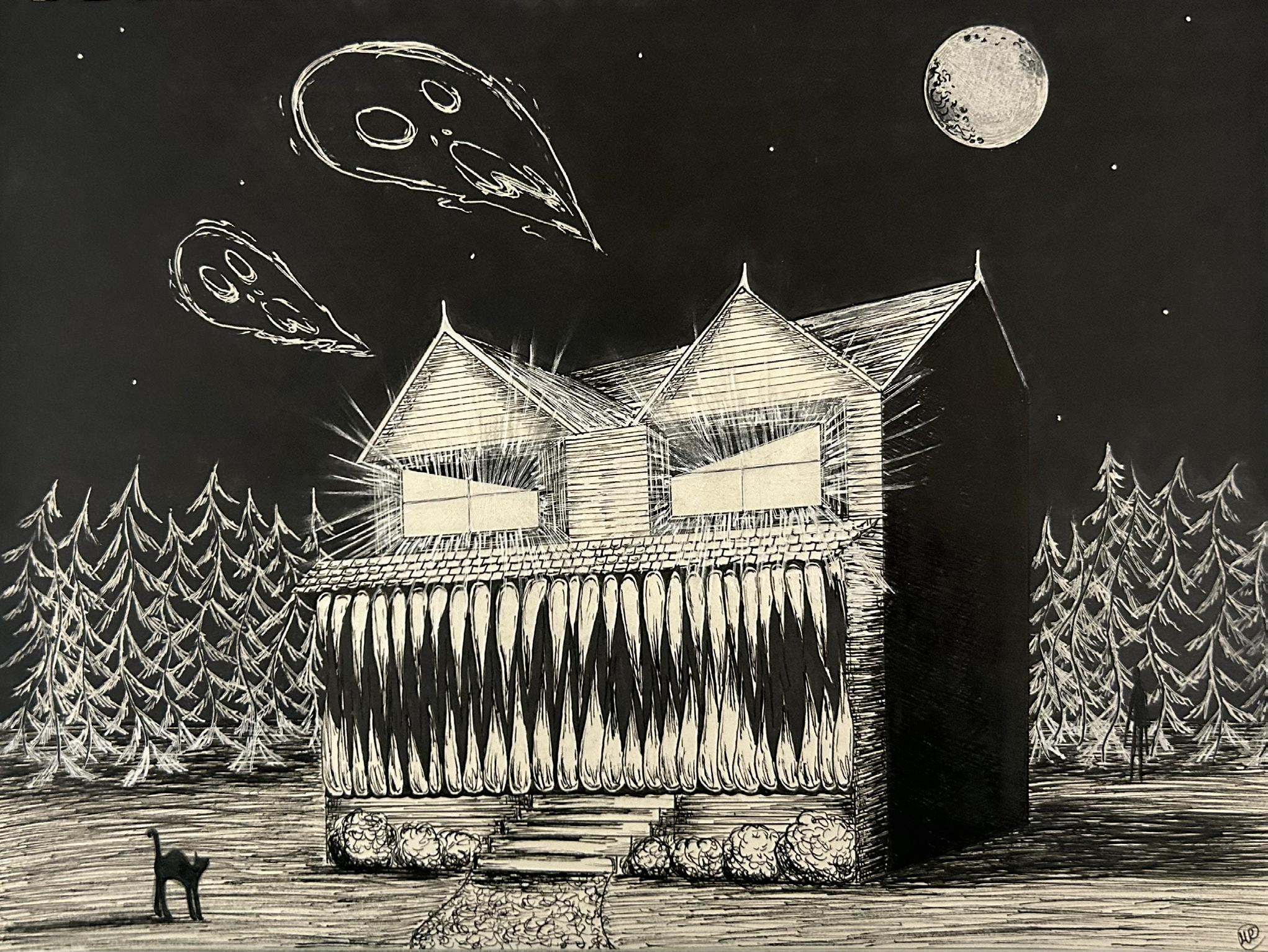
COLTON REVIEW 105
HAUNTED MANOR Maya Ryba Marker & Ink
PEACE
Kat Whetstone
softness under my skin onto a rough keyboard trying my best to get better.
away from the noise and the crowds of the surface of the universe ready to snap me in half. away from it all trying my best to get better.
nothing after me except my own memory. the screeching of the bird the mountains over the sky endlessly taller than i an array of green for miles and miles away from the rest of the world trying my best to get better.
pollen tickling the inside of my nose a tiny garden emphasizing the flags of this little world a quiet breeze matching my breathing inhaling and exhaling with me removing me from my personhood my stubborn individualism and turning me into a soul floating in the wind a valuable piece of the land away from everything else trying my best to get better.
peace is found in these moments away from what hurts a temporary band-aid away from the unspeakable realities navigating the hurricane in your heart trying your best to get better.
peace is found in the stillness of an empathetic nature at your direct eye level making sense of what you’ve seen understanding the miles of green are there not to be art but to serve as catharsis as your fingertips feel a goodness of healing trying your best to get better.
COLTON REVIEW 106
PEACE PEACE PEACE PEACE
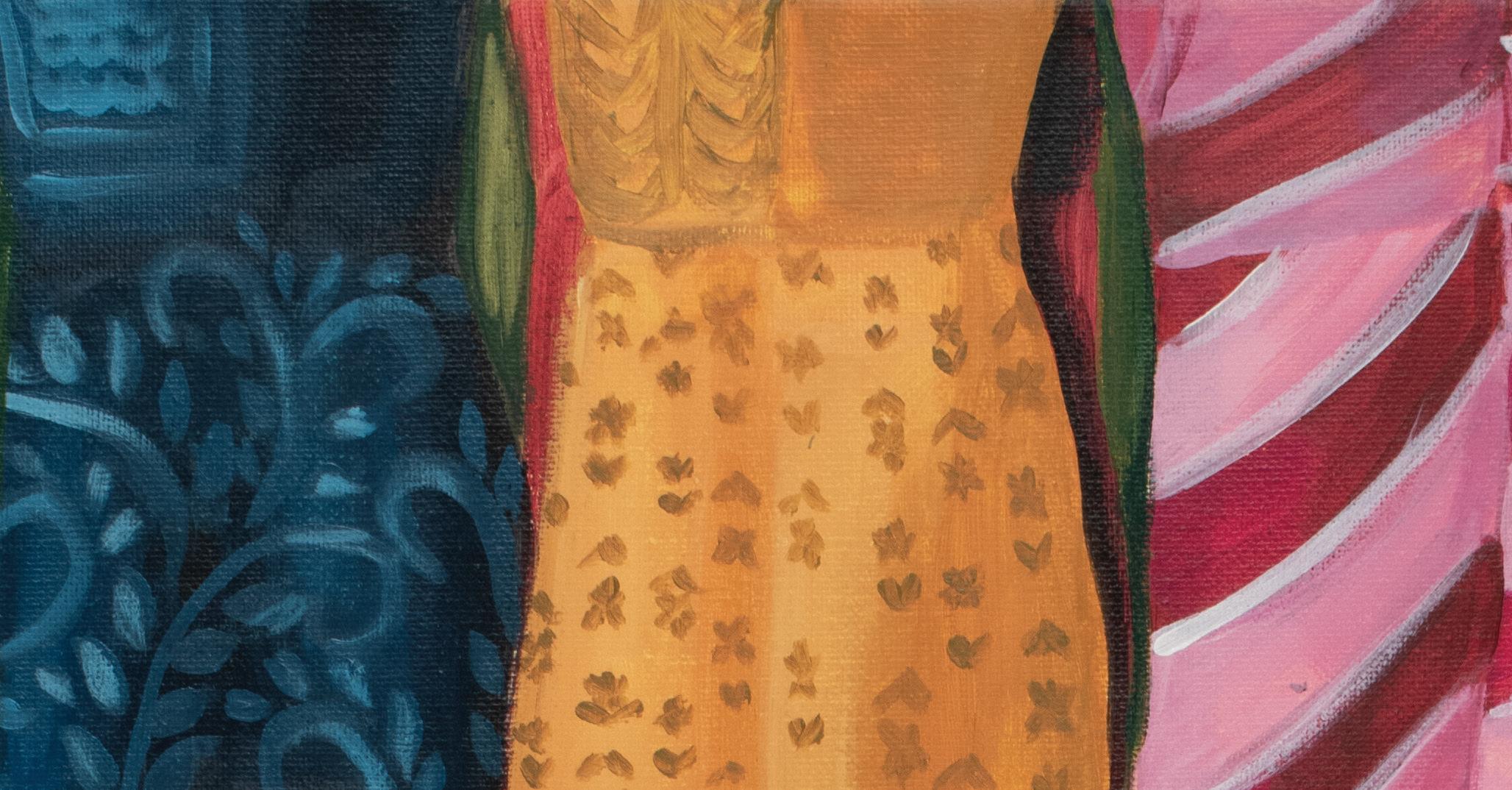
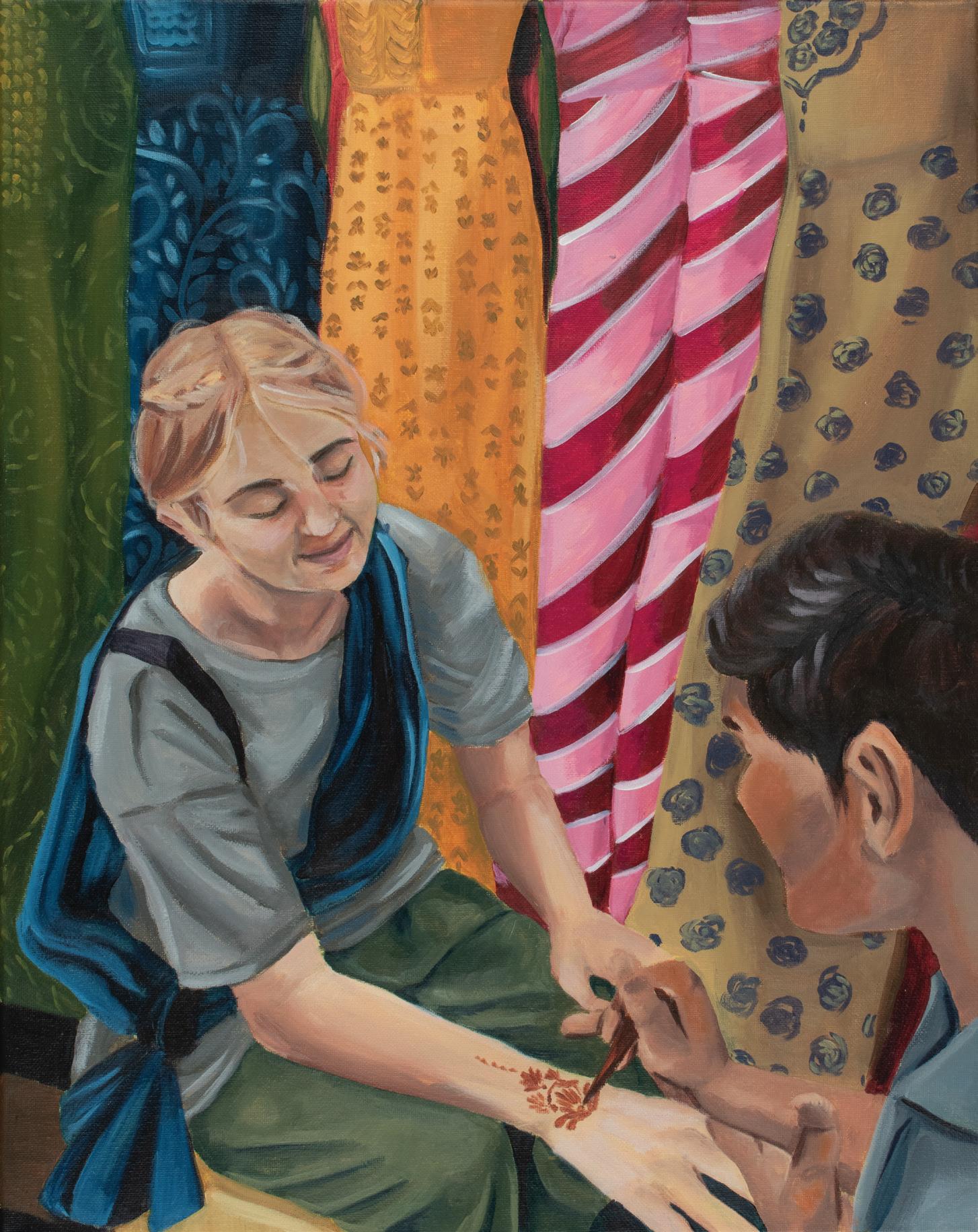
VISUAL
COLTON REVIEW 107
DIARY SERIES V Karlie Mullis Acrylic
PROSE AWARDS
Heather Frese, Literary Judge
Heather Frese’s debut novel, The Baddest Girl on the Planet, won the Lee Smith Novel Prize. Her second novel, The Saddest Girl on the Beach, releases in April of 2024. Her work has been published widely, earning notable mention in the Pushcart Prize Anthology and Best American Essays. She received her master’s degree from Ohio University and her M.F.A. from West Virginia University.
First Place
S34.109A* Clary Taylor
In “S34.109A*”, a title that is medical code for unspecified injury to the lumbar spinal cord, the narrator’s voice crackles with sparks of energy. They never tell you that the injury is the least traumatic part, the narrator begins, pulling the reader into the story with an impressively compelling force. We follow her into spinal surgery and its aftermath, replete with medical gaslighting, a GoFundMe, and well-meaning but condescending reactions from her community. The brevity of this piece lends to its impact—there are no lengthy scenes or long descriptions. The compression is reminiscent of a “typical” life cut short as the narrator now navigates the bumpy and often hostile world using a wheelchair. The narrator moves from pride in being a “good girl” to anger about her situation, all while commenting on the expectations placed on women to be “good.” This is no Hallmark movie where the angelic disabled person is lucky, thankful, blessed, and inspirational, but rather carries a complex human reaction to ongoing trauma, including the struggle to be seen as a full person. The narrative voice is exceptional in this piece, inviting the reader to share in its motion and drive.
COLTON REVIEW 108
Second Place
Homecoming Tamara Bomparte
“Homecoming” is a short story of family misunderstanding and reconnection. With evocative descriptions and fully rounded characters, this story envelops the reader in a summer day-turned-evening with a pair of sisters sorting out their father’s belongings and their feelings toward him and one another. With sentences like, Pinpoints of light zig and zag a few feet ahead of us, and the sounds of crickets, cicadas, and frogs fill the air. The purple sky casts a cozy glow over the night, so at odds with the turmoil between us, the story uses vivid sensory description of the house and the outdoors to set the tone of the sisters’ disconnect. As they process through their different childhood experiences, each sister reaches a turning point, allowing them to reconnect with one another. And we walk through the neighborhood, the author writes, still ours though we’ve grown so far beyond it, picking wildflowers and kicking rocks until the fireflies beckon us home.
Honorable Mention
Yes, I'm a Vampire Working at Wal-Mart, Will That Be Cash or Credit? Rowan Elwood
When Ginger, head of Wal-Mart’s Vampire-Led Associates Division (VLAD), hires newcomer Kevin to work the night shift (a natural fit for vampires), it seems like an apt choice until the store’s stock of religious relics and (bloody) steaks both find themselves in jeopardy.
In “Yes, I’m a Vampire Working at Wal-Mart, Will That Be Cash or Credit?,” the author offers up a delightful skewering of corporate culture. The pointed fangs of capitalism extend their way into the workload of the undead, as Ginger points out that most new vampires don’t descend from generational wealth and are not without a moral compass, so choose to work rather than attain wealth in an undesirable manner. This story is brief, charming, and functions as both comedy and social commentary.
COLTON REVIEW 109
POETRY AWARDS
Suzanne Britt, Literary Judge
Suzanne Britt graduated from Salem College and earned her master’s degree from Washington University in St. Louis. She taught English at Meredith for 27 years. Her writing has been published in many newspapers and magazines. She currently writes poems and essays on Substack, at Suzanne Britt at Slices of Life.
First Place
Watermelon Slice Duah Abdrahman page 9
The poem is short and sharp, witty. The watermelon - the uncertainty of its taste, the risk of its color, the proprietary tone of the one who holds the power over seeds, and the speaker’s plaintive questions: Will you love me with my seeds, the black ones that fill the creases of my void? Will your mouth water for me before I’m ripe. And the beautifully ironic tone of the final question to the one who is all powerful: Will you at least knock? The poet co-opts the watermelon of her belly, her seeds, her tenuous relation to power, and survives at the whim and desire of the possessor of decision and control. The black seeds, the tiresome stereotype of black people eating watermelon, the querulous questions of the belly.
Second Place
the shoulders of women Kat Whetstone page 80
Again, a deft and powerful handling of women's history and future. Though clearly political in its intent, the poet spares the reader from tiresome didacticism by bringing in the “little” girl and her “crooked” voice, asking the one question that matters:
she asks if i have ever felt the way she does in this moment
i have and i say that i stand for her
COLTON REVIEW 110
Honorable Mention
Song of Summer
Lauren Shaw page 10
This poem is indeed a song, joyful and breezy rendering of a summer day with a pal (lover?). The poem is never sentimental, does not preach joy. Rather it is joy. The two bike to the dunes, the “Firewheel” all around. And later, at the end of the day, “And I wish I could carry you in my bicycle basket,/ a gentle ride home under the shining, pin-pricked sky.” And then the two indoors, hearing “the cicadas humming outside the window.”
With vivid detail and endless movement of wind, dunes, bicycles, “the dark rolling night,” the speaker takes the reader to childhood joy, burgeoning sensibilities of the speaker: “Now I feel your breath on my neck,/ soft and warm, my peace/ against the cotton.” This poem is the very embodiment of summer at its most lyrical: “Your breathing out / is my breathing in.”
COLTON REVIEW 111
ART AWARDS
Dana Ezzell Lovelace, Art Judge
Dana Ezzell Lovelace has been a Professor of Graphic Design at Meredith College since 2007. In addition to teaching full-time, she serves as Art Director and primary graphic designer for the North Carolina Literary Review (NCLR) and also works as a freelance designer. Her design work has been recognized by the CASE Awards and in such publications as Print Magazine’s Regional Design Annual, the Applied Arts Awards Annual, American Corporate Identity, and the Big Book of Logos 4. Prior to teaching at Meredith College, she taught at Auburn University in Auburn, AL.
Best in Show
Flowers Leen Abazid page 99
Although colored pencil may be considered a somewhat difficult medium to control, the artist’s technique and skill are a beautiful testament to photorealism. These works are dynamic and powerful. Each layer reveals the artist’s ability to control the blending of colors to create a rich image of complexity and depth. The shadows and highlights move across the surface of the compositions, revealing the natural form and shape of these organic objects. I was immediately captivated by the artist’s ability to see the world through the lens of realism and to capture the exquisite nature of these petals.
COLTON REVIEW 112
First Place
Lovely Pastiche Snippet Debra Lee Laube page 2
Embroidery is defined as the art of working raised and ornamental designs in threads of silk, cotton, gold, silver, or other material upon any woven fabric, leather, paper, etc., with a needle (dictionary.com). The artist’s work exemplifies the hand of a master at her craft. The combinations of texture and color dance across the surface, telling a story with each beautiful thread. Thank you for sharing your fervor for this medium and for revealing your ability to express yourself with a tenderness and care that is obvious with every stitch.
Honorable Mention
Vessels Mae VanFleet page 7
There is an exchange of forces between the art and the viewer when engaging with this work. The work embodies order and intention, yet also imperfection. I define imperfection not as an undesirable effect but as beauty. The qualities of the surface texture exude an emotion and energy that remain open to interpretation by the viewer. And as viewers, we are invited to engage with the beauty and tactile world of this piece.
COLTON REVIEW 113
LITERARY
Tamara Bomparte, Co-editor
Constance Wesley, Co-editor
Lauren Shaw, Prose Editor
Jessica Chapman, Poetry Editor
Katie Avants, Social Media Manager
Laura Wood, Social Media Manager
Joceline Bermudez, Engagement Manager
Karlie Mullis, Archivist
Cady Stanley, Writer-editor
Margaret Devitt, Writer-editor
Noelle Pearce, Writer-editor
Lauren Dixon, Writer-editor
Carly Casas, Writer-editor
Charlotte Thomas, Writer-editor
Mae Lowther, Writer-editor
Lilly Koonce, Writer-editor
Ashley Hogan, Faculty Literature Advisor
Director of Creative Writing and Assistant Professor, Department of English
ART
Layla Davenport, Art Director
Naomi Adkins, Graphic Designer
Josefina Puello, Graphic Designer
Dana Ezzell Lovelace, Faculty Design Advisor
Professor of Graphic Design, Department of Art
PRODUCTION NOTES
Printer
Printivity
Copies
500
Type Families
Anisette Std
Input Sans
COLTON REVIEW 114




 NATURAL CONNECTION
NATURAL CONNECTION



































 FOLIAGE
FOLIAGE






